

Average Weight Of A Travel Trailer (With 35 Examples)
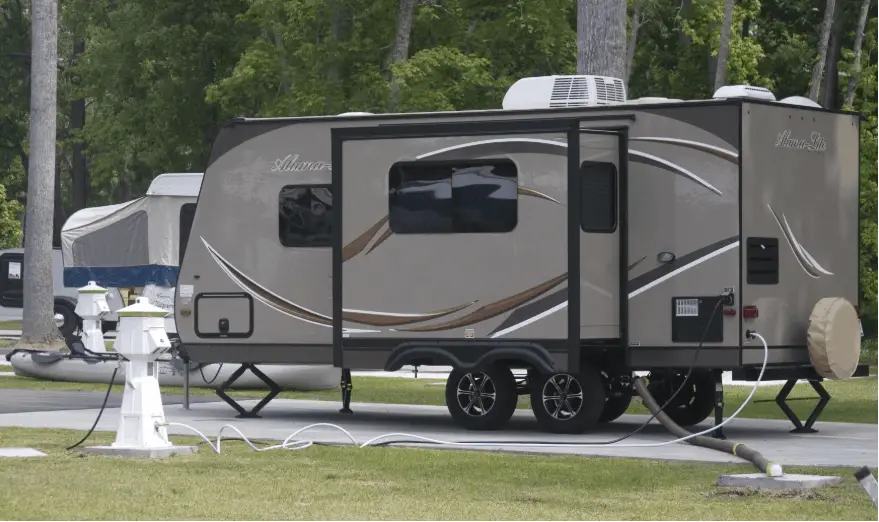
- BEGINNERS GUIDE
G. Yoganand
Travel trailer weight is a significant parameter if you are about to buy either a new or used one. So, how much do travel trailers weigh normally? This is an important thing to know if you want to know all options for your car or truck.
The weight of trailer camper is generally mentioned by the manufacturer, but they also mention many other ratings which should not be overlooked.
A trailer weight is not only the weight it carries when build, but will also include all other things you pack in.
Their weight depends on length, and many other factors. Lets see some examples and draw conclusion on the weights of travel trailers or campers.
How much do travel trailer weigh on an average
Many people buy travel trailer due to their cost and size. A travel trailer is very popular option in rv’s. One question that many people often have is how much do the travel trailers weigh.
Travel trailer weight varies widely and on an average it is between 1000 lbs to 8800 lbs.
Most of the popular travel trailer have lengths between 15 feet to 35 feet.
Comparing several travel trailers and their wights below is the average weight of travel trailer for different lengths.
The weight of travel trailer depends on the size or length. When understating the weight parameters in pounds there are multiple thing that you should understand rather then just going by the weight called out by the dealer in manual.
In this post, we will see average weight of travel trailers and various other terminologies related to travel trailer weight.
Understanding the weigh of a travel trailer is important because you are supposed to pull it using a car or suv.
A car will have certain limit and if your trailer exceeds that limit then that could be a problem. Towing a trailer initially can be tough but following the tips that i gave in my previous article can make it super easy, do check it out.
When you head out for camping, you end up packing lots of things and with a full gas tank plus a full water tank, will mean lots of weight. Thus, it becomes more important that you have fair idea of where the weight is heading. Apart from understanding the dry weight of travel trailer, get a fair idea of other weights related to it.
In case, you want to know how to find dry weight , do check linked detailed guide.
A hitch should also be good enough to handle the overall weight. Also, with a rv, you are supposed to follow certain rules related to weight. Once you cross certain weight limit even the drivers license requirement change in some states.
Read : 17 Tips to reduce RV Weight
One thing many people try to check is if they can find smaller travel trailer that have less weight. A smaller less weight travel trailer lets you pull it easily.
We will also see how travel trailer weight varies by length. Once you have that idea, it can be helpful to determine the approximate weight based on length.
Travel trailer weight variation on the basis of length
Main reason why people want to know about the weight of their travel trailer is to determine if their car or truck can tow the trailer or not. A travel trailer has length that ranges from 17 feet to 40 feet.
More the length, more is the weight of travel trailer. A 15-18 feet travel trailer will obviously weigh less than a 30 feet one. That is to say, we can almost say that weight of the travel trailer is proportional to its length. This however, may not be always be correct as with new models, construction type material the weight is varies.
New year models released and built are less heavy and thus, we can also say weight is inversely proportional to year make of the travel trailer. On an average a 16 feet length travel trailer will have a unloaded weight of around 2200 lbs to around 3400 lbs. A 30 feet travel trailer can weigh around 7000 lbs to 7800 lbs.
This may however, be not true for all makes and brands, it will always vary. But, on an average you will find the numbers to be very close. A 20 feet travel trailer can be as heavy as 2700 lbs to 2900 lbs. With advances in the way travel trailers are manufactured, you will also find a 15 feet travel trailer weighing just above 1500 lbs unloaded or even an 13 feet long travel trailer weighing below 1200 pounds.
Travel trailer are smaller rv’s, they sleep 2-3 people at times and can also be lengthy about 40 feet long. A travel trailer weight also depends on the floor plan, kind of dinner built in, position of the bath, kitchen positioning, entry exit doors, window positioning, bed style (this things require changes, adjustments then lead to weight variations).
How much do small travel trailers weigh
Lets see some examples of travel trailers along with their weight and length. This should give a fair idea of relation between length and weight of a travel trailer. These are some of the smaller travel trailer that are popular under the weight of 4000 pounds.
- Forest River Flagstaff E-Pro 12RK – 11 feet long and weighs around 1150 lbs
- ALiner Ascape camp travel trailer – 13 feet long and weighs around 1495 lbs
- Forest River Flagstaff E-Pro 14FK – 14 feet long and weighs around 2010 lbs
- ALiner Ascape plus travel trailer – 13 feet long and weighs around 1150 lbs
- KZ Sportsmen Classic 130RB travel trailer – 15 feet long and weighs around 2126 lbs
- ALiner Ascape MT travel trailer – 13 feet long and weighs around 1170 lbs
- ALiner Ascape ST travel trailer – 13 feet long and weighs around 1575 lbs
- Forest River Flagstaff E-Pro 16BH – 18 feet long and weighs around 2870 lbs
- KZ Sportsmen Classic 150BH travel trailer – 17 feet long and weighs around 2260 lbs
- Forest River Flagstaff E-Pro 17PR – 20 feet long and weighs around 3160 lbs
- KZ Sportsmen Classic 151RB travel trailer – 18 feet long and weighs around 2530 lbs
- Forest River Flagstaff E-Pro 17RK – 20 feet long and weighs around 2930 lbs
- KZ Sportsmen Classic 180BH travel trailer – 20 feet long and weighs around 2620 lbs
- Forest River Flagstaff E-Pro 19FBS – 20 feet long and weighs around 2960 lbs
- Jayco Hummingbird 16FD travel trailer – 18 feet long and weighs around 2535 lbs
- KZ Sportsmen Classic 160QB travel trailer – 22 feet long and weighs around 2740 lbs
- Jayco Hummingbird 16MRB travel trailer – 19 feet long and weighs around 2780 lbs
- Forest River Flagstaff E-Pro 19FD – 20 feet long and weighs around 2825 lbs
- Jayco Hummingbird 17BH travel trailer – 19 feet long and weighs around 3015 lbs
We can determine a fair idea of weight based on travel trailer length. But that may not be always true. A length cannot be the ultimate decider to figure out the exact weight of a travel trailer, as seen from examples a 20 feet long travel trailer (of not only different make, but even same brand) weighs differently. Thus, it also depends on the floor plan, amenities and many other things packaged in the trailer.
How much do longer travel trailers Weigh
As we already saw a longer travel trailer will weigh much more and it is almost proportional to its length. A 40 feet travel trailer will have enough weight to make you think if the car you have, is good enough to pull it or not.
Even a 25 feet or 30 feet long travel trailer is much heavier and you need to be sure about the capacity of your pulling car. Lets see some of the examples to understand better and draw some conclusion on length-weight relation for heavier travel trailers.
Examples here in are also some of the best travel trailers you could buy in the range of 28 feet and 30 feet with weights under 5000 pounds and so on. While some are quoted just to see how the best and average travel trailers weigh in different segments of lengths.
- Keystone RV Passport 175BH Express travel trailer – 22 feet long and weighs around 3250 lbs
- Keystone RV Passport 195RB Express travel trailer – 23 feet long and weighs around 3805 lbs
- Forest River RV Flagstaff Classic Super Lite 831CLBSS travel trailer – 35 feet long and weighs around 8105 lbs
- Forest River RV Flagstaff Classic Super Lite 832FLBS travel trailer – 35 feet long and weighs around 8621 lbs
- Keystone RV Passport 195RBWE Express travel trailer – 23 feet long and weighs around 3812 lbs
- Keystone RV Passport 2200RBWE Grand travel trailer – 25 feet long and weighs around 3805 lbs
- Forest River RV Flagstaff Classic Super Lite 831BHDS travel trailer – 34 feet long and weighs around 7970 lbs
- Forest River RV Flagstaff Classic Super Lite 31BHWSS travel trailer – 34 feet long and weighs around 8386 lbs
- Keystone RV Passport 234QBWE Express travel trailer – 25 feet long and weighs around 3870 lbs
- Keystone RV Passport 239ML Express travel trailer – 25 feet long and weighs around 4140 lbs
- Prime Time RV LaCrosse 2911RB travel trailer – 31 feet long and weighs around 6516 lbs
- Prime Time RV LaCrosse 318BHS travel trailer – 36 feet long and weighs around 8022 lbs
- Keystone RV Passport 2400BH Grand Touring travel trailer – 28 feet long and weighs around 4840 lbs
- Keystone RV Passport 2670BH Grand Touring travel trailer – 30 feet long and weighs around 5344 lbs
- Prime Time RV LaCrosse 324RST travel trailer – 37 feet long and weighs around 8334 lbs
- Prime Time RV LaCrosse 329BHT travel trailer – 37 feet long and weighs around 8815 lbs
From the examples we could see that a 26 feet long travel trailer on an average weighs around 3800 lbs to 4150 lbs . A 28 feet long travel trailer weighs in the range of 4300 lbs – 4900 lbs. A travel trailer between the length of 32 feet to 38 feet weighs 7200 lbs – 8500 lbs .
This should be enough to paint a fair idea of how a length of travel trailer is related to its weight. But, the weights are unloaded weights and should not be confused with the overall weight of travel trailers
Understanding the travel trailer weight terminology
A travel trailer weight or weight of any other rv need to be understood correctly. The numbers that you get from the manufacturer or dealer could be misleading and misunderstood.
The weight details of various sized travel trailers that we saw are the unloaded weights. You basically need to do the math properly to see if the travel trailer weight is within limits for your car to pull.
Weight understanding in case of travel trailer is much more important than motorhomes which drives themselves (which is not the case for travel trailer or fifth wheel or pop up campers or any other towable trailers). Its important you understand the rv weight terminology .
A rating provided by manufacturer cannot be changed. Normally weight and load are same when you talk weight of rv’s. Basically, a weight of rv puts load on rv tires, axles and hitches.
This load is used to calculate various rating like GAWR (gross axle weight Rating), GCWR (gross combination weight Rating), GVWR (gross vehicle weight Rating). Lets, try to understand what exactly these things mean and how you should interpret values for these.
Gross Axle Weight Rating (GAWR) – This rating basically is the maximum load that the axle of the trailer can support. Trailer manufacturer provides this rating and it basically depends on axle, tire, wheels and the rating is based on the weakest link.
Unloaded Vehicle Weight (UVW) – This is the weight of the RV or travel trailer when it is fully unloaded without any extra things on it. Usually the weight that you see when it is at the dealer and not yet sold.
The weights that we saw above were unloaded weights. Most times people are confused with this weight, and assume the unloaded weight as the final towing weight. But, in reality the weight increases when you actually pull the trailer with all the things packed in.
Gross Vehicle Weight Rating (GVWR) – This rating means the maximum weight that is allowed on the RV including all the things like the passengers, driver, water, fuel. The trailer and the towing vehicle will both have their own GVWR.
Gross combination Weight rating (GCWR) – Unlike GVWR, the GCWR is the combination rating for both the trailer and the towing vehicle. It gives the maximum combined limit for the tow vehicle and the travel trailer.
Cargo carrying capacity (CCCC) – This basically means the weight of the trailer without the optional accessories, equipment in the trailer.
Net carrying capacity (NCC) – This is the weight of all own or personal things included on the trailer or rv. For example, the combined weight of fuel, water, food, gas, equipment tools etc
Sleeping Capacity weight rating (SCWR) – This basically gives the maximum weight limit depending on the number of sleeping positions designated by manufacturer. Each included person is assumed to be around 154 lbs and thus, a 2 sleeping travel trailer will mean its SCWR will be 208 lbs and so on.
Importance of Weight distribution in travel trailer
In case of travel trailer, the weight distribution is significant. An un-even weight distributed can be dangerous and the towing hitch and the trailer can be impacted.
You need to make sure the overall weight is properly distributed. The idea is to make sure weight is properly distributed along all sides, front to back and from both right and left sides.
Rv’s and travel trailer are originally designed with proper weight distribution, and when you tow the travel trailer you need to follow same when putting in more weight through other things.
The weight of both the tow vehicle and travel trailer should be properly distributed. Technically speaking, you also need to make sure the Gross Vehicle weight Rating and gross combined vehicle weight rating is not crossed at any time.
To understand the proper rules of weight distribution, you can read the manufacturer provided manual for your travel trailer or camper.
In most cases, the idea is to keep 60% of the weight ahead of the center of gravity of the travel trailer. To understand the correct weights of your travel trailer, its better to weigh it after it is fully loaded with all stuff.
An uneven distributed weight is notable with naked eyes, but may not always be visible hence its better to keep the weight within limits and properly distributed.
One can also use weight distribution systems to make it properly distributed. Weight distribution systems work using spring bars which correct uneven weight distribution.
What affects Weight of travel trailer – which things put on extra weight
Lets try to understand how the weight of the travel trailer is affected. What all things put on that weight.? An unloaded weight will be less but when you head out finally, the weight of the overall travel trailer could go out of limits and that’s what we should try to limit.
Water – Camping need lots of water. And water adds weight to your travel trailer ? yes, do not underestimate the power of water weight. It weighs almost 8 lbs per gallon. A 50 gallon water in a travel trailer will mean you already have put on 400 lbs extra on travel trailer.
Generator – A generator is a necessary thing in you rv. You get portable generators that weigh less but even then, they can be best weighted at 300-400 lbs and that is much to add to the limited capacity travel trailer.
More watts will generally mean more weight for the generator. Thus, getting the right size generator can be a wise thing to do. But, it may not be a simple calculation for many of us and that’s why i wrote this detail guide on how to choose the right size generator for your RV (You AC is mostly the deciding factor, check out how!)
Construction material affects weight – A travel trailer construction material type is also responsible for its weight. A fiberglass made trailer generally weigh less as compared to aluminum ones.
This however, should not be your problem as this will be included in the unloaded weight which is not in your hands anyways. But, understanding the material type of your travel trailer can be helpful as choosing the right one will mean your travel trailers unloaded weight itself is less.
Slide outs Increase weight – A slide out for your rv increases the overall weight. Its extra space but extra weight too. A slide out normally adds upto 1000 lbs on an average. Pop up are less heavy and that can be a good option as compared to slide outs if you are looking to reduce the overall weight on your travel trailer.
Read : Weight Holding capacity of Slide Out in RV
How to reduce weight on your travel trailer – tips to stay light
Weighing your rv often is the best thing you could do (in case you are confused on how to weigh your rv, here is a article that i posted about it). Regularly checking the weight helps to plan and you will stay within the rating limits. Lets see some of the things you could follow to reduce the weight and stay in limits
1. Get rid of extra things on your rv. Extra tools, extra equipment, unused personal belongings like shoes, clothes, books etc. Unused kitchen items, bedroom, bathroom accessories you don’t use more often should be kept out. All smaller things add up to put on those pounds which add-on to become a big number.
2. Weigh the travel trailer separately with car and without car. This gives great picture of what is happening and where the weight is distributed.
3. Get good weight distribution system to make sure weight is properly distributed.
4. While heading out for camping make sure you pack things which are absolutely needed and do not pack out of limits
5. Have only number of people allowed as per manufacturer manual. A human weight of around 150 lbs can be more than enough to cause the imbalance of weight distribution
6. Make sure tires are properly inflated. Maintain correct tire pressure for both travel trailer and car at all times.
7. Use aluminum in case you want to do any repairs or modifications to your travel trailer. Aluminium is light weight and thus will not put on extra weight on your travel trailer. Many times, people do patch work like filling in holes, cracks or structural changes to the travel trailer. All these smaller things should be done with materials that are less in weight and should not add on weights.
8. Get rid of things that are not in use for months or have become old. A ladder that you hardly need, an awning that is broken or things like kayak that you occasionally need. Remove things that you don’t use often or things of past that need replacement, just go ahead and replace them. This will not only save space but also reduce the unnecessary weight.
9. Get the sliding doors replaced with curtains. Doors that aren’t used for privacy and are in place just, can be removed and replaced with curtains or any other such fabrics used instead of heavy doors.
10. Replace old heavy things with new lightweight ones. Drawers, bins, shelving that are heavy and old, could be putting in weight unnecessarily and you should try and get things that are new and less in weight. You will find lots of innovative products specially designed for RV that are compact and lightweight.
Travel trailer weight comparison with Other Rv’s (Class C RV and class A RV)
A mini motorhome or a class C rv on an average weighs around 10,000 lbs to 14,000 lbs. That is almost double than an average weight of a travel trailer.
Class C motorhome are also longer than travel trailers, they tend to be around 18 feet – 30 feet long. Class A motorhomes on the other hand are the heaviest ones, they weigh much more.
On an average class A rv’s weighs anything between 15,000 lbs to 30,000 lbs. They are really heavy, and much more than a travel trailer. With so much weight they tend to intimidate you on road. Remember, with weight also the license requirement changes.
Read : How much weight RVs roof are capable to support
There is limit on weight up-to which you can drive using normal non commercial license but if the weight goes beyond certain limit then you need special license.
The rule of weight is different for all states. Like in California, a weight more than 26,000 lbs for a non towable RV will need a class B Non commercial license. Most states have similar requirement but could be little different for some states (need to check with each states rules and regulations).
A travel trailer to be towed has a weight limitation of around 10,000 lbs in most states and beyond that you will need class B Non commercial license. Looking at these numbers of pound for travel trailer, most of the times you will be okay with the normal license unless you have that very big trailer weighing more than 10,000 lbs.
If you are ready to tow your travel trailer and start the RV adventure then do start by getting all the essentials for your trailer (this is a complete list that you will need)
A travel trailer weight measurement is of much importance since it has the power to affect many other things in the camper trailer.
Apart from getting to know just the unloaded weight of the trailer, knowing all the other ratings help in towing car-trailer system smooth. A travel trailer weighs less as compared to other bigger rv’s however it is more important to know the weight in case of travel trailers. A travel trailer weight unloaded should not be your only way of judging the capacity of your car to tow.
Understanding overall weight when fully loaded and with full water/fuel tanks is more necessary. Going through manufacturer manual, weighing your trailer often are best practices to follow.
Keeping the travel trailer as light as possible can come good for your towing car or suv. Keeping the weight distribution proper is also important and proper hitches or distribution system can come handy. One should fully understand the towing capacity of the car and then manage the weight on travel trailer. Owning a very heavy trailer also needs special license requirements and thus better to make sure the weight is within limits.
You Might Also Like
22 organizing tips for small travel trailers (make 2800 words).

18 Tips to make RV feel like home

How long does a travel trailer last

Where can I Rent a Truck to Pull a Fifth Wheel ?

How Much Do Travel Trailers Weigh? (Camper Weight Chart)
If you’re planning on towing a travel trailer, you’ll want to know how much weight you can expect to be hauling. This information isn’t strictly for bragging rights—you need to be sure that your truck or SUV will be able to handle the load.
So, how much do travel trailers weigh, exactly? Don’t worry if you’ve never given the matter any thought before.
There are a few basic rules of thumb that will make it easier for you to calculate the weight of your travel trailer , whether it’s a new purchase or an older model that’s coming out of long retirement.
Table of Contents
How Much Do Average Travel Trailers Weigh?
The average weight of most recreational travel trailers is about 5,000 pound s, depending on size . What you’ll want to remember about this equation is that this number refers only to the “dry weight” of the unit.
This means that the weight is measured when the tanks are empty and the unit contains no gear or other incidentals.
If you have a background in construction, this measurement is similar to what’s commonly known as the “dead load” —an immutable base number that doesn’t include goods or inhabitants.
Once the fuel and water tanks are full and the unit is loaded with camping gear (thereby adding the “cargo weight”), you can expect the number to increase.
In general, the camper will weigh about 250 pounds per foot of trailer length, although it can vary depending on the size of the camper and the type of gear you pack. This total is known as the gross trailer weight , or GTW for short.
To make this concept easier to grasp, here’s a guide that uses some of the most popular trailer lengths as examples. Note that the measurements refer to the total box length of the camper, not counting the trailer hitch.
Basic Gear Weight
Most trailers come equipped with 48-gallon freshwater tanks. Since water weighs in at about eight pounds per gallon, a full tank will add nearly 400 pounds to the weight of your trailer.
When making your calculations, assume that the water tank will be full at all times (even though it obviously won’t be). This will help you to err on the safe side and avoid putting too much stress on the vehicle.
Larger camper trailers can obviously accommodate more gear, but that’s no reason to go overboard. You can expect to add at least 500 pounds of gear to the GTW ( gross trailer weight ) even if you stick to the basics.
Don’t be tempted to overload the trailer just because you have more space. When it comes to camping, it’s always best to err on the lighter side.
Understanding Dry Hitch Weight
You might also come across the term “dry hitch” weight, and be surprised at how low the number is compared to the total weight of the travel trailer.
That’s because it refers to the amount of weight that’s put on the trailer ball itself—usually about 10 percent of the trailer’s dry weight.
For example, if you’re towing a 26-foot trailer, you can expect the dry hitch weight to be between 500 and 550 pounds.
Towing Capacity Breakdown
How to tell if your vehicle can handle the weight.
Since we’ve already discussed the importance of finding the (GTW) gross trailer weight versus the dry weight , you’re off to a good start.
The next step is to find your vehicle’s towing capacity or gross vehicle weight rating. Some larger trucks and SUVs might have this information listed on the VIN sticker (usually found just inside the front driver’s side door).
Here is a great tool you can use to find the specifics on your vehicle.
Note: You don’t necessarily need a truck or SUV in order to haul a trailer. Some cars and crossover models are equipped with tow hitches as well.
Tip: Just follow the directions listed above to make sure the vehicle can handle the weight of your camper before you head out.
Here is a video for further help with finding the vehicle’s weight ratings.
Other Considerations
Here are a few other things to keep in mind when it comes to towing a travel trailer:
- You should keep in mind that you should never exceed whatever is the lowest-rated component of your towing setup. This will be the weakest link and can cause issues.
- If possible, invest in a truck with a diesel engine if you’re planning on towing a heavy camper often. Since these engines are built for towing, you’ll get much better mileage, but this only makes sense depending on travel trailer weight.
- Learn to spot the difference between wooden and aluminum frames. Wooden ones are distinguished by thick stripes on the exterior of the camper and add a significant amount of weight. Campers with aluminum frames will feature a smooth exterior and sleek design.
- If you can’t locate any information about your camper’s dry weight, take it to a roadside scale to get a reading. It’s imperative to keep the total weight below the vehicle’s maximum towing capacity or gross vehicle weight rating; otherwise, you could risk damaging the transmission.
Best of luck, and happy camping!
Checkout our article on: Ultra Lightweight Travel Trailers Under 2000 Pounds
Please keep in mind that we may receive commissions when you click our links and make purchases. However, this does not impact our reviews and comparisons. We try our best to keep things fair and balanced, in order to help you make the best choice for you.
As an Amazon Associate, I earn from qualifying purchases.


RV Living, Camp Cooking, and Family Adventure
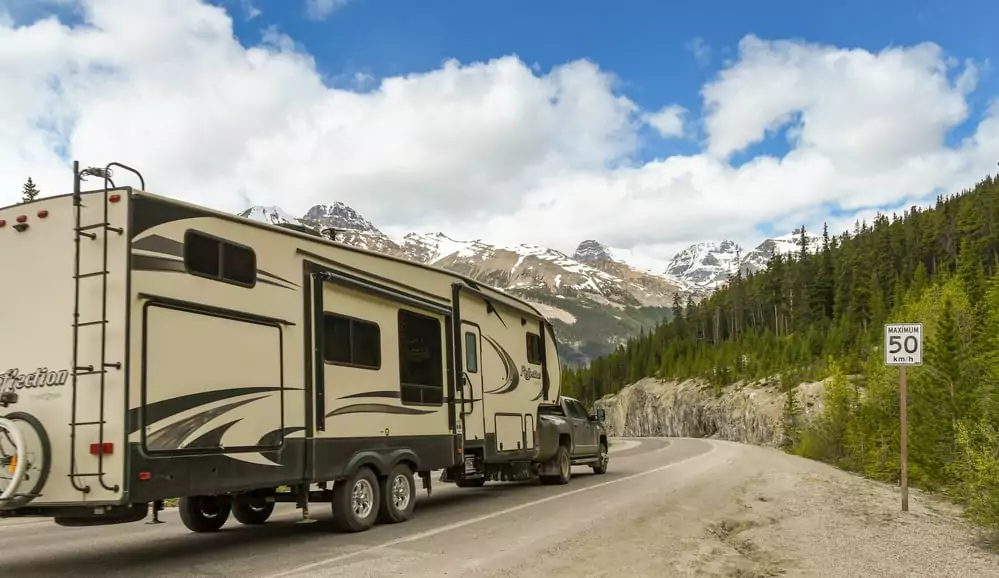
Ultimate Guide To Camper Weight (15 Examples + Infographic!)
- X (Twitter)
- Pinterest 815
How Much Does A Camper Weigh?
Here is the average weight of each different kind of tow behind camper:
- The average Teardrop Trailer weighs 2500 lbs (1134 kg) and can be towed by most SUV’s and trucks.
- The averag e Pop-up Trailer weighs 1500 lbs (680 kg) and can be towed by most SUV’s and trucks.
- The average small Travel Trailer (<25 feet) weighs 3500 lbs (1588 kg) and can be towed by mid size SUV’s and small pickup trucks.
- The average large Travel Trailer (>25 feet) weighs 6300 lbs (2858 kg) and can be towed by larger SUV’s and 1/2 ton pickup trucks.
- The average small Fifth Wheel (<35 feet) weighs 9000 lbs (4082 kg) and would need a 3/4 ton truck once loaded.
- The average large Fifth Wheel (>35 feet) weighs 12000 lbs (5443 kg) and would need a heavy 3/4 ton or one-ton truck.
- The average Toy Hauler Fifth Wheel weighs 15000 lbs (6804 kg) and carries large cargo requiring a one ton truck to tow.
Of course, with many manufacturers and multiple lines of each type of camper there are many different variants. Having a good knowledge of the specifications that are critical in matching tow vehicle and trailer is the first step in teaming a rig that will keep you safe while on the road.
Vehicle Weight Factors To Consider
When it comes to calculating the average camper weight, there are several things that must be considered and understood in order to make the right match.
UVW -Unloaded Vehicle Weight
The Unloaded Vehicle Weight (exact dry weight) of a camper is the actual weight of an empty camper trailer, including all tanks i.e., water tanks, propane tanks, etc. It is the camper construction weight as you drive it off the lot, before you add anything of your own.
This is especially important during the buying process, because similar trailers with similar unloaded vehicle weights, may have very different cargo capacities.
CCC -Cargo Carrying Capacity
This is the allowable weight you can add to the trailer through belongings, accessories, and people. It is the allowable cargo weight. Also known as net carrying capacity.
GVWR -Gross Vehicle Weight Rating
This is the combination of the above 2 weights. It is the maximum travel trailer weight that is allowed when fully loaded.
GAWR -Gross Axle Weight Rating
Each axle of your RV, trailer, or tow vehicle has a Gross Axle Weight Rating, which is the maximum amount of weight that it can carry. With RV’s the axle’s are typically designed to carry the GVWR of the RV.
This factor becomes very important when you are towing a trailer, as there will be weight added to the rear axle of your tow vehicle. The added weight plus the portion of the vehicle cannot exceed the rating for the axle. So one trailer may allow you to add more weight in water, belongings, your propane tank, generator, etc.
It is also important when figuring out your weight distribution of a multi-axle trailer.
Hitch Weight
As explained above, this weight rating is the amount of trailer weight that is placed on your tow vehicle as opposed to what is carried by the axles/ tires of the trailer. This weight may go onto the bumper if you are hauling a travel trailer, or directly onto the axle if you are hauling a fifth wheel.
Typically, this is fifteen to twenty percent of the total weight of your camper, including camping gear. Of course it will rise as the trailer gets longer. A 20 ft camper trailer weight is going to be much easier on your hitch than a 38 ft camper!
Maximum Towing Capacity
This is the maximum weight that your tow vehicle can tow. Also known as your vehicle’s tow rating.
GCWR -Gross Combined Weight Rating
The gross combination weight rating is the maximum weight for your truck and trailer combined.
Here is a camper weight chart showing the average weights of each type of RV.
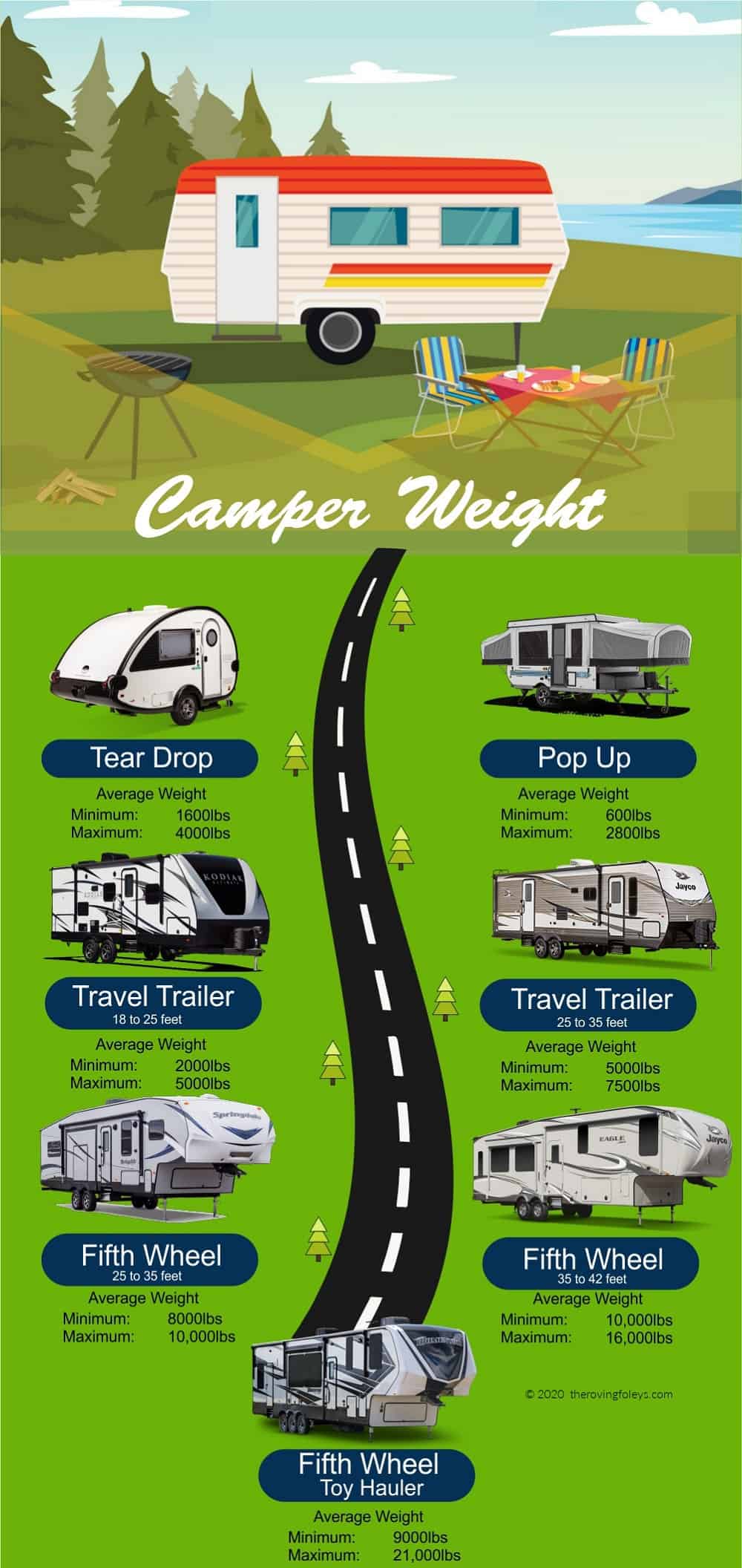
Camper Construction Can Effect Camper Weight
The construction of your camper can affect the weight of the trailer. For example, slide outs help increase the square footage of a camper; however, a slide out can increase the weight of the vehicle by about 800 pounds.
If you have multiple slide outs, the weight of the camper can increase significantly, and the type of towing vehicle needed can vary.
One thing to be very aware of is that sometimes, in order to keep weight down, the larger RV’s can carry undersized tanks, or have smaller allowable payloads.
Make sure you know what you are getting here before you buy- especially if you intend to spend a great deal of time in the rig.
Getting The Right Tow Vehicle
You can tow a camper with a car, SUV, or truck, depending on the weight of the camper. The highest towing SUV’s will pull around 10,000 lbs so if you are towing a larger camper, you will need a truck. If the travel trailer is heavy or you will be traveling great distances, you may want to opt for a diesel engine. Diesel vehicles are designed for towing and will provide you with better gas mileage. Additionally, running slightly below the speed limit can help decrease your gas consumption .
Average Camper Weight Examples
Let’s look at different types of camping trailers to help you determine the type of trailer (pop up camper, fifth wheel, travel trailer, toy hauler, airstream, or teardrop camper) your vehicle can handle. We have listed some of the most popular pull behind campers along with their average trailer weights, etc.
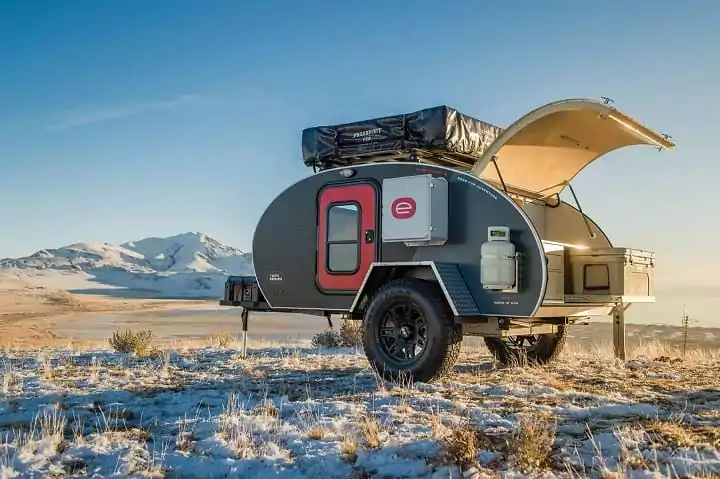
Escapod Topo Travel Trailer:
The Escapod Topo is a super small design known as a “teardrop” trailer. This trailer is 12.5 feet long and weighs in at 1600 lbs. A water tank is optional bringing the weight up to a whopping 1800 lbs. Lets face it, you could tow this baby with your bicycle.
One of the more intriguing tiny campers in the modern surge of adventurous teardrop trailers, the Escapod Topo combines rugged construction, compact design and killer graphics. NewAtlas.com Tweet
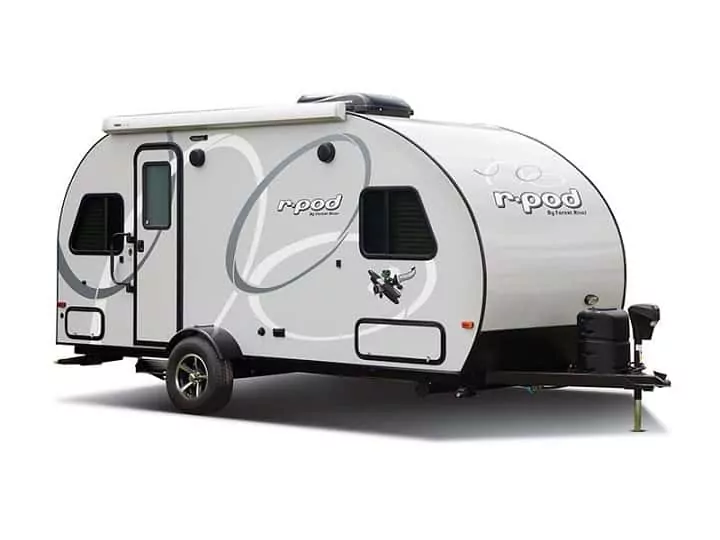
Forest River R-Pod Travel Trailers:
The Forest River R-Pods are a very successful line of exceptionally small and lightweight travel trailers designed to be towed by…well… just about anything. These trailers are indicative of a trend towards small “teardrop” designs. There is even a growing niche of people who buy steel utility trailers and build their own rigs.
The overall 2022 series of R Pods runs from 19 to 25 feet in length and have dry weights between 2700 and 4600 lbs and can hold cargo weighing from 800 to 2100 lbs. Fresh water tanks for all models hold 30 gallons of water. Gray and black tanks hold 30 gallons each across the line.
They have also added some nice features like larger refrigerators and central vacuums. So even the heaviest R-Pod could be towed with a tow package equipped Jeep Wrangler or most small pickup trucks.
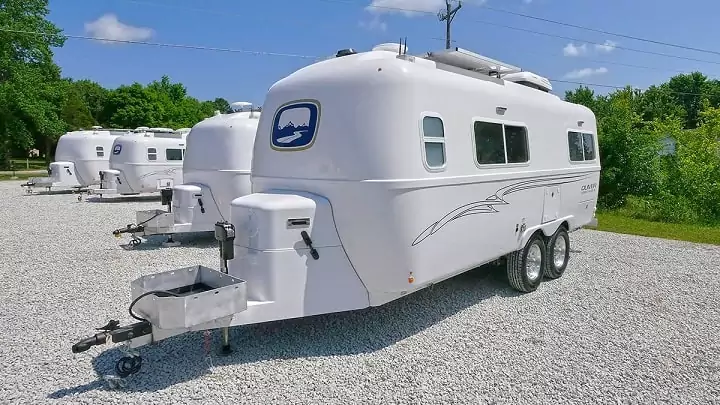
Oliver Elite and Elite II Average Camper Weight
With its outer fiberglass double wall construction, the Oliver Elite line of travel trailers are quite unique to the RV industry. There are only 2 models available and each one is custom made for the consumer. The Elite model weighs in at 3700 lbs empty and 5000 lbs fully loaded. It has a 30 gallon fresh water tank, 32 gallon gray tank and an 18.5 gallon black tank. It is 18.5 feet long and has a hitch weight of only 370 pounds. It sleeps 3.
The larger brother, the Elite II is 24 feet long and weighs in at 4900 lbs dry and 7000 loaded. It has a similar water system as the smaller trailer and also sleeps 3.
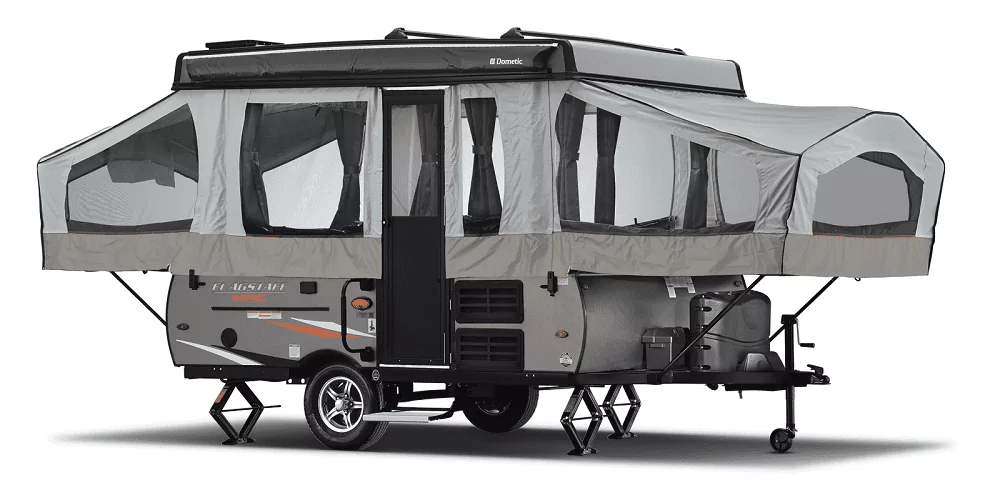
Forest River Flagstaff Pop Up Camper:
Pop up campers are the type that have a roof that “pops up” to reveal soft sided walls, and bunks that fold out of the sides, front and back. The Forest River line includes 10 floor plans ranging from 12′ to 22′ (towing) and 17′ to 28′ (camping).
The popup camper weight will run from 1400 to 3700 lbs dry with Cargo Carrying Capacities from 500 to 1350 lbs and a hitch weight of 195 to 380 pounds. Many vehicles will tow these trailers.
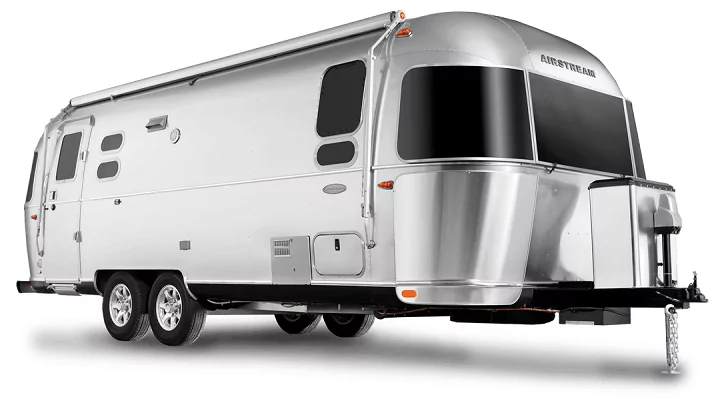
Airstream Flying Cloud Travel Trailer:
The Airstream Flying Cloud line encompasses 13 floor plans ranging from 23 to 31 feet long and sleeps up to eight people. The Airstream’s fresh water holding tanks hold between 37 and 52 gallons, the gray water capacity is 37 gallons, and the black water holding tank is 17 to 41 gallons.
The dry weight of the Flying Cloud is from 5000 lbs to 6557 lbs and the gross vehicle weight rating is 6000 to 8800 pounds, depending on the model. The hitch weight is 500 to 899 pounds. So any of them can be towed by a 1/2 ton truck.
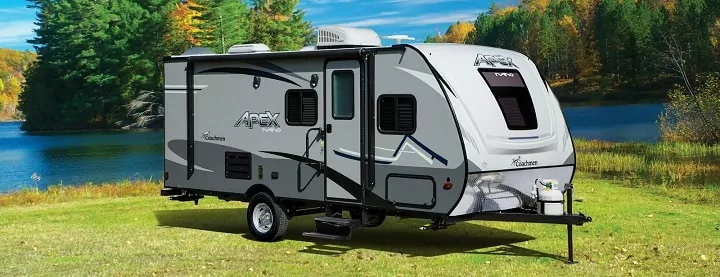
Coachmen Apex Nano Travel Trailers:
The Apex Nanoline offers 6 models (plus 4 temporary production models.) including the new 17th which replaces the award winning 15T model. This line includes travel trailers from 19 to 25 feet long and sleeps up to 7 people. These trailers have fresh water tanks between 30 and 50 gallons and gray and black tanks between 30 and 35 gallons.
ALL of these RV’s weigh under 4000 lbs dry, and have GVWR’s of 6000 lbs or less which means that ALL of them can be towed with a 1/2 ton truck. Hitch weights run between 330 and 596 lbs.
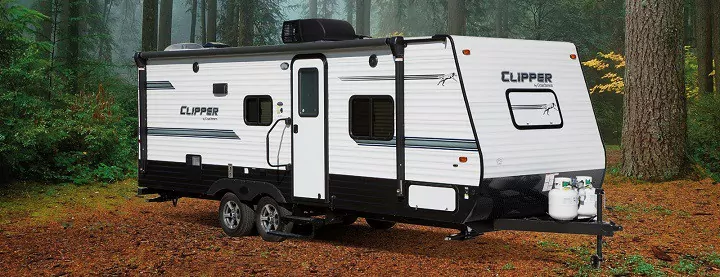
Coachmen Clipper Ultra-Lite Travel Trailers:
The Coachman Clipper Ultra-Lite camper line offers 24 different floor plans. They run from 16’6″ to 32 feet long and can sleep up to 7 people. They include a fresh water system of 27 to 40 gallons, a gray water capacity of 25 to 32 gallons, and a black water capacity of 25 to 32 gallons.
The dry weight of the Coachman Clippers runs between 2700 and 7000 pounds, the gross weight rating is 3823 to 8905 pounds, and a dry hitch weight is 340 to 946 pounds.
Most of these units can be towed by a 1/2 ton truck, but check the particular model to be sure.
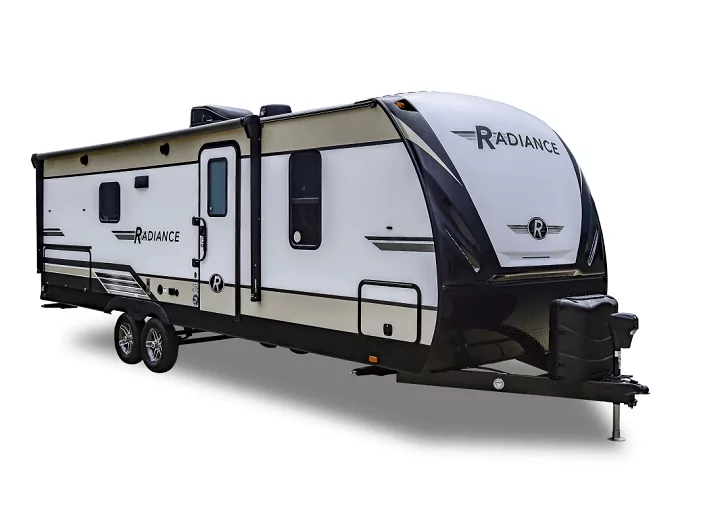
Cruiser Radiance Ultra Lite Average Camper Weight:
The Radiance line of travel trailers includes units from 26 to 37 feet long and sleeps up to 9 people. The dry weight of these campers is between 5346 and 7532 pounds, and the hitch weight is runs from 702 to 1042 pounds. Gross vehicle weight rating is between 7700 and 9842 pounds which makes them questionably 1/2 ton towable.
The Radiance has a fresh water capacity of 44 gallons, a gray water capacity of 30 gallons, and a black water capacity of 30 gallons up to a whopping 87 gallons. Thats a LOT of poo!
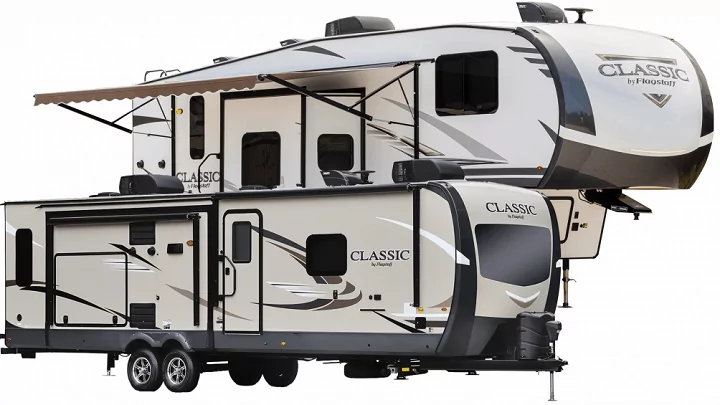
Forest River Flagstaff Classic Travel Trailers and Fifth Wheels
The Flagstaff line of travel trailers and fifth wheels includes 13 models ranging from 29 to 37 feet long and able to sleep up to ten people The dry weight runs from 7809 lbs up to 10686 on the heaviest fifth wheel. With hitch weights maxing out at 1802, this entire line could potentially be towed with a 1/2 ton truck depending on how much payload is carried (and the specific truck).
The payload capacity of the Flagstaff is between 1502 and 2702 lbs. Ironically, the smallest allowable cargo payload is for the heaviest (large) fifth wheel, so this should be kept in mind. These trailers also do have motorized slide outs which greatly increases living space.
The fresh water tank capacity on every RV in this line is 54 gallons. The gray tanks 70 to 130 gallons, while the black tanks run between 40 and 50 gallons. Be aware here as well, that the largest rigs sometimes have the smaller tanks.
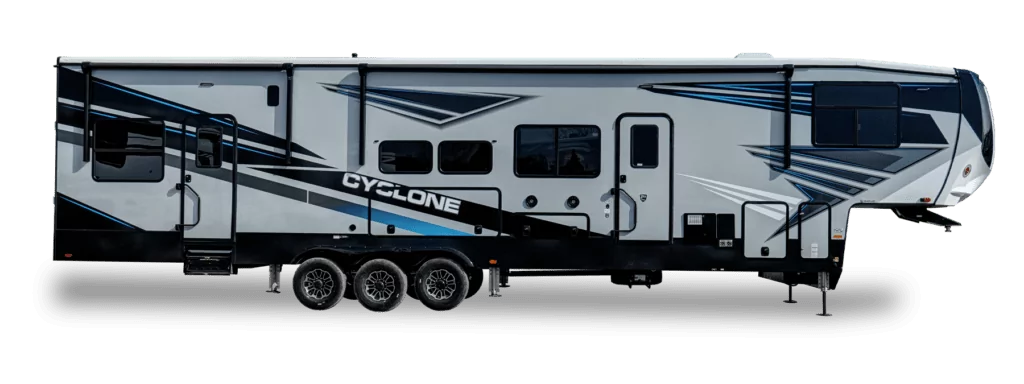
Heartland Cyclone Toy Haulers
The Heartland Cyclone is is a line of high end toy haulers. As such they are heavy duty, weigh a lot and have tons of storage capacity- including a bunkhouse/ garage that will carry your motorcycles/ golf cart. etc. The rear wall of the rig is hinged to drop down into a ramp gate for loading and unloading.
We include this specific line because its 2022 is a finalist for RV Businesses RV of the Year Award!
‘There are 6 floor plans in this line, running from 39’9″ to 46’7″ long and sleeping up to about a dozen people. The RV’s have a massive fresh water capacity of 100 to 150 gallons, a gray water capacity of 80 to 90 gallons, and black water capacity 80 to 91 gallons. This makes these units well suitable for longer term usage AND boondocking.
The dry weight of the Heartland Cyclone Toy Haulers is from just over 16000lbs up to 20000 lbs, which means these boys are HEAVY DUTY! The cargo carrying capacity is 3386 to 3926 pounds, and the dry hitch weight is 2488 to 4650 pounds. So the loaded trailer will be a monster to haul.
Jayco Eagle Fifth Wheels Average Camper Weight
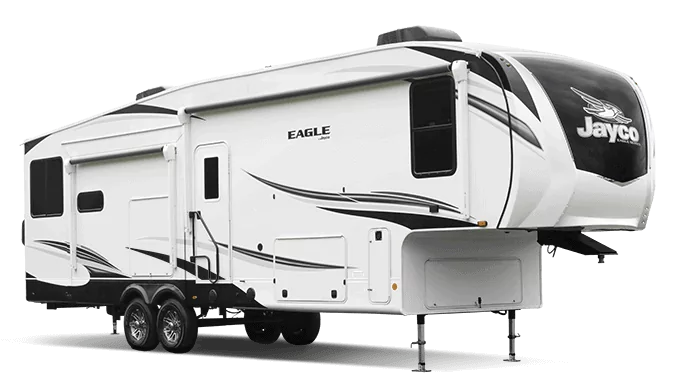
The Jayco Eagle 5th wheel line includes 7 floor plans ranging from 36′ to 42′ and sleep up to 11 people. These are a “middle of the road” series as far as weight goes running from 10580 lbs to 13250 lbs fully loaded and hitch weights from 1745 to 2315.
This would put them in the 3/4 ton to one ton truck category depending on the truck. The water system for all models is similar with75- 81 gallons fresh, a gray water tanks of50- 87 and a black tank of 50 gallons. What is weird here is that the largest model has the smallest cargo capacity AND the smallest tanks. Maybe used a little light chassis here?
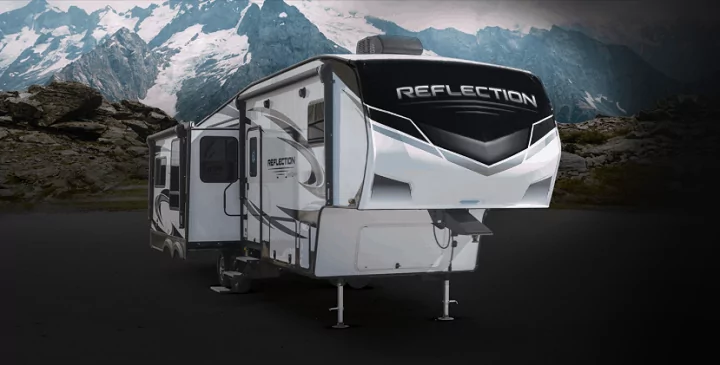
Grand Design Reflection Fifth Wheels
The Grand Design Reflection line of 5th wheels is one of the best selling and best built RV lines. The Reflection “150” series includes 6 floor plans ALL designed to be 1/2 ton towable.
The Reflection series is a line of 8 floor plans which are a bit larger and heavier so could require a 3/4 ton truck to tow. The entire line runs between 28 and 36 feet long and can sleep up to ten people.
The campers have a 52 to 60 gallon freshwater system, the gray water capacity is 71 to 94 gallons, and the black water capacity is 39 to 87 gallons. The dry weight of the series is 7204 to 12552 pounds, the gross weight rating is 9995 to 14995, and the hitch weights run from 1195 up to 2461 pounds.
Getting to our destination towing the Reflection with the Ford was about as pleasurable as possible; living in the Grand Design exceeded expectations. It’s a match with tremendous potential for enthusiasts looking for short and/or long-term journeys. Trailerlife.com Tweet
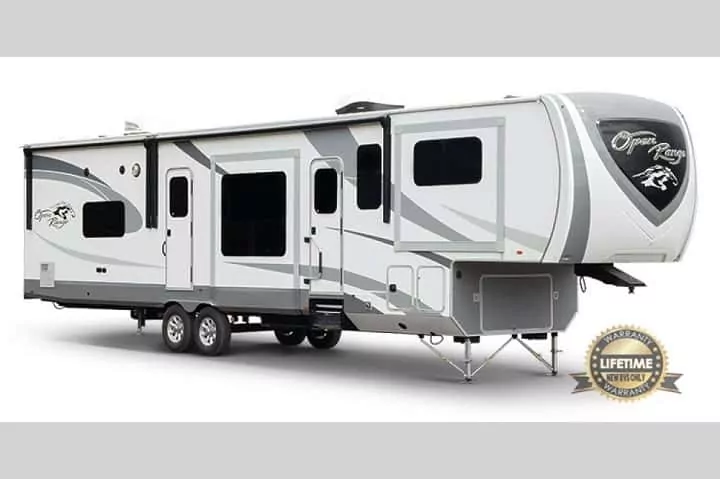
Highland Ridge RV Open Range Fifth Wheels:
The Open Range line includes 15 models. 4 models are called “Light,” 4 are called Roamer, and 9 are simply “Open Range.” These 5’ers run between 32 and 44 feet in length. The “Light” models weigh in starting at 8125 lbs up to the largest Open Range at13345 lbs. With GVWR’s maxing out at 11,500 lbs and hitch weights all below 1650 lbs, the “Light” series are all 1/2 ton towable depending on your truck. The other series will depend on which model.
Their GVWR’s start at 9995 and go up to 16250! Hitch weights are 1665 to 2535 so a 3/4 ton or one ton truck may be required. The largest sleeping capacity is ten people. The campers features 45 gallon up to 75 gallon freshwater system, a 58 to 80 gallon gray water system, and a 29 to 80 gallon black water system.
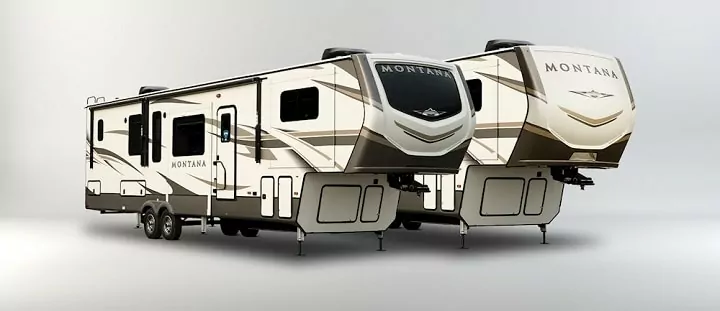
Keystone Montana Fifth Wheels
The Keystone Montana line is one of the most successful RV lines ever, topping sales for 5th wheels 14 years running. Their 2022 models are some very exciting new designs included in it’s 17 available floor plans. These are not small 5’ers, all models falling between 32 and 41 feet.
The dry weight is between 11081 and 14345 lbs and the Cargo Carrying Capacities run between 2280 and 2940 lbs. The water system is the same through out the line with fresh water tanks of 66 gallons, gray tanks holding 88 gallons and black tanks holding 49-88 gallons.
A 3/4 or one ton truck would be required to pull one of these beauties.
Many individuals will also use a generator for power when they are not camping in a campground (going off grid). The weight of the generator will also need to be calculated into the overall weight of the camper.
Campers come in a range of sizes and shapes. Understanding how much your travel trailer weighs when it is unloaded as well as how much it will weigh once you load in your camping gear will help you determine the type of vehicle that is needed to tow your vehicle.

Frank Foley
Frank is the Head Hubby, Daddy, and Fix-It Guy of the Roving Foleys clan. He ia an avid traveler and has spent over 5 years traveling full time with his family. he loves helping others learn about the RV life. He has also traveled in Europe, Asia, and Australia with his wife Grainne.

5 thoughts on “Ultimate Guide To Camper Weight (15 Examples + Infographic!)”
People talk about half ton towable like that is some kind of panacea. What is half ton towable in the Midwest may not be half ton towable here in the mountainous east. You might actually be able to struggle it up the mountain, but how safe are you trying to keep to speed down going down the mountain. If your truck is rated for a thousand pounds, are you comfortable with the safety margins with a tongue weight of 982 pounds? If your truck will tow 7400 pounds, are you comfortable with the safety margin of towing a trailer that weighs 7000 pounds?
It is a good point, Yom. Many people will recommend a 10% to 20% buffer on the truck towing capacity to make sure that you stay within capacity.
I’m looking into it so I can buy a suitable trailer. Thank you for writing this article.
Pingback: How To Ship a Trailer (Costs and Tips From The Experts) - The Roving Foley's
When considering travel trailers, it’s worth mentioning that their average dry weight is approximately 5,000 pounds. Dry weight denotes the trailer’s weight before any additional gear or belongings are loaded.
Leave a Comment Cancel Reply
Your email address will not be published. Required fields are marked *
Save my name, email, and website in this browser for the next time I comment.
- More Networks
Written by Johnathan R. Smith • September 8, 2018 • 3:28 pm • Guides
Camper Weight Chart (10 RV Weight & Size Examples)

How Much Does A Camper Weigh?
The average camper weighs approximately 5,200 pounds , however this is only the dry weight of the camper and additional items need to be factored in when determining the total weight of the camper.
Lets discuss a few camper weight definitions you need to know when you are deciding upon your first trailer purchase and the average weight of the camper for towing capacity and safety reasons.
The potential legal and insurance ramifications should deter any ignorance because a lack of knowledge in this particular subject could be very costly.
There are laws and regulations in place that are meant to act as guidelines to keep you safe and those around you safe.
Okay, first, since you are curious about the weight of the trailers, let’s take a look at those before we get into the other weight numbers that you will need to know.
Example Camper Weights
- 1,545 Lbs (Unloaded Vehicle Weight) – 13 Feet – 2019 10RK Hummingbird Trailer
- 2,860 Lbs (Batteries and LPs Included) – 16 Feet – 2018 Sport 16RB Trailer
- 2,980 Lbs (Unloaded Vehicle Weight) – 19 Feet 10 Inches – 2019 17RK Hummingbird Trailer
- 3321 Lbs – (Shipped Weight) – 21 Feet 5 Inches – Keystone 175 LHS Single Axle Trailer
- 3,634 Lbs (Batteries and LPs included) – 22 Feet – 2018 Sport 22FB Trailer
- 4761 Lbs (Batteries and LPs Included) – 23 Feet – 2018 International Serenity 23CB Trailer
- 6,586 Lbs (Batteries and LPs Included) – 28 Feet – 2018 Airstream Land Yacht Trailer
- 5625 Lbs (Unloaded) – 29 Feet 2 Inches – 2019 24MBH White Hawk Trailer
- 7,757 Lbs (Unloaded) – 37 Feet 10 Inches – 2019 32BHS White Hawk Trailer
- 6,620 Lbs (Unloaded) – 35 Feet 3 Inches – 2019 30RD White Hawk Trailer
Camper Composition & Trailer Weight

Generally speaking, there are two types of campers; those made of aluminum and those made of fiberglass.
There are benefits to both, so you will need to make some calculations and decide what is right for you and your situation. Here’s a quick rundown:
Aluminum is cheaper than the fiberglass campers which should immediately indicate which one is perceived as the superior product.
You should know that aluminum isn’t a bad product.
True it can be damaged more easily than the fiberglass campers, but those damaged sections are cheap and easy to replace.
Their exterior structure is made of shingles which makes removing one piece and replacing it with another super simple and cheap.
The downside to these trailers is that they often have wooden frames which isn’t the lightest material that you could choose.
This has a direct impact upon your gas mileage, and puts an additional strain upon your truck and its transmission.
This is usually considered to be the superior material for a number of reasons.
The exterior is much more durable, so it will do a better job of holding up to the various rocks kicked its way as well as other sources of potential dents to the fiberglass.
However, when something inevitably does damage it, it will be more expensive to repair
Fiberglass also stays cleaner and maintains its shine better than others.
Its smooth surface is also easier to clean than the aluminum shingles. Since these campers look better over a longer duration, their resell price holds up better.
That isn’t the only reason for the better reselling price.
The fiberglass exteriors usually mean that the structure of the camper is made of aluminum piping rather than wood. This means better gas mileage.
That isn’t a big deal for short and uncommon trips, but it will add up fast of you intend to take the camper around the country.
Trailer Weight Definitions to Know
Okay, hopefully that gives you an idea of the camper weights that you will be encountering. Let’s move onto some definitions.
Afterwards, we can go a bit more into how you can use these numbers to keep everyone safe and help prevent you from destroying your transmission.
It is important to remember that just because you can move the trailer, it doesn’t mean that nothing is going wrong.
Side Note – You can find a lot of the truck-related information on the driver-side door of the truck.
That same information can also be found on the truck’s manual and on the manufacturer’s website
Vehicle Curb (Also called Kerb) Weight
This is the weight of the vehicle with absolutely nothing inside of it. It is the weight of the vehicle itself.
It may or may not include the additional weight of a full tank of fuel, so there can be some variation there. In the United States, a driver is not included in the calculation.
In Europe, many of the manufacturers will add 165 lbs. to account for the driver.
Dry Weight is like Curb Weight except all of the vehicle’s consumables such as fuel, oil, washer fluid, coolant, etc. are not included in the calculation.
Gross Vehicle Weight
This is the combined weight of the vehicle, the people inside the vehicle, and any cargo that is located inside of the vehicle.
To clarify, the Gross Vehicle Weight does not include anything hauled behind the vehicle.
Gross Vehicle Weight Rating
This is the the maximum operating weight of the vehicle. The manufacturers are including the weight of the vehicle of this calculation.
You will have exceeded this number if you drive onto a scale and the number displayed exceeds the GVWR number in the vehicle’s manual.
Gross Combined Weight Rating
The GCWR is the maximum weight of absolutely everything.
When you total the vehicle, everything inside the vehicle, the towing apparatus, the trailer, and everything inside the trailer, it should be less than this number.
Gross Axle Weight Rating (GAWR)
This is the maximum weight that can be placed on the specified axle.
The individual ratings of each axle will likely be specified with a FR (Front Rating) and a RR (Rear Rating).
Additional Camper Weight Considerations.

Campers with Slides
At the turn of the 21st century, campers began to incorporate a sliding room system that expanded the living space from what was essentially a hallway to something a bit more comfortable.
This was a fantastic addition for every camper’s quality of life, but it is also a rather heavy addition. Typically, there will be an additional 750+ lbs per slide.
Water, Food, Clothing, and other random necessities
You might be surprised how quickly the random items that you toss into your camper will quickly add up.
The water alone will typically add about 400 lbs to the load, so don’t fill up until you are at your destination.
According to several sources – You will probably be looking at a rough 1,500 pounds added to the curb weight of your camper when you are all packed up and ready to go.
That will vary of course. Here is some reference material of the bulkier items to help you calculate the amount of weight that you can expect to be adding to your camper.
Potable Water
Yeah, you are probably going to want water.
Most RV sites offer showers and water hookups, so you should be able to fill up at the location.
However you should be aware of the total estimated weight if you are going to carry it with you.
Water weighs 8.3 pounds per gallon. Assuming that you have the rough average of a 40 gallon tank, you will be adding 332 pounds of weight just with that single addition.
Propane Tank
Okay, it isn’t the heaviest item, but it is one of the heavier common items.
You likely have a 30 to 40 pound propane tank.
That base weight of the 30 to 40 pound tank will increase by 25 to 34 pounds respectively.
Each person is expected to add 175 pounds each.
That is the combined average of the typical adult male (191 Pounds) and typical adult female (159 Pounds).
I’m not saying that we should each be eating an average of 3 to 5 pounds of food per day; I am simply listing the averages, so that you can use them in your calculations.
Floor Jack and random tools
The floor jack is going to cost you 35 Lbs, and don’t forget about the other tools that you will probably want to keep handy.
Miscellaneous information
Of course, you will also have 100’s of pounds of random supplies that range from a toaster to toiletries.
Oh, and you will want your books. Don’t forget your Ipad because you really don’t want to leave that behind.
Don’t forget your charging cables…It will add up fast. There are a thousand little items like that that will steal your available weight one ½ pound at a time.
I’d recommend not waiting to pack till the last day because of how common it is to load everything up and find yourselves overweight.
Camper Weight Distribution – Just as Important as Total Weight
One rv is not like the other.
Many people make the mistake of assuming that RV manufacturers take weight distribution into account. Unfortunately, that is not always true.
Sometimes, presentation is the focus because obviously, presentation sells.
I’m not saying this is normal, but it is something to research before committing to a purchase.
I recently made a trip from Bend, Oregon to Orlando Florida.
It was a mad dash that took my brothers and I three days to complete. It was a blast…but it also had it’s risky moments.
A couple times w hile we made our way across the rather boring states in the center of the United States, we came across a couple different campers that were swaying back and forth.
The drivers were doing a good job controlling their vehicles, but you could feel their panic as the winds battered there sides.
A little sway was constantly making the rest of us rather uncomfortable.
Now, there is only so much that you can do in a situation like that.
The one thing that I highly recommend is purchasing a hitch built with anti-sway and weight distributing capabilities.
The Equalizer is the favored hitch at the moment, but there are many other good hitches out there.
Keep in mind that some of them should not be used in icy conditions, so be aware of what your hitch can and cannot do.
Tongue Weight
When dealing with such heavy weights, balance becomes a big issue.
One of the factors needed to achieve this balance is the tongue weight.
This is the calculated weight that is being applied to the ball of the hitch.
Ideally, roughly 9 to 15 percent of the gross trailer weight will be placed upon this point.
Camper Weight Management
The tow hitch rating should exceed the need.
If you are searching for the right camper then you might also be looking for a new towing hitch.
If that is the case, make sure to buy a hitch that is rated for an amount of weight that exceeds what you plan on hooking onto the back of your truck.
The common consensus to exceed that weight by 10 to 30%. Just keep that in mind when you are looking.
Campers hold quite a bit of weight, and can demolish another vehicle if the hitch fails.
You’ll be thankful that you did when you inevitably need to make a sharp turn to avoid a careless driver.
It brings peace of mind knowing that the hitch is less likely to snap or bend.
Don’t Max out the Weight of your Trailer and Vehicle
On a similar note, you shouldn’t load up your trailer and truck to the top of what the Truck is rated to carry and pull.
Just because it can move, does not mean that it can move well.
It is a common mistake to purchase a camper and load it up until it just barely fits within the capabilities of the truck.
Your truck will have a difficult time maintaining the speed limit when hauling that load up the steeper hills.
I have seen this countless times, as I’m sure that you probably have too. That is also a fantastic way to burn up the transmission of your truck.
Braking Considerations
When calculating the weights, keep in mind that the more weight you have, the more difficult it will be to stop in the event of an emergency.
For safety, stay as light as possible; you are not just risking your life out there, you are risking others as well.
You will also be wearing down your brake pads faster.
Do yourself a favor, trim the campers weight and have a safer journey.
I really don’t want you to get hurt.
Weighing Stations – Ticket Warning
You may or may not be aware of this, but there are weigh station checkpoints and police officers with portable scales that are stationed along the major roads to monitor the trucks that are hauling various cargo.
Some of these weigh stations can require campers to stop, but the qualifications for required stops vary from state to state ( You can find more information here weigh stations and RVs ).
About half of the states won’t require you to stop unless your load exceeds 10,000 pounds, but that isn’t the case .
You could be driving away with a hefty fine if the the weight being towed exceeds the tow rating that is listed on the inside of your truck door. Please be careful.
Conclusion on Camper Weight
There are many factors to consider when looking for the average trailer weight. My recommendation is to look at some of the forums of the specific RV that you are looking to purchase to see what other RV owners have experienced with the particular trailer that you are looking at. The overall weight is going to be different than than the dry weight and every owner typically has their own items that they use that should be factored in when thinking about towing capacity.
Recommended RV Articles
- Best Travel Trailers Under 4000 Pounds (Light Towable Trailers)
- Best Travel Trailers Under 2000 Pounds (lbs)
- Best Travel Trailers Under 5,000 Lbs
- 10 Best Pop Up Campers (2020 & 2021)
- 6 Best Teardrop Trailers for 2021
- Do RVs Have to Stop at Weigh Stations?
- Average RV Tank Size and Gas Mileage (MPG) Chart

About the Author / Johnathan R. Smith
Comments are closed.
- Affiliate Disclosure
- Privacy Policy

- More Networks
JavaScript seems to be disabled in your browser. For the best experience on our site, be sure to turn on Javascript in your browser.
- My Purchase Orders
- Compare Products

- Trailer Weights
Trailer Weights by Trailer Type
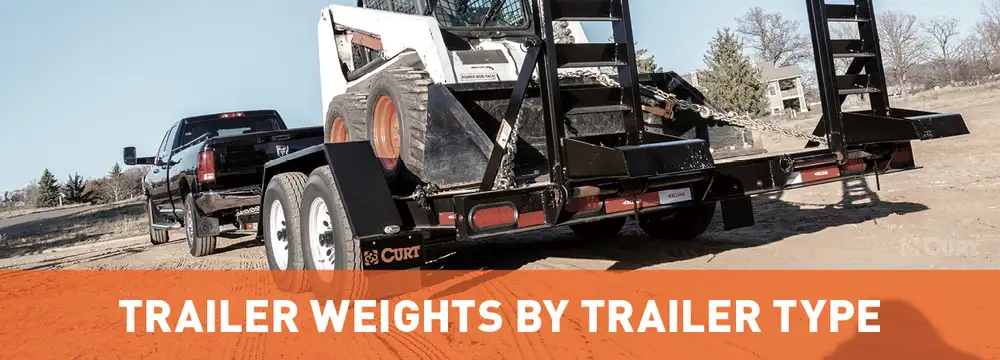
How Much Does a Trailer Weigh?
Each type of trailer has a specific purpose, and because of this, the weight of each trailer is different. Trailers also vary greatly in their capacities, lengths and construction.
This trailer weight chart and guide provides the average weight of each type of trailer, as well as the weight range, the gross vehicle weight rating (GVWR) and the average load capacity.
Warning! The trailer weights listed below are intended to be a general guideline only. The actual weight and ratings of your specific trailer will vary.
Trailer Weight Chart
Tap each trailer type to read more
Brief explanation of terms
- Empty Weight – The weight of the trailer without any cargo or fluids; also called Dry Weight or Unloaded Weight
- GVWR – The maximum weight a trailer is rated to weigh, including cargo, fluids, etc.
- Load Capacity – The total weight of the cargo a trailer is rated to carry
For further explanation of these terms, visit our Towing Capacity Guide .
Tow your trailer with the right hitch! Find a custom hitch made for your exact vehicle.

Camper Weight Chart
There are several different types of campers, from small teardrop trailers to deluxe 5th wheel RVs. This chart provides a focused look at average weights and capacities for most camper types.

Trailer Weights Explained
Canoe / Kayak Trailer Weight
Canoe and kayak trailers are small trailers used for hauling personal watercraft such as canoes, kayaks and even paddleboards.
They typically weigh between 100 and 400 pounds when unloaded. The average weight of a canoe or kayak trailer is 200 pounds.
Depending on the number of watercraft the trailer is designed to carry -- one, two, four or more – the maximum trailer weight can be anywhere from 200 to 800 pounds.
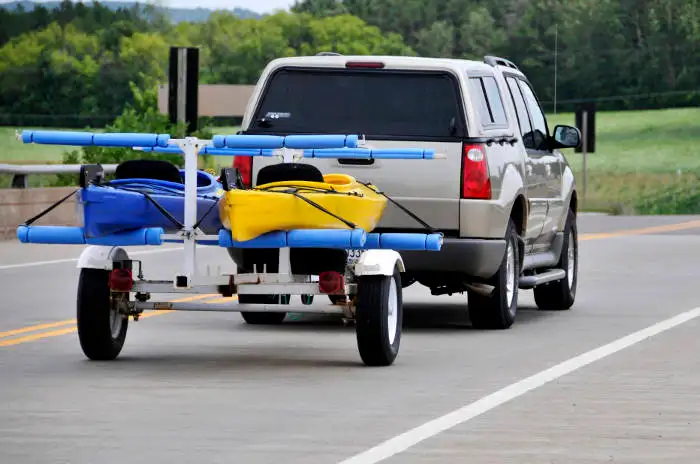
Jet Ski Trailer Weight
Similar to a small boat trailer, jet ski trailers have an average empty weight of 300 pounds. Smaller jet ski trailers weigh as little as 100 pounds and larger ones are closer to 500 pounds.
When loaded, the weight of a jet ski trailer can fluctuate from 800 to 3,000 pounds with an average load capacity of 1,500 pounds.
Weight ratings will differ based on the number of jet skis the trailer is configured to haul.
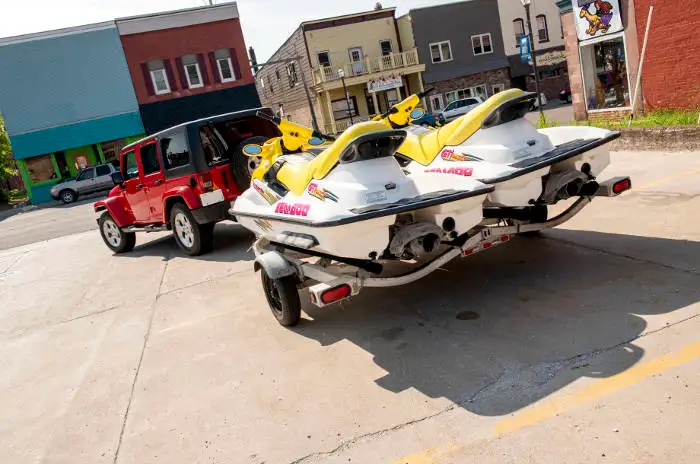
Motorcycle Trailer Weight
A motorcycle trailer is designed for transporting a motorcycle, allowing it to be towed by another vehicle. This is different from a trailer towed by a motorcycle, also known as a motorcycle trailer.
Unloaded, a motorcycle trailer may weigh 300 to 800 pounds with an average weight of 500 pounds. They are commonly rated for a maximum trailer weight of 1,300 to 3,500 pounds, making their average load capacity just under 2,000 pounds.
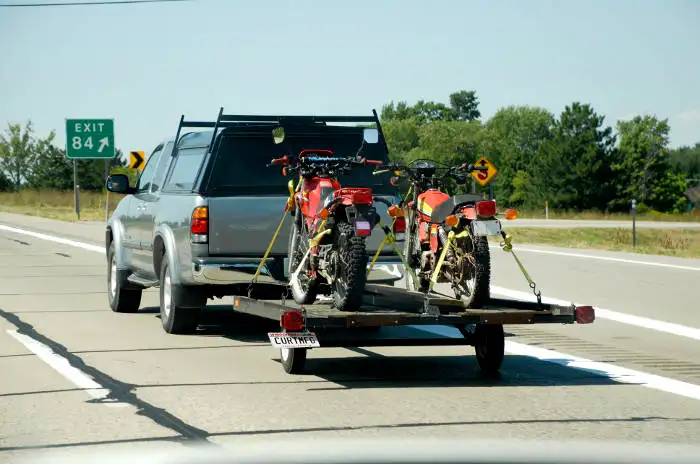
Fishing Boat Trailer Weight
A fishing boat trailer usually weighs 200 to 1,100 pounds on its own, without a boat loaded. The average for a boat trailer is about 600 pounds.
Combined boat and trailer weight ratings ranges from 900 to 6,000 pounds, depending on the length of the trailer and the boat itself.
The average weight capacity for a fishing boat trailer is about 2,700 pounds.
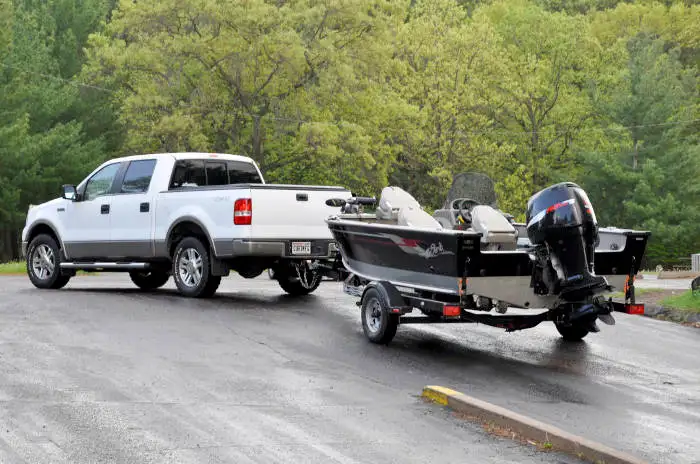
Tow Dolly Weight
A tow dolly for dinghy towing a vehicle usually weighs about 600 pounds without a vehicle hooked up. Some tow dollies weigh as a little as 400 pounds and others as much as 800 pounds, depending on the style and construction.
Tow dolly weight capacity ranges from 3,000 to 5,000 pounds. The capacity refers specifically to the total weight of the dinghy vehicle. However, the average capacity for most tow dollies is closer to 3,400 pounds.

Small Open Utility Trailer Weight
Utility trailers typically weigh about 700 pounds unloaded, but they can vary greatly – from 300 to 1,100 pounds – depending on the construction, width, features, number of axles and more. The type of trailer referred to here is an open utility trailer less than 10 feet long.
The weight capacity of a small utility trailer can also range significantly. A short, aluminum utility trailer may only have a GVWR of 1,000 pounds, while a wide, double-axle, steel utility trailer may be rated for 3,000 pounds.
The average cargo load for small utility trailers is 1,800 pounds.
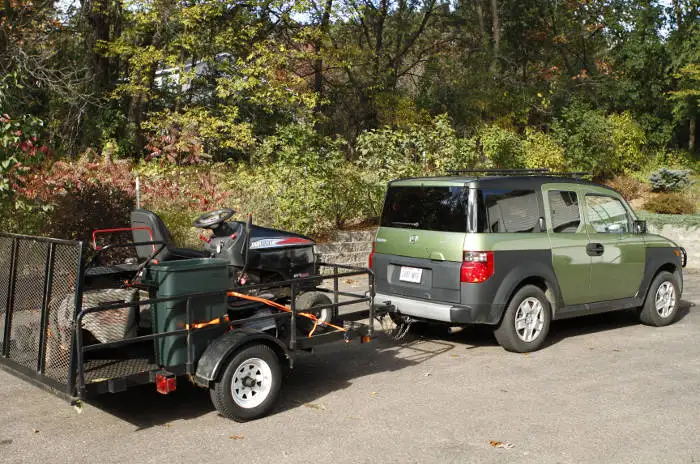
Small Enclosed Trailer Weight
Empty weight for small enclosed trailers spans from 400 to 1,800 pounds. The average for this type of trailer is 1,000 pounds, but this is determined largely by the materials used to construct the trailer and the number of axles.
When fully loaded, a small enclosed utility trailer can be rated for a maximum of up to 7,000 pounds (GVWR). However, for trailers 12 feet long or less, the average cargo load capacity is typically around 2,200 pounds.
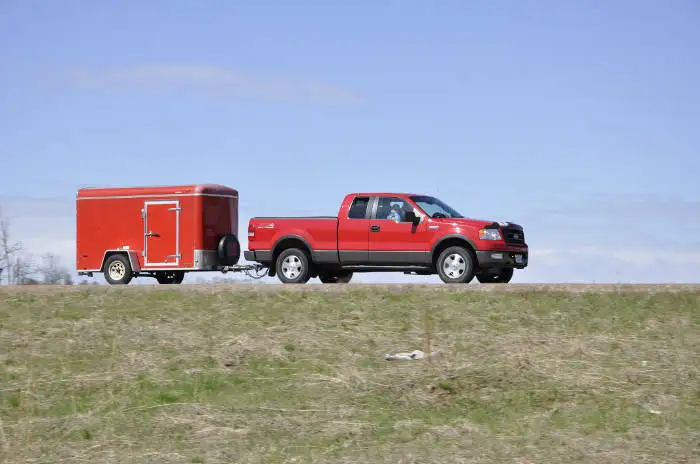
Teardrop Trailer Weight
Teardrop camper trailers weigh between 500 and 3,200 pounds, but the average is about 1,700 pounds. It all depends on the features included. Some teardrop trailers have a fully integrated kitchen and awning system. Others are more basic.
Maximum teardrop camper weight can be as much as 4,000 pounds (GVWR). Some are only rated for 2,000 pounds.
Most teardrop campers aren’t designed to tow a lot of weight, and the average cargo capacity is only about 700 pounds.
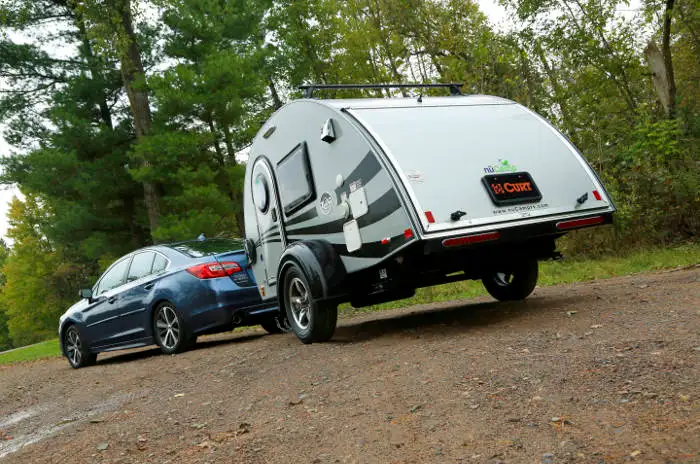
A-Frame Camper Weight
An A-frame camper is a specific type of pop up camper trailer. This type of camper usually weighs between 1,200 and 2,300 pounds unloaded. The average weight is 1,700 pounds.
A-frame campers provide a substantial amount of cargo capacity with an overall average of 1,200 pounds. Gross vehicle weight ratings for this type of trailer range from 2,500 up to 3,600 pounds.
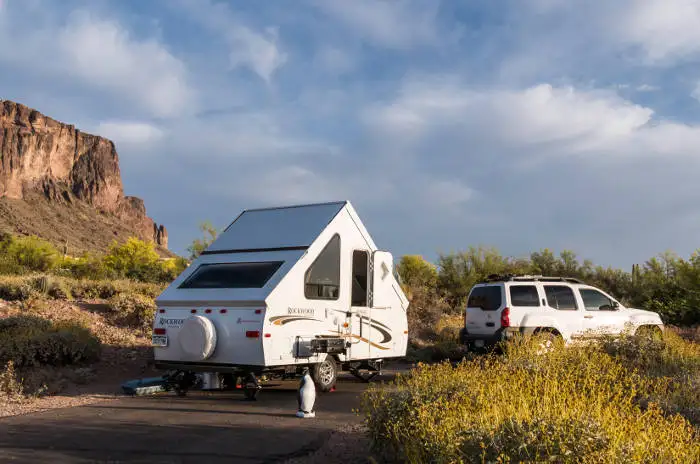
Car Trailer Weight
A car trailer can weigh anywhere from 1,500 to 2,800 pounds by itself. The average is 1,900 pounds. With one or more cars loaded, that weight increases to as much as 15,000 pounds.
The weight of a car trailer largely depends on its construction, length and style. A bumper pull car hauler with length enough for one car may have a GVWR of 6,000 pounds, while a double-car gooseneck trailer could max out at 15,000 pounds. Additionally, aluminum car trailer weight and capacity will vary greatly from steel.
On average, the load capacity for car trailers is 7,100 pounds.

Large Boat Trailer Weight
Larger boat trailers are used for hauling yachts, pontoon boats and other heavy watercraft. For this type of trailer, the empty weight ranges from 1,100 to 4,400 pounds, and the average is about 2,200 pounds.
When loaded with a large boat, the trailer weight increases greatly. The capacity depends on the build of the trailer and its configuration. GVWR can be as low as 5,400 pounds or as high as 34,400 pounds.
Average load capacity for large boat trailers is around 11,400 pounds.
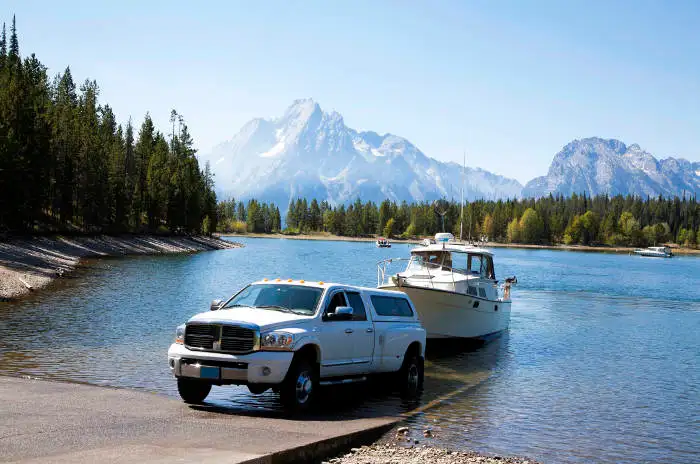
Pop Up Camper Weight
The average weight of a pop up camper is about 2,300 pounds unloaded. Some are as little as 1,400, and others weigh as much as 3,000 pounds if they are equipped with certain features.
When fully loaded (GVWR), pop up trailer weight can range from 2,700 up to 4,000 pounds, giving this type of camper an average load capacity of 1,100 pounds. This provides plenty of room for a propane tank, water tank, grille, bedding, luggage and other necessary cargo for a successful campout.
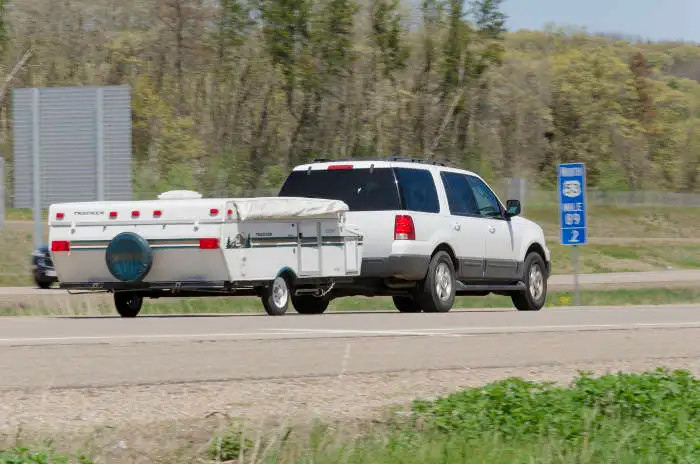
Large Enclosed Trailer Weight
Large enclosed trailers, namely those 12 feet or longer with a bumper pull coupler, typically weigh about 2,700 pounds when empty. Some are little as 900 pounds. Heavy-duty models weigh up to 5,200 pounds.
The capacity of a large enclosed utility trailer can vary based on how many axles it has, the construction of the frame and other factors.
In general, the average cargo capacity is 4,400 pounds. However, some 12-foot enclosed trailers only have a gross vehicle weight rating of 3,000 pounds. Longer units are rated as high as 10,000 pounds.
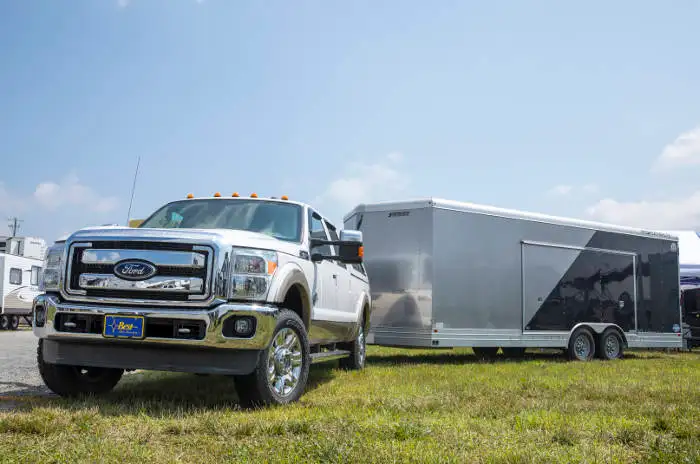
Small Travel Trailer Weight
A smaller travel trailer – about 22 feet long or less – has an average weight of about 2,800 pounds. The unloaded weight range is typically between 1,200 and 3,900 pounds.
The gross vehicle weight rating of small travel trailers varies from 1,900 pounds up to 4,500 pounds.
Generally, small travel trailers don’t have a lot of extra cargo capacity. The average is only about 800 pounds. However, some are rated to carry as much as 1,400 pounds. The cargo capacity may increase with certain design features and additional axles.
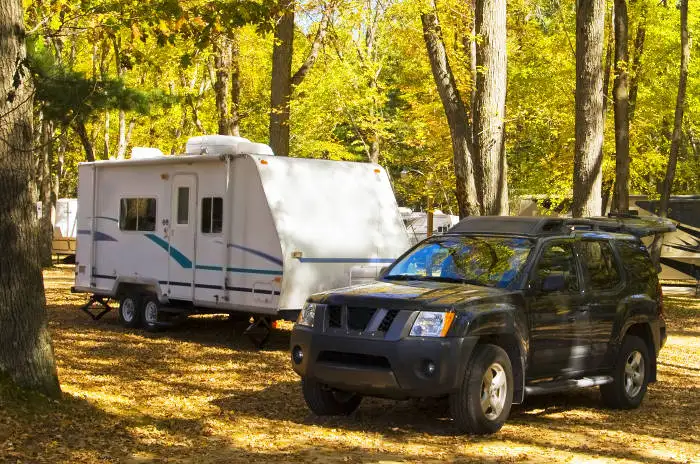
Small Horse Trailer Weight
A horse trailer designed to transport one or two horses typically weighs between 2,300 and 3,900 pounds. With horses and cargo loaded, this number increases. The average empty weight of a horse trailer is about 2,900 pounds.
When loaded up, small horse trailers max out at 7,000 or 8,000 pounds (GVWR). This allows for a cargo capacity of about 4,300 pounds.
Load capacities vary by trailer style and construction. A simple, one-horse trailer made from aluminum will weigh far less than a deluxe, two-horse trailer with a steel frame.
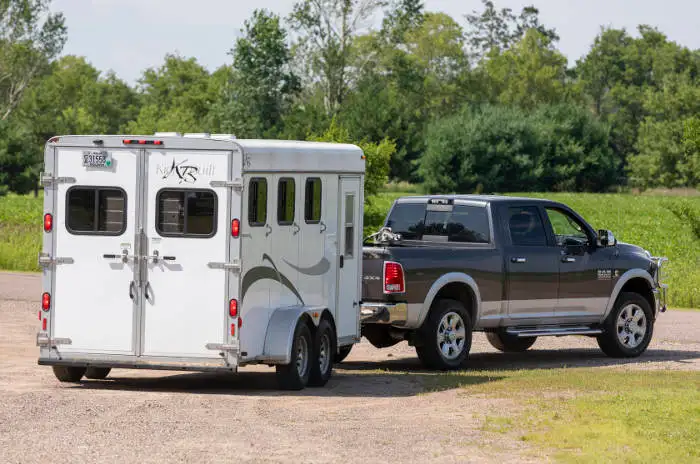
Large Flatbed Trailer Weight
Large flatbed trailers, such as car haulers, equipment trailers and utility flatbeds, can weigh anywhere from 500 to 7,700 pounds, even when empty.
However, because they are designed for transporting large amounts of cargo, most large flatbed trailers – that is, bumper pull flatbed trailers – have a higher cargo capacity. The average is about 7,400 pounds.
For gross trailer weight ratings on flatbed trailers, the low end is around 2,900, but some are rated as high as 26,000 pounds, even with a bumper pull configuration. Gooseneck models are rated even higher.
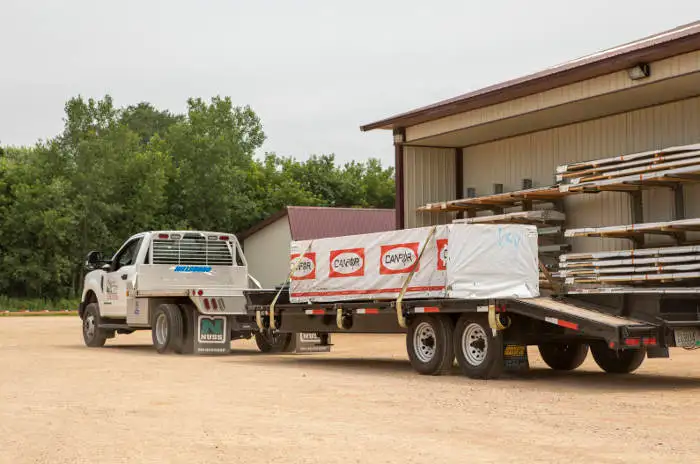
Dump Trailer Weight
When empty, a dump trailer can weigh anywhere from 1,100 to just over 10,000 pounds. The average weight for dump trailers is 4,500 pounds unloaded.
This type of trailer is extremely useful for transporting large amounts of fine or loose materials – everything from gravel to demolition waste. The hydraulic or powered dump receptacle makes unloading fast and easy.
The smallest dump trailers have a gross vehicle weight rating of 3,000 pounds. The largest models can weigh as much as 30,000 pounds. The average GVWR for dump trailers is around 12,400 pounds.

Large Travel Trailer Weight
A large travel trailer – anything around 20 feet or longer – has an average weight of about 6,700 pounds. Specifically, this refers to the travel trailer dry weight. This weight is largely dependent on the types of features and how many axles the trailer has.
Some larger travel trailers only weigh about 4,500 pounds, but the largest are around 9,000 pounds. 5th wheel camper trailers weigh even more.
When fully loaded with cargo, supplies and fluids, the gross vehicle weight rating of a travel trailer can vary from 6,300 to 10,500 pounds. The average cargo capacity of a bumper pull travel trailer is 1,600 pounds.
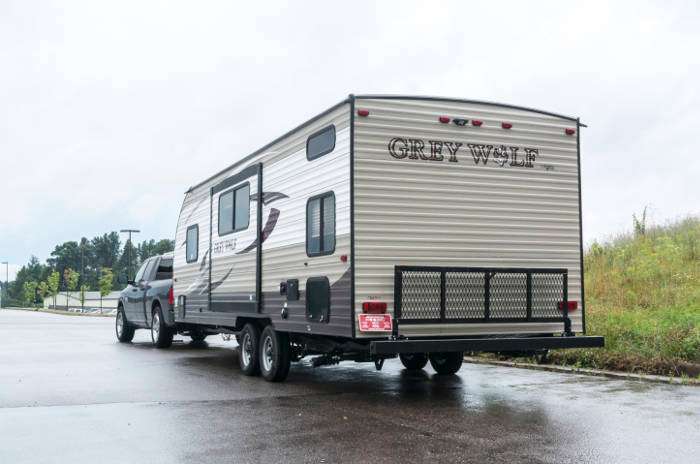
Gooseneck Flatbed Trailer Weight
Gooseneck flatbed trailers and utility trailers generally have higher weight ratings than their bumper pull cousins. A typical gooseneck flatbed trailer weighs about 7,000 pounds without cargo.
Smaller gooseneck flatbeds can weigh as little as 4,700 pounds, but the largest are upwards of 10,000 pounds.
For gross vehicle weight ratings, gooseneck flatbed trailers are built for heavy-duty hauling, whether it’s construction materials, farm equipment or automotive toys. Some are only rated for a maximum weight just under 16,000 pounds. Heavier-duty options are rated up to 36,000 pounds.
The average load capacity for gooseneck flatbed trailers is 16,000 pounds.
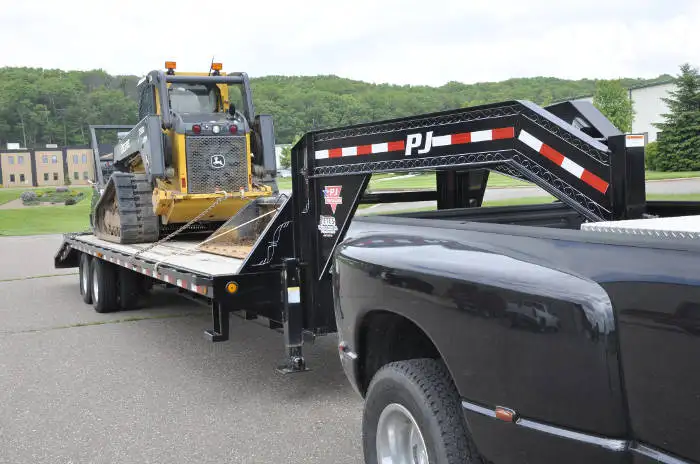
Large Livestock Trailer Weight
Larger livestock trailers range in weight from 4,200 to nearly 11,000 pounds when unloaded. With animals and cargo on board, that range increases up to 24,000 pounds (GVWR).
Livestock trailers are fairly diverse in their design and size. For example, a 20-foot aluminum bumper pull livestock trailer will be much lighter than a 40-foot steel gooseneck horse trailer. Some livestock trailers are also equipped with wash stalls, a living space and other features, adding to the overall weight.
The average empty weight for large livestock trailers is about 7,300 pounds. For load capacity, the average is around 11,400 pounds.
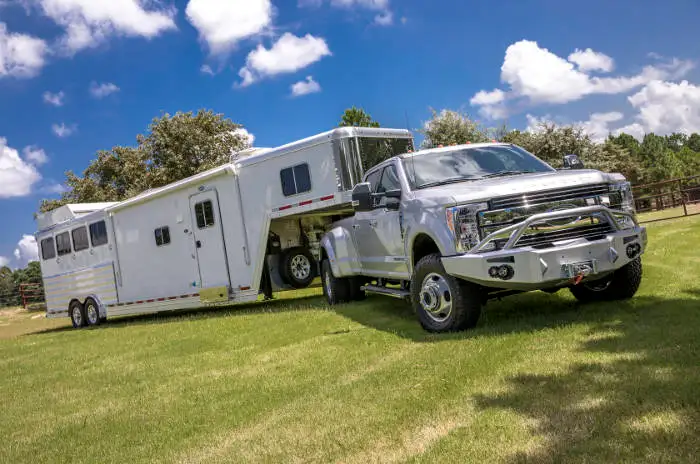
Toy Hauler Weight
A toy hauler is a bumper pull, 5th wheel or gooseneck trailer with a living space and a large compartment for transporting ATVs, UTVs, dirt bikes and other recreational motorsport vehicles.
Toy haulers, when unloaded, range in weight from 3,600 to 11,400 pounds, with an average of about 7,600 pounds.
Because they’re built for transporting smaller vehicles, toy haulers generally have a higher cargo capacity. The average is about 10,000 pounds.
Gross vehicle weight ratings for toy hauler trailer can vary from just under 15,000 to over 22,000 pounds.
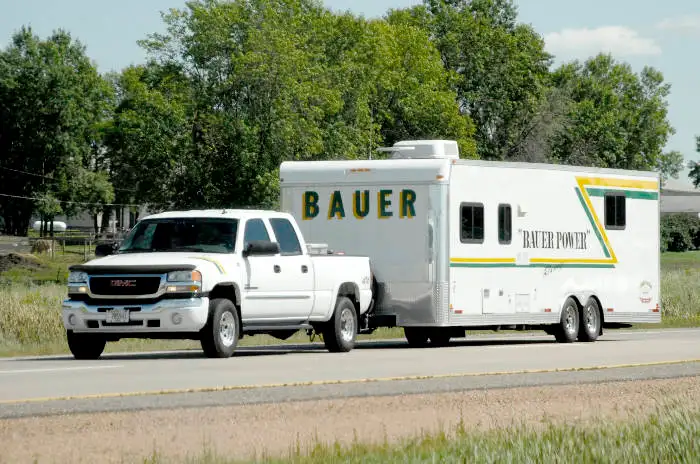
5th Wheel Camper Weight
5th wheel campers have an average weight of 12,700 pounds, empty and unloaded. Smaller models weigh as little as 5,000 pounds, while the largest 5th wheel camper trailers weigh up to 16,000 pounds.
To allow plenty of space for camping gear, equipment, cargo and fluids, the average load capacity is 6,000 pounds.
When fully loaded and ready for towing, most 5th wheel campers have a gross vehicle weight rating between 17,000 and 20,000 pounds.
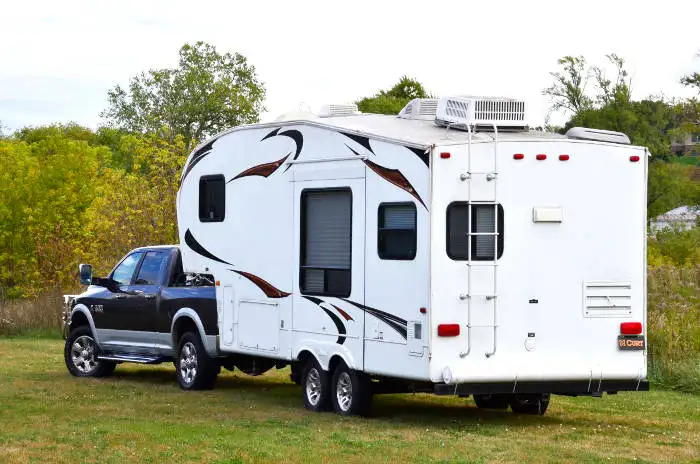
1. How much does a camper weigh?
A camper can weigh anywhere from 500 to 20,000 pounds. It all depends on the style of the camper. For example, a teardrop camper usually weighs about 1,500 pounds unloaded, while a 36-foot 5th wheel camper can weigh as much as 15,000 pounds, even when empty.
2. How much does a teardrop trailer weigh?
A teardrop trailer is one of the smallest camper types and one of the lightest. They typically weigh between 500 and 3,000 pounds, but the average is closer to 1,500. Some teardrop camper trailers have a gross vehicle weight rating as high as 4,000 pounds.
3. How much do pop up campers weigh?
Pop up campers weigh between 1,400 and 4,000 pounds. When empty and unloaded the average weight for pop up campers is about 2,300 pounds. However, they can also carry an average cargo load of 1,100 pounds. For maximum vehicle weight, a pop up camper can range from 2,700 to 4,000 pounds (GVWR).
4. How much does a small camper weigh?
A small camper can weigh anywhere from 500 pounds to 4,500 pounds, depending on the style. Teardrop campers, pop up campers and shorter travel trailers can all be classified as small campers. The average weight of a teardrop camper is about 2,000 pounds with cargo, and the average for small travel trailers is about 3,000 pounds.
5. How much does a travel trailer weigh?
Travel trailers vary in weight from 1,200 to almost 9,000 pounds. They come in various lengths, styles and builds, allowing for a diverse weight range. Smaller travel trailers have an average maximum weight of about 3,500 pounds (GVWR). Some larger travel trailers can max out at over 10,000 pounds when fully loaded up.
6. How much does a 5th wheel weigh?
5th wheel trailers are one of the heaviest types of trailer, with an average empty weight of about 13,000 pounds. The average gross vehicle weight rating for 5th wheel trailers is around 18,000 pounds, but some are as much as 20,000. Additionally, gooseneck trailers with a 5th wheel conversion can be even heavier.
7. How much does a boat trailer weigh?
Boat trailers by themselves can weigh as little as 100 pounds or as much as 4,400 pounds. The weight is determined by the length of the trailer and the type of boat or boats it is designed to carry. For example, jet ski trailers are about 300 pounds on average. Standard fishing boat trailers usually don’t weigh more than 1,000 pounds. Large yacht trailers, even without a boat loaded on, can easily be over 4,000 pounds.
8. How much does a boat and trailer weigh?
A boat and trailer together can weigh anywhere between 900 and 35,000 pounds. For small fishing boats and jon boats, the total weight for the boat and trailer ranges from 900 to 6,000 pounds. On the other hand, a heavy-duty yacht trailer and its craft together can easily weigh beyond 30,000 pounds.
9. How much does a horse trailer weigh?
Horse trailers vary in length, construction and features. A basic, aluminum single-horse trailer usually weighs less than 3,000 pounds. On the other hand, 12-horse trailers or horse trailers with a living space, elaborate wash stalls and other equipment can weigh upwards of 20,000 pounds.
10. How much does a 2-horse trailer weigh?
2-horse trailers weigh between 2,000 and 8,000 pounds. Some are more simple and constructed from lightweight materials. Others are more elaborate and longer, even though the horse capacity remains at 2 maximum. The average load capacity for a 2-horse trailer is about 4,000 pounds.
11. How much does an enclosed trailer weigh?
The weight of an enclosed trailer can fluctuate from 400 pounds to more than 20,000 pounds, depending on the style of the trailer and whether it is loaded with cargo or not. For example, a small, basic, enclosed utility trailer, empty of all cargo, may only weigh 500 pounds. Conversely, a toy hauler loaded up with a few ATVs might weigh in at 22,000 pounds.
12. How much does a car trailer weigh?
An unloaded car trailer usually weighs between 1,500 and 3,000 pounds. Gooseneck-style car trailers can weigh over 10,000 pounds. The construction, length and number cars the trailer is built to transport can make a huge difference. When loaded, the weight of some car trailers can increase to as much as 36,000 pounds.
Warning! The trailer weights listed on this page are intended to be a general guideline only. The actual weight and ratings of your specific trailer will vary.

The Savvy Campers

What does the Average Travel Trailer Weigh (With 15 Examples)
We researched 15 popular travel trailers from different manufacturers, looked into different lengths, and different styles and found some good answers to the average weight of a travel trailer. Travel trailers vary on weight per foot, this could be a sign of quality, or a sign of using heavier materials. We dive down into average weights below.
What does the average travel trailer weigh?
From our research of 15 examples of popular travel trailers, the average travel trailer weighs 5,215 pounds or about 191.43 pounds per foot of length. These numbers are dry weight from the manufacturer with no supplies, water, gear, foot, or any other items installed.
When searching for a travel trailer, there are several types, sizes, and they all have different weights. We have seen a 19’ travel trailer weigh 3,500 pounds and a 19’ travel trailer weigh 5,600 pounds. This difference in weight can be caused by several factors, how well it is built, how much insulation it has, does it have hardwood cabinets, is it wood frame or aluminum, and many other factors.
Average Camper Weight
We have searched the top 15 examples of popular travel trailers and found that on average, travel trailers weigh 5,215 pounds and weigh 191.43 pounds per foot of length. Different factors can cause these varying weights, but most trailers quality on this list are similar.
*Weights listed as dry weight are empty from the trailer manufacturer
What is Dry Weight?
Dry weight is a weight that is listed on the side of a travel trailer from the manufacturer. Dry weight that is listed from the manufacturer can be very misleading. Some manufacturers include two filled propane tanks and batteries in their dry weight calculations, and some manufacturers don’t even include the installed awning as it is listed as an option, which is in most cases mandatory.
To find your exact dry weight on your trailer, unload all of your gear, it is also best to leave on propane tanks and batteries, and go to your local weigh station. Once you have weighed with the trailer, unhitch your trailer from your vehicle and weigh just your vehicle. Subtract these two numbers, and you will have your travel trailer dry weight.
Gear and Fully Loaded Weight
To figure out how much weight you are loading into your RV to make sure you are within your loaded specs, you can complete this in two methods, the scale method and the weigh method .
Utilizing the scale method, you need to know your dry weight by weighing at your local weigh station or dump. First you will bring a scale down to the entrance of your RV. Next you will load your RV with all of your gear and supplies, but before you set your items down, take a weight of yourself holding the gear and subtract from your weight without gear. This will require a notepad to document the weight you have added. This method will take some time, but is simple to do at your house.
The second method to find your exact loaded weight would be to take a dry weight from your local scale. Now load up your trailer with all of your gear and go to the weigh station again. This will give your typical loaded weight. Every time you load up you may have different amounts of gear or food, but you will know if you are at risk of being overloaded or not.
When taking these weights, you will want to make sure you are staying within your cargo carrying capacity (CCC) of your trailer. This will be your dry weight subtracted from your gross weight. Typically your CCC is listed on your trailers sticker on the side, or in your door. You will also want to make sure to include the amount of water you will be loading into your trailer into your calculations. A gallon of water weighs 8.34 pounds. If you have 20 gallons of water, you would add another 166.8 pounds to your weight.
Slides have a high weight ratio for their size. Usually, if you have a travel trailer with a slide, this feature adds about 800 pounds for the special mechanical gear, frame, and motors. In most cases, a slide is always worth having the extra space, but if you have a specific weight limit you need to meet, you may want to forgo the slide addition. In addition to slides being on the heavy side, they can cause more maintenance and repair and could be a bad idea if you are looking for a smooth turn key trailer.
When determining if you need a slide, read our article on what to look for when buying a travel trailer .
Full Water Tank Weights
Full water, grey, and black tanks can weigh a lot on a travel trailer. For example, our RV has 31 gallons of fresh water capacity plus 6 gallons for the hot water tank. Both the black and grey tanks are 25 gallons each. In total, we can add 87 gallons of liquid in addition to our items in our travel trailer or another 725.58 pounds. Our travel trailer has a high CCC, but some others we have seen only give you about 800 pounds, so with full water tanks, you could not add any gear safely.
We usually fill our water tank about 50% before we travel so we have some water if we need to make a pit stop. Also, we have found some extra weight lower to the ground makes our trailer handle a bit better on the drive. We do travel sometimes at 100% full, but only if we are going off grid.
Theoretically, you would never have the fresh, black, and grey tanks full due to the fact that if you use water to wash, you are moving it from the fresh water to the grey water. The same goes for black tank usage. After a trip, we may drive back with 25% capacity in the fresh, 25% full in the black, and 50% or more in the grey. Read about how long fresh , grey , and black water tanks last.
Keep Towing Vehicle at 80% Capacity
When you are towing your trailer, you want some leeway in your towing capacity. Typically trailer guides recommend 20% extra capacity so you do not overwork your vehicle. This means, if you have a towing capacity of 10,000 pounds, you should only tow 8,000 pounds of trailer, gear, and water. Extensive gear in the back of a pickup could reduce this number as well.
In our case, our truck can tow 8,300 pounds. Our travel trailer dry weight is 3,700 pounds, add 258 pounds for a full tank of water, 500 pounds of accessories (batteries, awnings, propane, etc) 500 pounds of gear (bbq, chairs, generator, gas, power cable, etc.) and another 250 pounds for food and clothing. To estimate on the high side, this could make our trailer weigh 5,208 pounds or about 63% of our towing capacity. We make long trips through high mountains so we wanted some more leeway than 20% extra. We may be overestimating our wet trailer weight, but you can see how if you only had 800 pounds of cargo carrying capacity, you could get in trouble very fast by exceeding your weight.
½ ton Towable Travel Trailers
Many manufacturers are trying to trick consumers by producing marketing for ½ ton towable travel trailers . This may be acceptable in some cases, but we have seen one manufacturer with a 7,306 pound dry weight trailer they are trying to pass along as half ton towable. Technically it could be, but it may not be the best idea and certainly couldn’t be towed with older rigs.
Read our articles about our favorite travel trailers under 5,000 pounds and 3,000 pounds .
Towing Capacity
When checking your towing capacity, always look for the capacity of your specific vehicle. Some general guides may not differentiate your vehicle with a certain gear ratio and motor with another. You can search by your specific VIN to find the options on your vehicle if you do not have an original window sticker to make reference to. For a 1500 Dodge in 2006, one model tows 3,300 pounds and another 1500 with different options tows 8,900 pounds. Different items that could change your towing capacity could be engine size, wheel size, gear ratio, transmission, and bed size if the towing vehicle is a pickup.
To achieve the stated towing capacities, you may need a weight distribution hitch. Read about our favorite model here.
Related Questions
How much does a 16′ travel trailer weigh?
Using the 15 models we pulled weights from and an average weight of 191 pounds per foot, a 16′ travel trailer should weigh about 3,056 pounds.
How much weight do you add to a travel trailer?
On average, you may add 166 pounds of water to fill your 20 gallon tank, another 250 pounds of accessories such as propane and batteries, as well as your gear and food which could be about 300-400 pounds. You can easily add 700-800 pounds to your travel trailer.
Be the first to be notified about FREE tips, hints, coupon codes, and email-exclusive information. All for FREE!
Related Posts:

Similar Posts

What to Look for in a Travel Trailer (2024 Buyers Guide)
It took us over a year to find the perfect travel trailer that fit our needs. We looked at all different brands and price points. What was most difficult is that many brands have almost identical trailers, but with one small difference. We learned there is not the perfect trailer, we found ourselves stating time…

Do RV Parks Have Washers and Dryers?
RV parks offer several essential amenities, including showers, running water, and electricity. However, many campers wonder how and where to wash their laundry. After all, not all motorhomes include built-in laundry machines, and being able to wash your clothes at a campground can be tremendously helpful. Most RV parks have washers and dryers for paying…

How to Keep RV Windows from Sweating – Plus 12 Tips for Moisture Control
Condensation forming on the inside of your RV’s windows can be not only annoying but harmful. This may make it hard to see outside the window and can take some time to clean up. How are you meant to keep your RV windows from sweating in the first place? To keep RV windows from sweating,…

How Much Propane Does An RV Water Heater Use?
If traveling and camping are in your blood, you will experience sites that no one else can imagine. Waking up in the middle of nature’s glory is what makes camping exhilarating. Traveling with an RV brings you the little comforts of home, of which heated water makes your trip that much more enjoyable. An RVs…
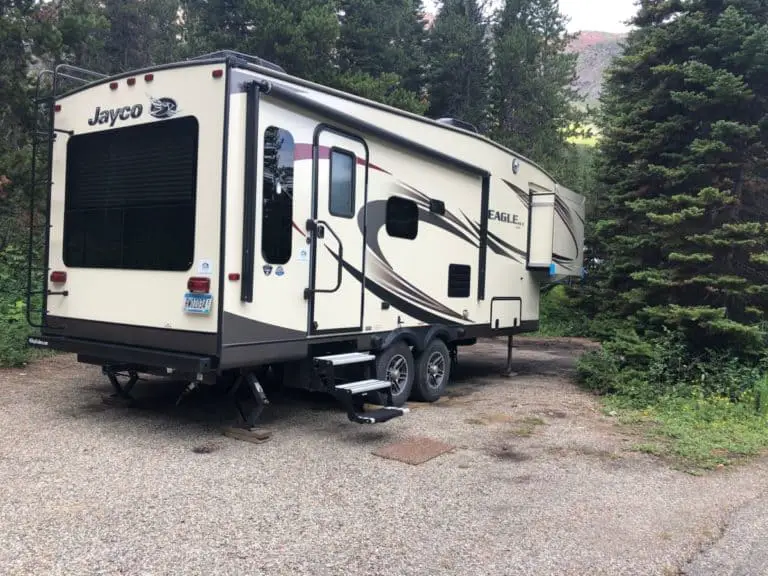
Our favorite 5th wheels with Bunkbeds for your Family
5th wheels are great RV options with extra space, storage, stability, and maneuverability. It’s important to choose your trailer wisely, since its a major and expensive long-term investment. We’ve compiled a list of the top five 5th wheels with bunkbeds, to give you maximum sleeping and floor space (especially with kids!). The 5th wheels on…

How Long will a Grey Water Tank Last?
When picking out the right trailer for you, storage tank sizes can be a big factor of deciding on the right trailer. The length of time a grey water tank will last varies depending on users and how it is used. How long will a gray water tank last? The size of your grey water…
Join our Newsletter to stay up to date on the latest RV topics and receive our FREE RV Inspection Cheat Sheet Today. Use this tool to inspect new or used campers you are looking at purchasing.
No thanks, I’m not interested!


No products in the cart.

The Best Length for a Travel Trailer (Size Chart Included)
NOTE*** The content on this page may contain affiliate links, we may make a commission. And, as an Amazon Associate, we earn from qualifying purchases. More information: disclosure page .
Just in the last decade, I have owned, rented, and sold a number of travel trailers. I have my own share of experience with the different lengths and sizes of RVs. In this article, we get into the different travel trailer sizes and include a travel trailer size chart for you.
What size travel trailer should you buy?
Generally speaking, the ideal travel trailer length for a family of 4 is 25-30 feet long. With a 27-foot travel trailer, you can likely park in your driveway, camp at 93% of national parks, and still have room to sleep 4-6 people comfortably.
Generally, for convenience, longer travel trailers are the best choices for a family with at least 4 members or more. However, there are roads and campsites that have limits on the lengths that they can accommodate.
I have personally experienced the benefits and drawbacks of traveling in different lengths of trailers. So I made this article in the hopes of helping you determine which is the best length for a travel trailer for you. It can also serve as a guide so you can rule out the other sizes that you know won’t work for you.
No matter how long your trailer is you need to see behind you. Campsites can be tight and have obstacles (like kids). A wireless backup camera makes life so much easier .. and safer. This wireless camera on Amazon is easy to install, budget-friendly, and best for shorter trailers ( check price here )
Longer trailers and especially with metal siding will need a wired backup camera. This takes a little longer to install but you can still do it yourself. We suggest this wired backup camera on Amazon .
Best Size Travel Trailer by Length
Some will say that anything above 30 feet is too long for a travel trailer. But the truth is that the answer to whether a travel trailer is too long lies on your tow vehicle.
As a rule of thumb, the longest trailer that your tow vehicle can pull is the one that does not exceed 75% of the maximum loaded weight of your vehicle.
Travel Trailer Size Chart
I put together this travel trailer size chart to help you see the length, weight, and accommodations for travel trailers. This is based on reviewing hundreds of RVs and my own experience.
A big consideration is the number of people in your family. How long does it have to be for you and your family to live in it comfortably?
Travel Trailer Length Based on Camping Preference
Some people report that a travel trailer that is more than 35 feet is a problem when they are looking for a campground to set up base on. Many of the available campgrounds, especially national parks, only have limited and small space.
However, if you own a bigger rig, finding the right campground is possible if you are willing to stay in the vicinity of the sites.
The question will lie in your preferences. Do you plan to camp in National Forests or dispersed campgrounds? If so, then having a long rig will seldom be a problem for you as these campgrounds usually can accommodate longer rigs.
If you prefer to camp in National Parks or small private campgrounds then this might prove to be a slight problem as these campgrounds usually have limits on how long of a rig they can serve.
Read More: 11 Questions You Must Ask to Reserve the Perfect RV Campsite
Pro Tip: Make sure to look into the campgrounds that you plan to stay at. When you are thinking about tight spaces or bumpy roads take into account eh turning radius and hinge point of the trailer.
RV Rental Information
- Motorhome Rental Near Me
- Rent a Travel Trailer
- Pet-Friendly RV rental
- Rent on RVShare
RV Destinations You Will Love
- Places to Camp in Fall
- RV Destinations in October
- Incredible RV Destinations in November
- Places to Camp for Thanksgiving
- Places to Ring in the New Year
- Magical Places to Camp this Christmas
- RV Destinations for December
- Places to Camp in February
- Places to Camp this Spring
- RV Destinations for Spring Break
How to Measure the Length of the Travel Trailer

The length of the travel trailer that your manufacturer specified is the box of the trailer and considered your trailer length. State-run campgrounds and some private ones usually base their site length upon the length of the travel unit itself.
Most often than not, there will be a separate parking space for your tow vehicle.
I own a 35-feet travel trailer. It is specified by the manufacturer as 35-feet. When I call to reserve a campsite, I ask for 35 feet or longer.
However, when going through roads that have length restrictions, you have to make sure to measure the whole length with your tow vehicle.
For example, in Independence Pass near Aspen, Colorado, RVs more than 35 feet in length are prohibited to pass. We have a 35 feet trailer but our total length from the bumper from the front of the truck to the bumper at the back of the trailer is 59 feet. (We know this because we were measured when we took the ferry from Seattle. )
Does Travel Trailer Length Include the Tongue and Hitch?

The trailer length and the manufacture description do not include the tongue and the hitch. The length is only the inside box of the trailer.
If you want to know exactly how long your trailer will be you need to include The rear bumper, any accessories like a bike rack, and the front tongue and hitch. The rear bumper generally adds 6 to 12 inches. The front tongue and hitch add 2 to 3 feet to the length.
So for example my 35-foot travel trailer is 38 feet bumper to hitch. It’s even longer when the bike rack is on the back . When towing it with a truck it is 59 feet bumper-to-bumper.
How Does Length of the Trailer Affect Towing
A longer trailer will move differently behind the truck than a shorter trailer. Both the length and weight of the trailer affect the amount of weight on the tongue and swaying the backend. Most experts agree that a longer trailer is actually easier to tow because it will have a slower delay.
Weight distribution and sway bar will help you tow a trailer. This is the set that I use which is easily installed and works great. Check the price on Amazon.
However, the total radius with a longer trailer will be longer. Therefore your turns will be much wider. In addition, you only to watch the inside corner very carefully for obstacles.
What Are the Disadvantages of a Longer Trailer?
The longer your trailer is, the more difficult it is to look for camps to stay in. Generally, state parks commonly have a length restriction of 35 to 45 feet. However, when your rig is 41 feet or above, you have to expect that you will only be accommodated by less than 10% of the campsites. On the other hand, 98% of campsites can accommodate trailers that are 19 feet and less.
Another disadvantage of a longer travel trailer is the total weight. Once you get up to 30 or more feet and 7 to 8,000 pounds you will need a 3/4 ton or 1-ton truck to tow it.
Pro Tip: Keep in mind that you’re towing capacity will be reduced by up to 20% at altitude and over the mountain passes
A longer trailer has more tail drag in the back end. You will need to be driving on relatively flat roads. So you will be limited to maintained roads and campgrounds. You will not be able to off-road or boondock much.
What are the Advantages of a Longer Travel Trailer
A bigger, longer-length travel trailer has many advantages. A longer camper has more room inside giving you more space to move around. You will also have more privacy. My trailer with 35 feet length actually has 2 separate bedrooms with doors.
Another advantage is the convenience of the space. A smaller camper will need to be spending time changing the inside back-and-forth between living quarters and sleeping quarters. Our first Trailer was a 20-foot long vintage camper with no slide-outs. Every night and every morning we had to transform it back into a table put the bunks away and make the bed back into a couch just to have breakfast.
A longer travel trailer can carry more weight. Once you have a camper you will want to load it up with all your favorite camping gear. You would be surprised how much your toys end up weighing.
In addition, if you are Boondocking he will be also be carrying a full tank of water to your campsite.
A larger trailer also responds to movement when towing more slowly than a short trailer. Some people even say driving a longer trailer is easier than a shorter one. The hinge point at the back of the tow vehicle and the distance to the back end of the trailer is longer. The physics determines how quickly the very back of the trailer responds to small adjustments in the front.
Overall, I never recommend buying an RV before trying out if you like it. You can see all my thoughts here: 17 Undeniable Reasons Why You Should NOT Buy an RV
I advise renting a travel trailer similar to what you are thinking of buying: How Much Does it Cost to Rent a Travel Trailer? (Prices 2022)

Summing up the Ideal Length of a Travel Trailer
The best length for your travel trailer will depend on the needs of your family. If you are traveling long-term and want more space and amenities similar to an apartment, you will require a bigger camper. If you are planning on shorter trips to national parks and sightseeing, a shorter travel trailer will likely work for you.
Before buying a camper I always suggest that you try renting at least one similar to what you’re thinking of buying. Travel trailers are difficult to rent from national companies. However, you can rent from a private owner on Outdoorsy or RVezy .
To rent a camper similar to the one you’re thinking of buying simply go to the Outdoorsy or RVezy website. Once you’re on the website choose the destinations that you would like to pick up the travel trailer. Then from the options choose the number of people that should sleep and your ideal length.
For more resources in renting an RV, read some of our blogs under our RV series:
- 17 Tips to Know for Your First RV trip with Kids
- Questions to Ask Before Renting an RV
- Where the Best Deal on an RV Rental
- How to Reserve the Perfect Campsite Every Time
Similar Posts

7 Expert Tricks to Keep Mice Out of Your RV or Travel Trailer in Winter
Imagine opening up your RV just to de-winterize it, but what you see are mice! Yuck!! That’s me, I learned the hard way. So in this guide, I will give you tips on how to keep mice out of your travel trailer

Earn Money Renting Out an RV on Your Property (Read This First!)
In general, you can rent out your RV on your property if your local laws and neighborhood allow it. Read this article to learn more about renting your RV on your own property.

Do RV Outlets Work On Battery?
RV electrical systems can be somewhat of a mystery. All you want to know is if the outlets will work on battery. We have the answer and a good electrical tutorial here.

Disney Resorts and Theme Parks Around the World
Did you know that Disney has 6 Disney resorts and 12 theme parks around the world? The Disney resorts are Disneyland Resort, Walt Disney World, Disneyland Paris, Tokyo Disney Resort, Hong Kong Disneyland, and Shanghai Disney.

Atlantic vs Pacific Ocean: Which Ocean is Better?
The Pacific Ocean is overall calmer and warmer than the Atlantic, though this is not always the case. Whether you’re heading to the beach with young children or looking for the next wave to catch, your decision could be influenced by several factors.

Can RV Surge Protectors Get Wet? (Caution When Outdoors!)
Damage to your RV electrical systems can be totally disabling. I strongly recommend using a surge protector to protect your RV. You might wonder, are RV surge protectors worth it? What happens if they get wet? I’ll answer all of your questions here.
Leave a Reply Cancel reply
Your email address will not be published. Required fields are marked *
This site uses Akismet to reduce spam. Learn how your comment data is processed .

How much does a travel trailer weigh?
Table of Contents
When making the decision to purchase a travel trailer, one of the first and most complicated mysteries our readers must unravel is – how much does this trailer actually weigh?
The average travel trailer has a dry weight of around 5,200 lbs. These weights will vary greatly based on size of the trailer, ranging from 1,200 lbs (104 lbs per foot), up to around 9,000 lbs (230 lbs per foot) for larger trailers. Gear, tank levels and other equipment will add, on average, another 500-1000 lbs to the overall trailer weight.

Why does trailer weight matter?
A Trailers chassis (frame, springs, wheels, axles, tongue, and tires) are built to specific standards for the maximum weight load they can safely carry. The maximum amount of weight that a trailer can hold on its axle and tongue is called the Gross Vehicle Weight Rating, or GVWR. Exceeding your trailers GVWR with too much additional weight can create unsafe towing conditions, such as dangerous sway or difficulty braking.
Dry weight vs. Loaded weight
Your travel trailers dry weight is what it weighs when it contains no gear, and all tanks are empty. You will be able to find the dry weight listed in the owner’s manual, online product spec sheets, and typically on a sticker inside the main door.
You should, however, be cautious in using this weight as your “true” dry weight. Additions and upgrades like mattresses, TV’s, appliances, antennas, slide-out covers, etc. will change the dry weight significantly. For your best baseline dry weight, pull your empty trailer onto a truck scale or local scrap yard scale.
Loaded weight is the actual weight of your trailer after you have added all of your gear, food, equipment, and fresh water if you are boondocking (camping in a location without access to fresh water hookups or electricity). Your loaded weight should never exceed the GVWR for your travel trailer.
Key factors impacting travel trailer weight
The weight of your trailer is going to be impacted by several factors, but the most significant are – overall length, construction, slide-outs, tank capacities and levels, and gear weight.
Trailer length
Most travel trailer sizes are designated by length. The length of the trailer will play the biggest factor in your overall trailer weight, as the weight and overall mass of the trailer increases with every additional foot of length.
Travel trailers can vary dramatically in length, from 11’ Scamps and E-Pros, all the way up to the massive 41’ Jayco Eagle.
As you can see in the chart below – travel trailer weights start at about 104 lbs. per foot of length and increase by approximately 30-40 lbs per foot for every 10 feet of length added. This is because a larger trailer will often have more that comes with it – slides, air conditioners, larger tanks, more cabinets, etc. whereas in a smaller trailer there is still a minimum of empty floor space that must be maintained, so in terms of percentages they are not as loaded with fixtures.

Number of slide-outs
Slides are an amazing feature that add a ton of living space to your travel trailer. They also can add a ton (almost literally) of additional weight. In addition to the actual slide frame and finishes, you must also include the motors and additional weight of siding and insulation.
Typically, trailers that are less than 20 ft in length do not have slides. Trailers 20-30 feet typically have one slide, and trailers 30-40 feet will often have two or three (we’ve seen as many as 4!). This accounts for the average increase of about 40 lbs per foot of length for every 10 additional feet, as the average weight of a slide out is approximately 800 lbs.
Construction materials – Fiberglass v. Aluminum
The conventional wisdom says that fiberglass sided trailers (Fiberglass panels on hollow aluminum tube construction) are much lighter that the alternative corrugated aluminum panels over wood framing. While this is technically true, our research demonstrates that the difference is not as significant as you might think. Consider this comparison of two travel trailers manufactured by the same company.
The average weight difference between these two trailers is about 6 lbs. per foot, or 216 Lbs. So while yes, the construction does make a difference, it is not the only factor influencing the overall weight of your trailer.
What about Azdel panels?
Another factor to consider is the use of Azdel Composite Panels in the sidewall construction. Many of the top RV brands have begun using Azdel as a lighter and more moisture and rot resistant alternative to luan or plywood. Azdel is up to 50% lighter than wood, and therefore can make a big difference in the dry weight of your travel trailer.
Tank capacities
The amount of liquid, both fresh and sewage, that you travel with will have a significant impact on your overall weight. If you are camping in an area that you need to haul in and out your water and sewage, pay careful attention to the weight this adds to your trailer.
1 gallon of water weighs 8.2 lbs. Consider the Mallard M32 – one of the more popular brands of travel trailer sold in 2020 and has fairly standard-sized tanks.
Mallard M32 Tank Capacities:
If you were to fill your freshwater tank before your trip, you would need to factor in an additional 369 lbs. of water weight. However, at the end of your trip, it is possible that your freshwater tank is emptied, but you may have added up to an additional 656 lbs. of gray and black water. Consequently, you might be heavier on the way out than you were coming in.
To avoid having too much weight, it is best to dump your black and gray tanks before you leave the campground. For the freshwater tank, only fill it if you are going to need it (boondocking) as most campgrounds will have fresh water connections available.
Gear weight
Probably the most inexact area of weigh calculation is your “loaded” weight. Every camper is going to add additional weight to the travel trailer. This is reflected in the tools and supplies you need for camping and maintaining your trailer, clothes, bedding, sporting equipment, food and drink.
Gear weight can add up quickly. However for easy calculation, think about the most essential components and what they weigh. Here’s an example calculation:

Food, Water, and Clothing are consumables – you will need these for each day. Other consumables and personal care, Tools, and other miscellaneous items like books, toys, fishing poles, etc. only get counted once.

As you can see, there are a number of factors that influence how much your travel trailer actually weighs. The obvious reasons are length, number and weight of the slide outs, and overall construction. But as you have learned – there are variable factors like water and gear that can change your weight by hundreds of pounds. Pay close attention to these key weight factors in order to maximize your safety while traveling on your next camping trip.
Leave a Comment Cancel reply
Save my name, email, and website in this browser for the next time I comment.

- Types Of RVs
- Tow Vehicles
- Maintenance & Repairs
- RV Power & Electrical Supplies
- RV Appliances
- Living In An RV
- Travel & Destinations
- RV Gear Buyer’s Guides
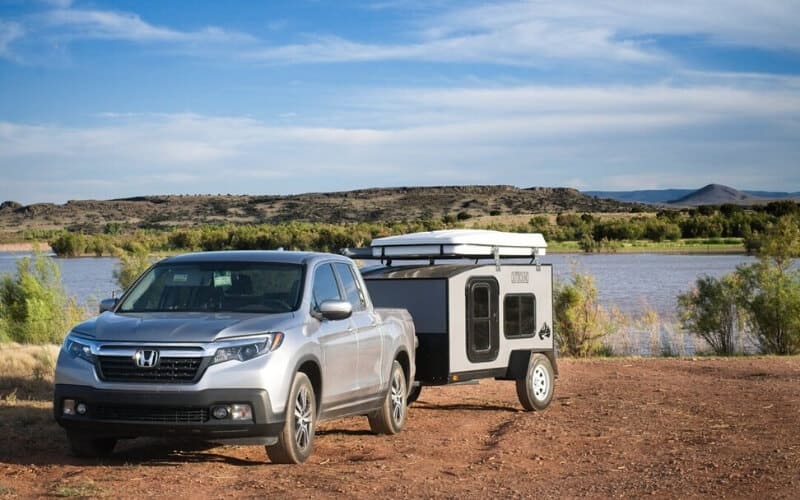
Average Travel Trailer Weight: How Much Does A Camper Weigh?
- Last Updated: May 24, 2024
- 10 minutes read
The weight of your travel trailer is an important consideration, since it determines which SUVs and trucks can safely haul the camper, how the trailer maneuvers on the road, gas mileage, and more.
There are lots of different types of travel trailers, ranging in style and size.
On average, how much does a camper weigh before you’ve packed it with your gear and belongings?
Depending on size, campers may vary greatly with regard to weight. Your camper could weigh as little as 500 pounds or more than 20,000 pounds. On the smaller end, teardrop trailers have a dry weight of about 1,500 pounds, and on the larger end, fifth wheel trailers have an average dry weight of around 15,000 pounds.
In this post, I’ve researched a lot of campers to help you get an idea for the different types of camper weights, understand why weight matters, how to manage weight in your camper, and more.
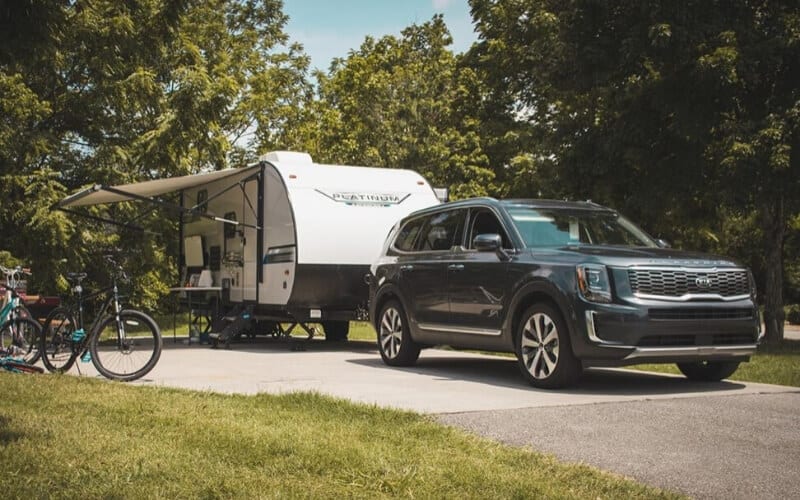
IN THIS ARTICLE
Different Kinds of Camper Weight Specifications
Travel trailers don’t just have a single weight. Keep in mind, your gear, supplies, water and fuel all add to the weight of the vehicle.
When looking at the weight specifications for your camper, there are three different areas to look at:
- Dry Weight (also known as ‘Empty Weight’ or ‘Unloaded Weight’) is the weight of the camper before you’ve loaded in your cooking gas, fresh water, or belongings.
- Cargo Carrying Capacity (CCC) is the total weight capacity for cargo, on top of the dry weight. For safety on the road, don’t load more than the rated CCC.
- Gross Vehicle Weight Rating (GVWR) is the total overall maximum weight that your camper can handle, including fluids and cargo. When considering your tow vehicle’s towing weight capacity, the GVWR is something you’ll want to pay particular attention to.
How Much Does A Travel Trailer Weigh?
The average weight of your travel trailer will vary depending on the type of trailer you have and how long it is.
Larger and longer campers tend to be heavier, while teardrop and pop-up campers are on the lighter end of the scale.
Most campers have an average dry (unloaded) weight of 2,550 to 6,600 pounds, and an average GVWR of 3,200 to 8,400 pounds.
Here are a few examples of popular types of campers and how much they weigh:
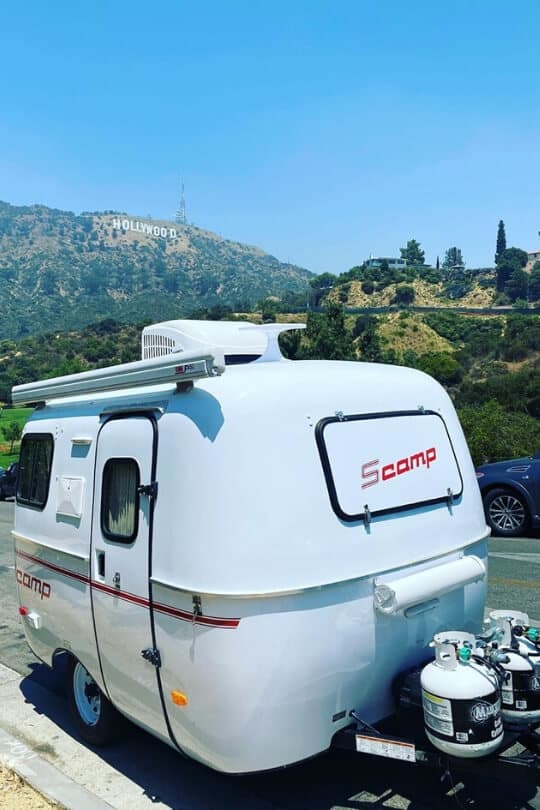
Why Does Weight Matter in a Camper?
The lighter your trailer, the better. The overall weight of your travel trailer matters for a few different reasons, including:
Your towing vehicle only has a certain capacity for towing a camper safely. You can’t just hook up any SUV to the trailer tow hitch and expect to hit the road.
Before you buy a camper, you should find out the towing capacity of your vehicle to make sure you can safely pull the trailer.
A heavier camper is also harder to tow the closer it gets to your towing vehicle’s towing capacity. You don’t want your camper to sway too much as it moves down the road or worse, to tip over as you go around a curve or make a turn.
Cargo Weight
If you’re hitting the road with your dune buggy and other heavy adventure cargo, your trailer’s cargo weight limits must be considered.
You might want to consider a toy hauler, since these trailers have a higher CCC to accommodate sports vehicles.
Just remember that your towing vehicle needs to be stronger in order to handle the extra weight of the camper itself as well as your adventure vehicles.
Fuel Efficiency
The heavier your camper and cargo, the lower your fuel efficiency and gas mileage will be.
A heavier travel trailer that’s loaded with gear will make for a more expensive road trip than a small, lightweight camper , so you’ll need to take this into account as you budget for your trip.
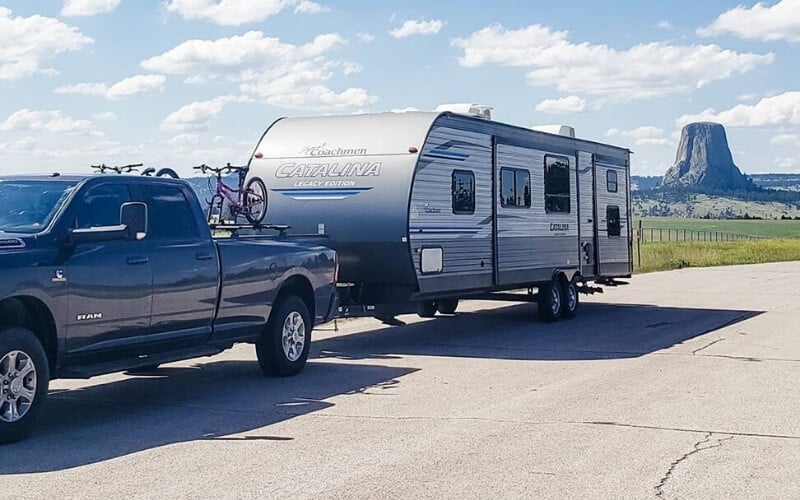
Top Things That Add Weight to Your Camper
As you can see, there’s a lot that goes into the weight of your travel trailer, beyond just the camper, itself.
Unless you’re traveling in a toy hauler and bringing along your adventure vehicle(s), your belongings and supplies probably won’t weigh more than a few hundred pounds, but there are some things that do add significant weight to your camper.
It’s important to keep these things in mind, so that you can keep your traveling weight below the specified GVWR and travel more safely.
Some of the heavier items that add weight to your travel trailer include:
Construction Materials
RV and camper manufacturers tend to build with lighter weight materials, especially in newer vehicles.
However, there are some modern trailers (such as Airstream travel trailers) that weigh more because they are built with heavier construction materials as part of their design and brand.
While Airstream trailers have an aluminum exterior, most travel trailers are built with fiberglass to make them more lightweight.
Interior fixtures and furniture also contribute to the vehicle’s weight, and more luxurious, residential-style construction may weigh more.
Construction materials and the interior furniture and fixtures are all included in your camper’s dry weight, but it’s a good thing to keep in mind before you buy a camper.
If you have a smaller SUV or towing vehicle with less capacity for hauling, you’ll need a lighter trailer, and therefore, one built with more lightweight materials.
Another heavy feature that’s included in dry weight but still needs to be considered is slide-outs, if your camper has them.
Although slide-outs have the benefit of creating more interior space when you’re parked, the heavy duty construction they require for stability will increase the overall weight of your trailer.
A single slide-out can add around 1,000 pounds to your camper’s dry weight.
Alternatively, if you need more interior space but still need a more lightweight trailer, you might consider models with a pop-up top.
Pop-ups can create a second level sleeping area or increase the headroom in your camper when you are parked, and don’t weigh nearly as much as a slide-out.
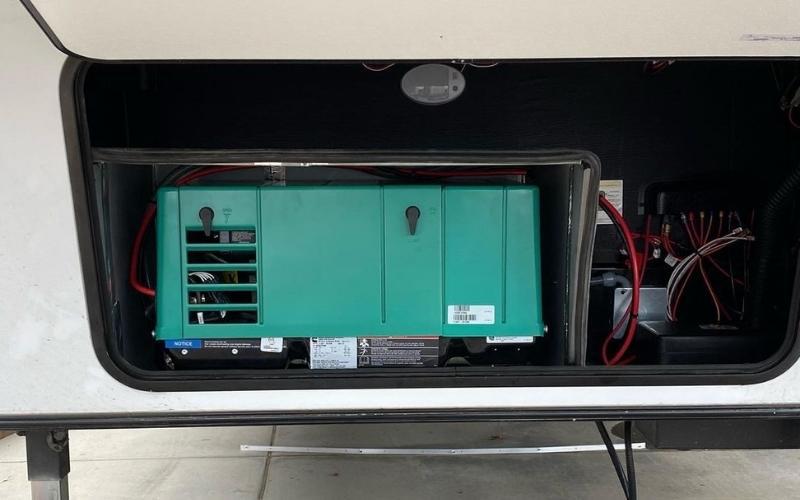
Generators & A/C Units
Many modern campers come equipped with generators and air conditioning units, but not all of them do.
If your trailer came with a generator and A/C unit(s), the weight of these systems and their fluids is included in the camper’s dry weight.
However, if you or a previous owner added the system, it’s not included and will need to be deducted from your available cargo carrying capacity.
In general, a portable generator weighs around 300 to 400 pounds, and each A/C unit weighs around 100 pounds. The higher the wattage, the more the system will weigh.
Water & Fuel
A heavy item that doesn’t count in your camper’s dry or unloaded weight specification is water.
Fuel and water are pretty heavy, and water is especially so, weighing nearly 8 pounds per gallon.
If your camper has a tank that accommodates 100 gallons of fresh water , you may be tempted to fill it up to the brim before a camping trip, but this could increase your cargo weight around 800 pounds!
If you’ll be camped at a campground with hookups, consider only filling up a few gallons before hitting the road to cut back on your vehicle’s water weight during travel.
Fuel for cooking (and/or heating) can also be heavy, but it’s a lot lighter than water and since campgrounds don’t have propane hookups, it’s more necessary to bring the full amount needed for your trip.
How to Efficiently Manage Weight in Your Camper
There are a few things you can do to keep your camper as lightweight as possible both while on the move and when parked in your campsite:
Make sure the weight is distributed evenly
Most camper manufacturers lay out the interior of each camper so as to evenly place heavier items and keep the dry weight distributed throughout.
As you pack your trailer, you’ll want to keep weight distribution in mind to avoid having your camper swerve or lean as you move down the road.
Get a good weight distribution system, and weigh the camper hooked up to your towing vehicle and disconnected from the towing rig in order to test the weight distribution.
Don’t travel with too many people
Consult your camper’s manufacturer’s manual for the maximum passenger count for your trailer.
Allowing more people in your camper won’t affect the weight distribution when you are traveling, since all passengers must ride in the towing vehicle, but even when parked, overcrowding your trailer can impact the weight distribution system negatively.
Even one person extra person weighing 150 pounds can make a difference, so stick to the maximum limit your camper’s manufacturer recommends.
Don’t over-pack, and get rid of the extras
There are some things that are a good idea to bring along, even if you don’t end up needing them such as safety equipment, a spare tire, and the tools to change it.
However, there are probably lots of other things that you just don’t need, such as extra personal belongings, kitchen items, full-sized toiletries , and spare tools.
Pack only what is absolutely necessary for your trip and the activities you’ll be doing, plus safety equipment just in case you break down or get stuck.
Don’t forget to check the exterior of your camper, and remove things you hardly ever use or don’t need for your trip.
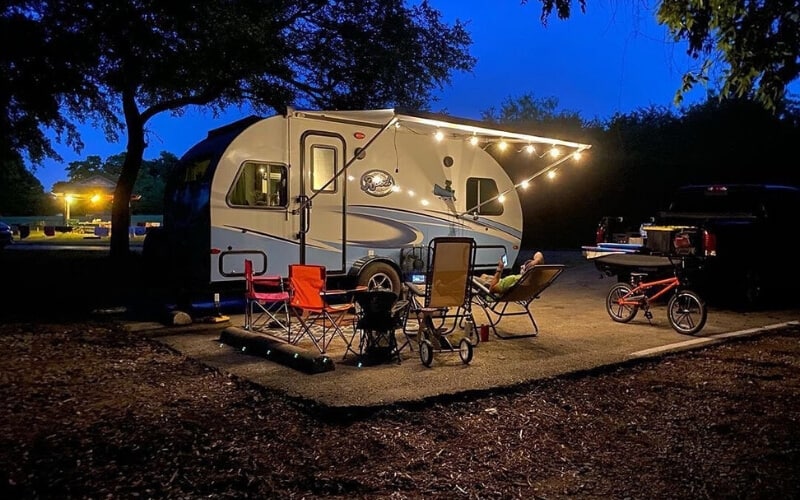
Keep your tires properly inflated
If your tires don’t have the correct tire pressure, a heavy trailer could cause you to have a flat or cause damage to the wheels and axels.
Before you leave on your trip, check the pressure on each tire to make sure it’s inflated properly.
Switch out any pocket or sliding doors for curtains
Many campers have sliding doors or pocket doors for the bedroom(s) or bunkroom, and these add weight.
You probably want some kind of covering for privacy, but you can switch them out for a more lightweight alternative such as a curtain.
You don’t even have to sew your own – although you certainly can – just buy a single panel drape or curtain for less than $20 at your local big box store such as Walmart or Target.
Replace old or damaged items with more lightweight pieces
If your furniture, storage compartments, counters or other fixed pieces are old or break, you can replace them with a lighter alternative or material.
IKEA has some excellent lightweight storage and furniture options that work great in a camper setup, and don’t cost a lot.
Use aluminum whenever you make repairs
If you need to patch any holes or fill any cracks in your camper, always use aluminum or other lightweight materials to keep your trailer’s weight down.
A Summary About Camper Weight
As I’ve discussed, your camper’s weight can vary a lot depending on the type and size of trailer you have.
Now that you know the average based on trailer style and length, you can find the right camper that has an appropriate weight for your towing vehicle and camping style.
Weight is definitely an important consideration when you’re camping and when you’re traveling with a camper, but there are some things you can do to keep it lighter and make traveling easier.
I hope the tips I noted will help you enjoy your trip, without having to worry about weight too much.
About Author / Aaron Richardson
Aaron Richardson is an expert RVer and the co-founder of RVing Know How. Aaron, along with his wife Evelyn, has been living and traveling in their Keystone Fuzion RV since 2017. Their adventures span across the country and beyond, including memorable RVing experiences in Mexico. Aaron's passion for the outdoors and RVing shines through in his writings, where he shares a blend of travel stories, practical tips, and insights to enhance the RV lifestyle.
![The 5 Best RV Microwave Convection Ovens To Buy In [currentyear] 12 Best RV Microwave Convection Oven](https://www.rvingknowhow.com/wp-content/uploads/2020/07/Best-RV-Microwave-Convection-Oven-150x150.jpg)
The 5 Best RV Microwave Convection Ovens To Buy In 2024
The 5 best rv waxes for fiberglass surface.

You Might Also Like
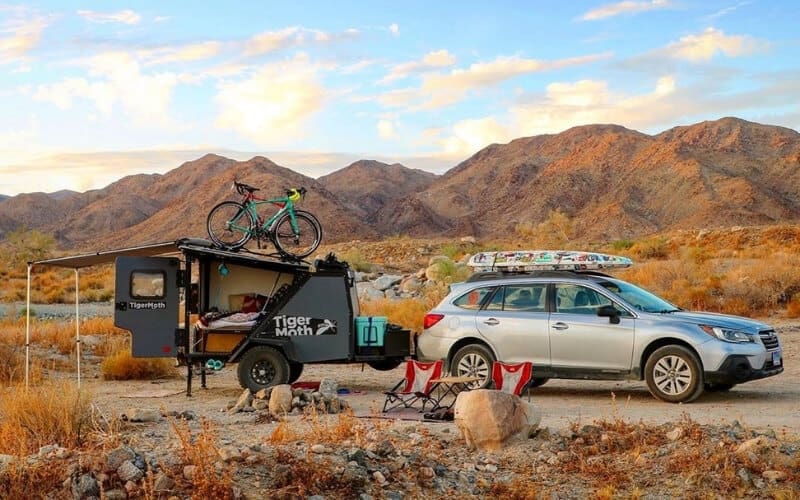
Top 5 Off Road Pop Up Campers That Can Handle Any Terrain
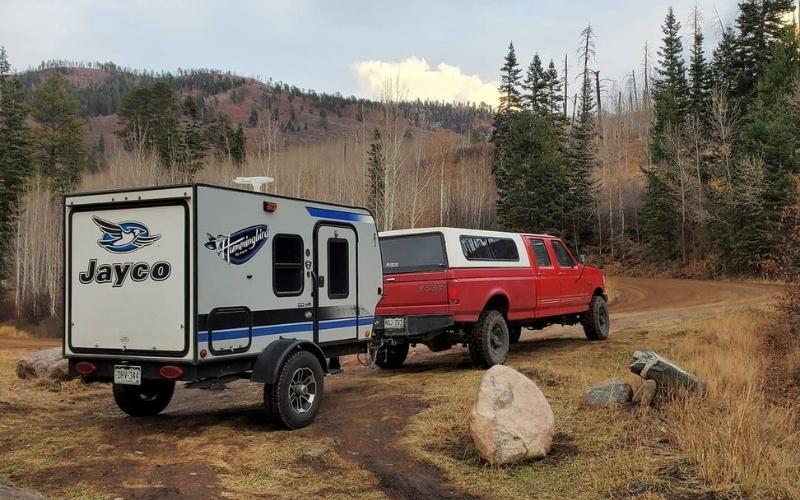
8 Ultra-Lightweight Camper Trailers Under 1,500 Lbs
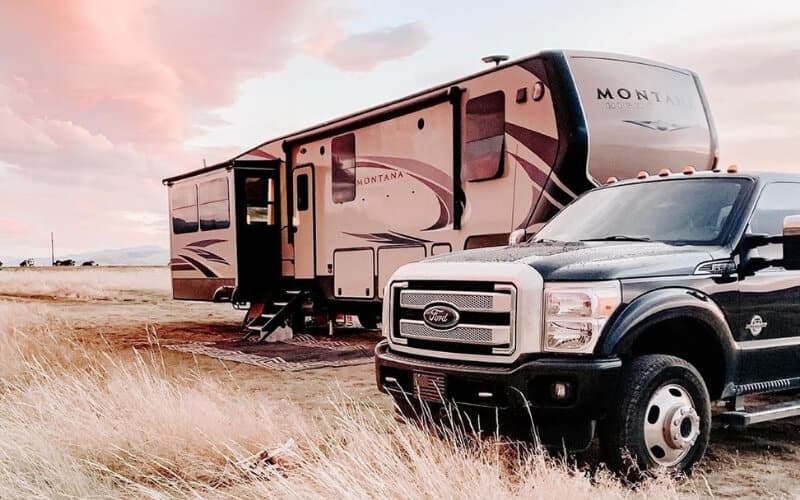
8 Great Fifth Wheel Floor Plans With Front Living Rooms
Start typing and press Enter to search

- You are here:
- Home »
- Blog »
- » How Much Does a Travel Trailer Weigh?
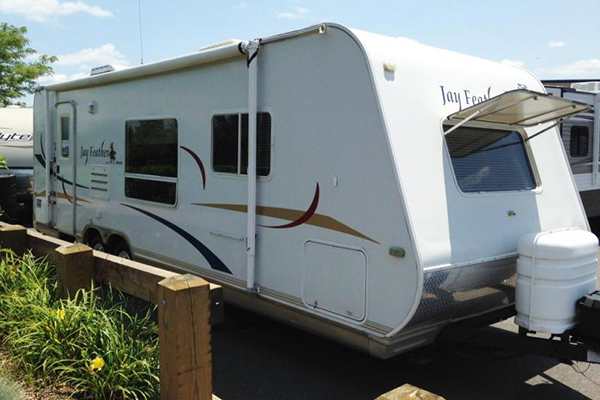
How Much Does a Travel Trailer Weigh?
- November 22, 2018 /
- RVing 101 /
- By R. Geraldi
The most common scenario in which people ask how much travel trailers weigh is when they are trying to figure out whether their car can tow one. And they’re usually looking for a quick answer. So to make a long story short — the average weight of a travel trailer is around 5,200 lbs.
If only the answer were that simple.
Namely, we should keep in mind that this number refers to dry weight, and it can vary significantly. In fact, we can expect to add about 1,500 lbs in additional weight. Basically, the final weight of our travel trailer will depend on a number of things.
Indeed, there’s much more to determining travel trailer weight than fits in a single paragraph. That’s why we’ve decided to look into all the possible factors that could affect the final number on the truck scale. We’ll discuss everything — the length, understanding weight categories, weighing the trailer, reducing the weight, etc.
We won’t say in advance that this is the ultimate guide to understanding the average weight of a travel trailer. But it should come close to being one. Without further ado, we give you our handbook on travel trailer weight.
Weight Factors In a Travel Trailer
As we have said, our goal is to discuss all the things that affect the overall weight of a travel trailer. Among them are:
Construction materials
Motorized slide-outs.
Hopefully, understanding how much they can add would help us control and limit the weight increase. We’ll discuss them more closely in the following paragraphs.
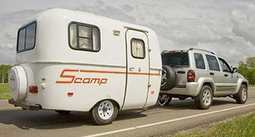
Now, the weight that the construction material brings into the equation technically counts as dry weight. However, knowing how much it actually adds to the overall number might be a good idea.
For instance, a fiberglass travel trailer typically needs aluminum structuring, which is generally lightweight. On the other hand, wood can add up to 900 lbs to the overall weight result.
Although a generator is a must-have on a long camping trip, we can’t ignore the additional weight that it brings to our travel trailer. Namely, the lightest power generators on the market rarely weigh below 300 lbs.
The battery is yet another gear item that we absolutely need in our travel trailer. Usually, it weighs somewhere between 50 and 65 lbs, depending on the size of the vehicle.
Every travel trailer on the market comes with a freshwater tank. On average, that tank can store around 48 gallons of water. If we know that a gallon of water weighs 8lbs, we should add about 400 lbs of extra weight right from the start.
We generally consider slide-outs to be a handy addition to a travel trailer. However, we should keep in mind that a single slide can add an average 800 lbs to the overall weight of our vehicle. On the other hand, pop-outs, the non-motorized version, add an insignificant amount of extra weight and might be a better choice.
Understanding the Travel Trailer Weight Definitions
We understand very well how overwhelming it can be to try and figure out the numbers that the manufacturers provide. Crunching the numbers to determine our weight limit is difficult enough, and salespeople are often of no help whatsoever. So, let’s talk about the important abbreviations.
The Gross Vehicle Weight Rating refers to the maximum weight a recreational vehicle can support. Aside from dry weight, the GVWR includes the weight of the driver and the passengers, as well as the weight of water, fuel, and gear. It is important to note that our towing vehicle and our travel trailer will have two separate GVWRs.
The Gross Axle Weight Rating refers to the maximum load that the RV’s axle can carry. The GAWR depends on the axle, tires, and wheels. It is based on the weakest link, and the manufacturer usually provides the rating.
The Gross Combination Weight Rating is what we need to look at if we want to know the combined rating of our towing vehicle and our RV. Basically, it’s the maximum combined weight limit.
The Unloaded Vehicle Weight stands for the weight of the travel trailer when it’s fully unloaded. So far, we’ve referred to UVW as dry weight. Therefore, we understand that it is, in fact, the weight of the travel trailer without any additional gear on it.
The Net Carrying Capacity refers to the overall weight of things we load onto the travel trailer. It implies the combined weight of the equipment, water, fuel, and food.
The Sleeping Capacity Weight Rating designates the maximum weight limit depending on the number of sleeping positions. It is defined by the manufacturer, and the average individual sleeper weight is set at around 154 lbs.
The Cargo Carrying Capacity defines the weight of the travel trailer without the optional equipment and accessories.
Travel Trailer Bumper Weight Capacity
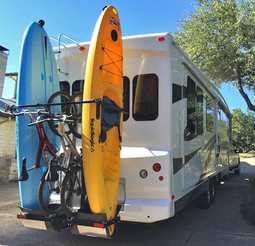
Sometimes, and especially if RVing is a lifestyle for us, we’ll want to attach some extra cargo onto the back of our trailer. For example, many campers love being able to go for a mountain bike ride, so they take their two-wheelers with them on every road trip.
Now, the bikes will obviously not go into the travel trailer. Similarly, we can’t just put them on the top. So, we have to get a hitch and a rack and attach them to the back of our trailer.
But how do we know if our bumper can hold the weight we intend to put on it?
The answer here is quite simple. If we can’t locate a sticker stating the capacity of the bumper, we have to call the manufacturer to get the specs. It is of the utmost importance that we make sure our desired hitch and our bumper are compatible.
Travel Trailer Weight vs. Length
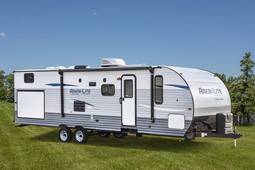
Generally speaking, travel trailer length ranges between 17 and 40 ft. We can say with near certainty that the weight of a trailer is proportional to its length. Simply put, the longer the trailer, the heavier it is.
That, however, is not a rule written in stone. Namely, more recent models are usually made of lighter materials , and that certainly affects the overall weight. Basically, we’d say that the weight of the trailer is inversely proportional to its year of production.
To put what we’ve just said into perspective, let’s examine a few examples.
For instance, there are numerous 16-feet travel trailers with an older manufacture date that weigh between 2,200 and 3,400 lbs. However, more recent models of a similar or same length tip the scales way below those numbers. In fact, we were able to find models that weigh incredible 1,500 lbs.
The length itself, though important, is only a part of the equation. Other factors that affect the weight of a travel trailer are the floor plan , as well as the position of the kitchen, bathroom, windows, and doors. In fact, even the type of furniture and appliances affects the overall number.
Let’s inspect some real-world examples that will, hopefully, help us get an idea of what we should expect. However, we need to keep in mind that the numbers below refer exclusively to dry weight.
Small Travel Trailers Weight
- Forest River Flagstaff E-Pro 12RK — 11 ft; 1,150 lbs
- ALiner Ascape ST — 13 ft; 1,575 lbs
- Forest River Flagstaff E-Pro 14FK — 14 ft; 1,495 lbs
- KZ Sportsmen Classic 150BH — 17 ft; 2,260 lbs
- Jayco Hummingbird 16FD — 18 ft; 2,535 lbs
- Jayco Hummingbird 16MRB — 19 ft; 2,780 lbs
- KZ Sportsmen Classic 180BH — 20 ft; 2,620 lbs
- Forest River Flagstaff E-Pro 19FD — 20 ft; 2,825 lbs
Longer Travel Trailers Weight
25 ft travel trailer weight.
- Keystone RV Passport 2200RBWE Grand — 3805 lbs
- Keystone RV Passport 234QBWE Express — 3870 lbs
- Keystone RV Passport 239ML Express — 4140 lbs
30 and 31 ft Travel Trailer Weight
- Keystone RV Passport 2670BH Grand Touring — 30 ft; 5344 lbs
- Prime Time RV LaCrosse 2911RB — 31 ft; 6516 lbs
35 and 36 ft Travel Trailer Weight
- Forest River RV Flagstaff Classic Super Lite 831CLBSS — 35 ft; 8105 lbs
- Forest River RV Flagstaff Classic Super Lite 832FLBS — 35 ft; 8621 lbs
- Prime Time RV LaCrosse 318BHS — 36 ft; 8022 lbs
Popular Travel Trailer Weight Examples
Travel trailers weighing less than 1500 lbs.
- The Little Guy Trailers MeerKat — 900 lbs
- The Tiny Camper Company Stand Up Spam — 980 lbs
- The Relic — 1,000 lbs
- Weiscraft Little Joe — 1,100 lbs
- Forest River Rockwood Geo Pro 12RK — 1,164 lbs
- Riverside Retro 509 Jr — 1,180 lbs
- Rustic Trail Teardrops Polar Bear — 1,365 lbs
Travel trailers weighing less than 2000 lbs
- Forest River Flagstaff E-Pro 12RK — 1,133 lbs
- Jayco Hummingbird 10RK — 1,545 lbs
- Forest River Rockwood Geo Pro 12SRK — 1,763 lbs
- Riverside Retro 155XL — 1,937 lbs
- Palomino PaloMini 132FD — 1,979 lbs
Travel trailers weighing under 3500 lbs
- Forest River Rockwood Geo Pro 14FK — 2,259 lbs
- Jayco Hummingbird 16MRB — 2,780 lbs
- Palomino PaloMini 177BH — 2,842 lbs
- Forest River Flagstaff E-Pro 16BH — 2,874 lbs
- Forest River Flagstaff E-Pro 17PR — 3,161 lbs
- Keystone Passport 175BH Express — 3,255 lbs
Travel trailers weighing less than 5000 lbs
- Keystone Passport 195RB Express — 3,805 lbs
- Keystone Passport 234QBWE Express — 3,872 lbs
- Clipper Ultra-Lite 21BH — 4,069 lbs
- Clipper Ultra-Lite 21FQS — 4,576 lbs
- Gulf Stream Vista Cruiser 23BHS — 4,253 lbs
How Much Does a Fifth-Wheel Travel Trailer Weigh?
The answer to this question, we fear, is not a simple one either. The weight of a fifth-wheel trailer can vary anywhere from 7,000 to 20,000 lbs. To make things easier, manufacturers have split the fifth-wheels into three categories:
- Lightweight
Let’s see how much they weigh on average.
Lightweight Fifth-Wheel Travel Trailers
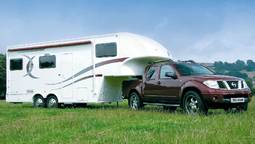
A fifth-wheel travel trailer that falls under this category can’t be more than 34 ft in length , and it can’t weigh more than 9,000 lbs . People who see camping as a leisure activity usually opt for these travel trailers, as they don’t take up too much space.
The most popular lightweight fifth-wheel models on the market are:
- Scamp 19’ Deluxe — 19 ft; 2,400 – 2,900 lbs (depending on the floor plan)
- Escape 5.OTA — 21.2 ft; 3,885 lbs
- Jayco Eagle HT 24.5CKTS — 29.5 ft; 7,530 lbs
- Forest River Arctic Wolf 265DBH8 — 31.9 ft; 8,284 lbs
Grand Design Reflection 150 Series 290BH — 34 ft; 8,294 lbs
A half-ton pickup truck is strong enough to pull any of these travel trailers.
Midsize Fifth-Wheel Travel Trailers
The trailers in this category are typically between 33 and 41 ft long, with their average weight ranging anywhere from 10,000 to 14,000 lbs. They are usually the travel trailers of choice for people who go on longer camping trips. Namely, they have a wider array of floor plan options and more varied accessories .
Some of the most popular models include:
- Grand Design Reflection 337RLS — 35.6 ft; 10,570 lbs
- Heartland Pioneer — 39.8 ft; 11,010 lbs
- Keystone Montana 3720RL — 39.7 ft; 13,329 lbs
When it comes to the towing vehicle that can handle these travel trailers, it’s safe to say that a three-quarter-of-a-ton to a one-ton truck would do the job.
Full-Size Fifth-Wheel Travel Trailers
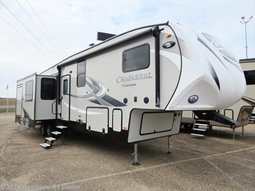
Campers who like to travel in comfort and luxury usually opt for the full-size fifth-wheels. Since they’re on the road most of the time, they’re not concerned with the fact that these trailers take up anywhere between 35 and 45 ft in length. When it comes to the weight limit, these luxury monsters usually weigh between 11,000 and 20,000 lbs.
The most prominent models at the moment are:
- Redwood RW390/3901MB — 40.2 ft; 14,510 lbs
- KZ Durango Gold G385FLF — 42.4 ft; 12,860 lbs
- Jayco Pinnacle 38REFS — 42.8 ft; 13,685 lbs
- DVR Luxury Suite 44 Memphis — 44.2 ft; 19,800 lbs
A vehicle lighter than a ton wouldn’t be able to move a full-size fifth-wheel travel trailer. In fact, manufacturers often recommend something with a diesel engine as a towing vehicle.
How to Find Travel Trailer Weight
Obviously, when we’re purchasing a travel trailer, we want to know its weight in order to match it to the towing capacity of our vehicle. People often wonder where they can find the weight information , and the answer is, in fact, quite simple.
There are three typical locations on a travel trailer where we should be able to find weight stickers:
- On the outside, front left-hand side of the trailer
- On the inside of the door
- Inside the travel trailer, usually on the inside of one of the cabinet doors
If we’re unable to locate the stickers ourselves, it’s best to talk to the salesperson before making a decision.
Best Way to Weigh a Travel Trailer
Unfortunately, years of experience have shown that we can’t entirely rely on the numbers we read in the brochures. Namely, manufacturers tend to be optimistic in terms of GVWR, which is a problem. They often fail to think about how much weight generators, batteries, etc. add to the trailer.
So the safest way to know exactly how much stuff we can load onto our trailer and how many passengers we can take is to measure it . Most often, people do this by driving their travel trailer to a local commercial weigh station, fully loaded and with passengers on board. When we say “fully loaded,” we mean food, water, camping gear, sleeping bags — everything that we want to bring along on the trip.
How to Weigh a Travel Trailer on the CAT Scale

Once at the weigh station, it is incredibly important that we follow the instructions we get from the staff.
We will first have to weigh the truck and the travel trailer with the weight distributing hitch hooked. During the weighing, it’s important that the truck’s steer axle is on the first measuring pad. Conversely, the rear axle should be on the second pad, while the axle of the trailer should be on the third pad.
Once the first weighing is done, we need to pull the trailer off the scale and remove the weight distributing hitch.
Then, we should weigh the truck and the trailer without the hitch hooked up. The hitch bars should, however, remain in the bed of the truck.
Once we’re done with the second weighing, it’s time to weigh the truck only. Needless to say, the travel trailer should not be on the scale.
It is important to note that during all three weighings, there should be no changes. Namely, the passengers need to sit still and no one should move anything around the trailer. That is the only way to get a realistic result.
In case some or all of our passengers are not available to participate in the weighing, we have to ask them to weigh separately. That way, we can simply add their body weight to the overall result we get.
A great thing about weighing the travel trailer on a CAT scale is that it is not only accurate but also cost-efficient. Most of the time, it costs about $10 for the initial weighing, while the reweighing is approximately $2.
Where Can I Get My Travel Trailer Weighed?
Commercial weigh stations are relatively easy to find. We should be able to find one in any town throughout the country.
Most often, truck stops, as well as moving and storage companies, offer the service of weighing trucks and travel trailers. In case they don’t, they would at least tell us where we should look next.
If all else fails, we could always check the local phonebook and its yellow pages.
How to Calculate the Travel Trailer Tongue Weight
Knowing how much our travel trailer weighs, as well as what our vehicle’s towing capacity is, is not enough. In order to safely tow a travel trailer, we ought to understand what its tongue weight is. Furthermore, we should learn how to calculate and adjust it.
Simply put, tongue weight is the downward force exerted from the trailer’s tongue onto the towing hitch. Basically, it allows us to control the trailer when towing it.
According to the industrial standards , tongue weight could range anywhere between 9% and 14% of the gross travel weight (GTW). Miscalculating it could pose a serious threat to the safety of the driver and the passengers. Namely, underestimating tongue weight could lead to trailer sway, which could, in turn, lead to a traffic accident.
While roughly calculating the tongue weight based on the percentage and GTW could give us a close enough number, we might want to double-check. For more precise results, we could try the following measuring methods:
- A tongue weight scale
- A bathroom scale (in case our trailer is lighter than 3,000 lbs)
- Visiting a commercial weigh station
How to Reduce the Travel Trailer Hitch Weight
Reducing the hitch weight can be tricky, but it is nevertheless doable. Again, we need to pay close attention to proper weight distribution. However, we also need to keep in mind that the initial weight of the hitch will depend on its design.
The safest way would be to use a Weight Distribution Hitch System. Namely, it will help distribute the load to all axles evenly, which will improve the overall control over the towing vehicle and the travel trailer.
Proper Travel Trailer Weight Distribution and Sway Control
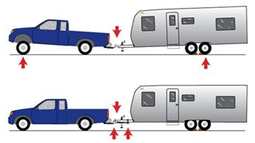
Proper Weight Distribution
We’ve already mentioned that an unevenly distributed weight in a travel trailer is dangerous. We need to do everything we can to avoid its negative impact both on the towing hitch and the trailer. Also, we need to make sure that the extra weight we add to the trailer doesn’t exceed the GVWR and GCVW.
The best way to do so is to properly distribute the additional weight front to back , along both the left and the right side of the trailer. That means that we should ensure that the heaviest pieces of our equipment, as well as the majority of our food and water supplies, are all placed as up front and close to the driver as possible.
If there could be any good news to improperly distributing additional weight in our trailer, it’s that it is usually visible to the naked eye. It’s quite similar to seeing a car in which one of the passengers is overweight — the whole vehicle tilts to one side. Why is this a good thing? Because we can easily fix things that we can see.
Generally speaking, most manufacturers provide an original design for proper weight distribution, so it’s best if we stick to it.
Sway Control
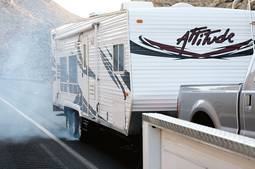
There’s hardly an RVer out there who can say that travel trailer sway is not a terrifying thing. Losing control while towing can lead to tipping at best. In worst case scenarios, serious accidents are often a consequence of trailer sway.
There are several things that cause travel trailer sway:
- Crosswinds and drafts from larger passing vehicles
- Drafts from going downhill while using an incorrect braking method
- Issues with weight and balance
Although the front of nearly every trailer is aerodynamic, the fact is that the sides aren’t. Crosswinds of 35 mph can exert around 3,440 lbs of force on the side of a trailer, causing it to sway or tip over.
While we can’t really control the winds, we can control the weight distribution, and we have discussed that already. By making sure that all the h eavy equipment is resting on the hitch of the towing vehicle , we minimize the risk of the trailer swaying.
Tips to Reduce the Weight on Our Travel Trailer
It often happens that people pack their travel trailers and take them to the weigh station only to realize that they’ve maxed out on the allowed weight limit. In such cases, we need to be objective and perform an audit of the current situation in our trailer.
Getting Rid of Extra Stuff
Namely, we need to determine whether we really need everything we’ve loaded onto the trailer. Regardless of how we feel about it, we need to get rid of any extra tools, equipment or personal belongings that we deem unnecessary. Things like unused kitchen utensils, shoes, and clothes we’re not wearing, books we’re not reading — it all has to go.
Replacing RV Window Treatments
Much as we love our cool window treatments, the truth of the matter is that they’re adding extra weight to the trailer. So they have to go. Instead, we can use shades or roller window blinds.
Installing a Compost Toilet
Another great way to eliminate some extra weight is to get rid of our regular toilet and replace it with a compost one. Namely, the black tank holds a lot of liquid weight. What’s more, a regular toilet needs a lot of extra water in order to operate.
On the other hand, a compost toilet is incredibly lightweight even when it’s full.
Removing unnecessary cabinets, shelves, and drawers
Though this might seem a tad too extreme, it’s actually a great solution if we can’t decide which belongings to get rid of. We can take them out and replace them with lightweight plastic bins.
Getting rid of unnecessary exterior items
If we’ve been using the same travel trailer for years, we’ve certainly piled up a lot of stuff both in its interior and on its exterior.
For example, there is a great chance we have an old awning that we haven’t used in years. What’s the point in keeping it, then?
Similarly, we can get rid of other redundant things, such as an old satellite dish or the air conditioning unit that is simply too big.
Using aluminum for all repairs
Years of RVing are bound to result with an occasional hole in our travel trailer. When they do, we need to be wise. Using aluminum for repairs is a good idea for two reasons:
- It’s durable.
- It’s lightweight.
It’s easy to obtain flat sheets of aluminum, and any kind of structural repair should go incredibly smoothly with it.
Final Thoughts
This article has made it painfully clear that there is a multitude of factors we should pay attention to when figuring out the weight of our travel trailer. In fact, at times, it might seem like the whole thing is way too complicated for an inexperienced enthusiast.
However, we believe that the challenge of determining how much our travel trailer weighs is nothing compared to the joy we’ll feel while on the road with our family or friends. So let’s sum this all up.
An average travel trailer weighs approximately 5,200 lbs in dry weight. However, that number is not fixed, and it will vary a lot.
The weight of a travel trailer will depend on its length, construction materials, our food and fresh water supply, generator, and so on. The list may seem endless, but we need to factor everything in.
In order to determine what we can and can’t take with us, we need to understand the travel trailer weight terminology . That’s why we also used this article to discuss some common abbreviations found in manufacturers’ brochures.
The bottom line is that doing math should not prevent us from having fun on the road. RVing is a lifestyle, and stuff like weighing our travel trailer will become a routine in no time. Until then, we can always go back to this article for help.
Related Posts
Does CarMax Buy RVs? (CarMax RV Trade-In Guide)
300 Lbs Over Payload: What Happens If I Exceed My Payload?
Thor Vegas Problems (Windshield, Battery, Fridge, Swivel Chair)
Leave a Comment:

This post may contain affiliate links or mention our own products, please check out our disclosure policy .
How Much Do Travel Trailers Weigh? [20 Campers Compared]
Published on April 22nd, 2019 by Ray & Tammy Roman This post was updated on October 5th, 2023
Based on our sampling of 20 popular models we estimate the typical travel trailer weight to be 4,384 pounds dry weight and 6,109 pound GVWR (Gross Vehicle Weight Rating). Dry weight means how much the travel trailer weighs without cargo, and all tanks (water, propane, etc.) completely empty. GVWR is the weight you should not exceed once you fill your tanks and add anything else you want to transport inside your camper.
Below is our travel trailer weight comparison table showing 20 of the most popular campers.
Keep in mind that many factors will influence the weight specifications. The longer the camper the heavier it will be. The type of construction will have a significant effect on weight as well as the type of features and appliances inside. Whether or not you have slide outs will affect weight as well.
DON’T MISS OUT ON RV LIVING UPDATES
Sign up for the newsletter today.
Please enter a valid email address.
An error occurred. Please try again later.

Thank you for subscribing to the RV Living newsletter, keep your eye on your inbox for updates.
As stated by Jim over at Camper Report , you can expect on average a camper to weight 250 lbs per foot with tanks filled and your gear. The length does not include hitch length.
Match Your Vehicle Towing Capacity To Your RV Weight
To tow your camper you need to have a vehicle with the right towing capacity. For example, a Toyota Tacoma with a V6 engine and towing package can easily tow a maximum of 6,400 pounds, A Ford F150 can tow up to 8,000 pounds with a towing package.
Most large SUVs can also tow a small travel trailer. The Chevy Tahoe, Ford Expedition and Jeep Grand Cherokee are just three of the ones that can tow a camper pretty well.
In some instances, even a car can tow a travel trailer. However, the travel trailer has to be pretty light. The Happier Campe r is one such camper that can be towed by a car.
Travel Trailer Weight Definitions
When comparing travel trailer weigh you are going to come across several terms that I have defined below.
Dry Weight aka UVW (Unloaded Vehicle Weight) – This weight refers to the weight of the camper as it is shipped from the factory. The UVW does not include any dealer-installed options, cargo, fresh water or LP gas.
Cargo Carrying Capacity aka CCC – To arrive at the Cargo Carrying Capacity you need to subtract UVW, the weight of potable water, including any in the hot water heater, full LP tank weight, and sleep capacity weight rating (154 lbs x number of sleeping positions) from the GVWR. Don’t forget to also subtract any dealer-added options.
Gross Vehicle Weight Rating (GVWR) – This is the maximum weight you should not exceed with cargo, full tanks, UVW, and sleeping capacity weight rating combined. Exceeding this weight limit can potentially void your warranty.
Tongue Weight aka Vertical Load Rating – This is the maximum vertical load that your hitch can carry. Before you start to tow make sure you measure your tongue weight. If it exceeds the weight limit consider moving content toward the rear of the trailer. The opposite is also true. If the tongue load is less than the limit move content forward.
Sleeping Capacity Weight Rating (SCWR ) – This one is new to me as I have never seen it before. To calculate SCWR multiply the number of manufacturers designated sleep positions times 143 pounds.
How Much Do Travel Trailers Weigh? – Related Questions
How much does a pop up camper weigh?
Pop up campers can vary significantly in weight depending on features. For example, a pop-up camper with a kitchen and fridge can weigh as much as 2,000 pounds, whereas a pop up with minimal features can weight around 500-600 pounds empty. Overall you can expect anywhere from 700 pounds to 3,800 pounds depending on box length and features.
How much does a Jayco Pop up camper weigh?
Jayco has one model of pop up campers called the Jay Sport. It weighs from 1,570 pounds dry to 1,895 pounds dry depending on the floor plan. The GVWR for the Jay Sport ranges from 2,250 pounds to 2,750 pounds.
How much do vintage travel trailers weigh?
An example of a vintage travel trailer weight is the 19645 Safeway. IT weights partially loaded 2,320 pounds. This is a 13-foot cabin travel trailer. You can expect a range of 150-200 pounds per foot length of the cabin only.
How much does a 16 foot travel trailer weight?
On average a 16-foot camper may weight 2,000 to 3,500 pounds. Why such a huge range? The weight of the camper is going to vary widely by brand, floor plan, type of construction, slide outs, interior appliances, and construction and dealer-added options.
As you can see by the examples above the weight of a camper can vary significantly. There isn’t one answer that fits all. The same length travel trailer will have different weights depending on how each manufacturer constructs their unit. Materials used (aluminum, fiberglass) will have a huge impact on weight. Interior furniture, appliances, and interior layout will also affect weight.
The most accurate way to determine the Gross Vehicle Weight of your camper is to fill all tanks, add your gear and supplies and take it to a truck scale. There you will quickly learn how much your travel trailer weighs.
Here is a list of 10 campers that we consider some of the best travel trailers that weigh less than 4,000 pounds . If you’re looking for camper trailers under $10,000 check out the 13 Cheapest Camper Trailer .
If you enjoyed this post Please Share:
Related posts:.

The Best Trailer Tow Vehicle (That’s Not a Truck)

What is the Life Expectancy of a Travel Trailer?
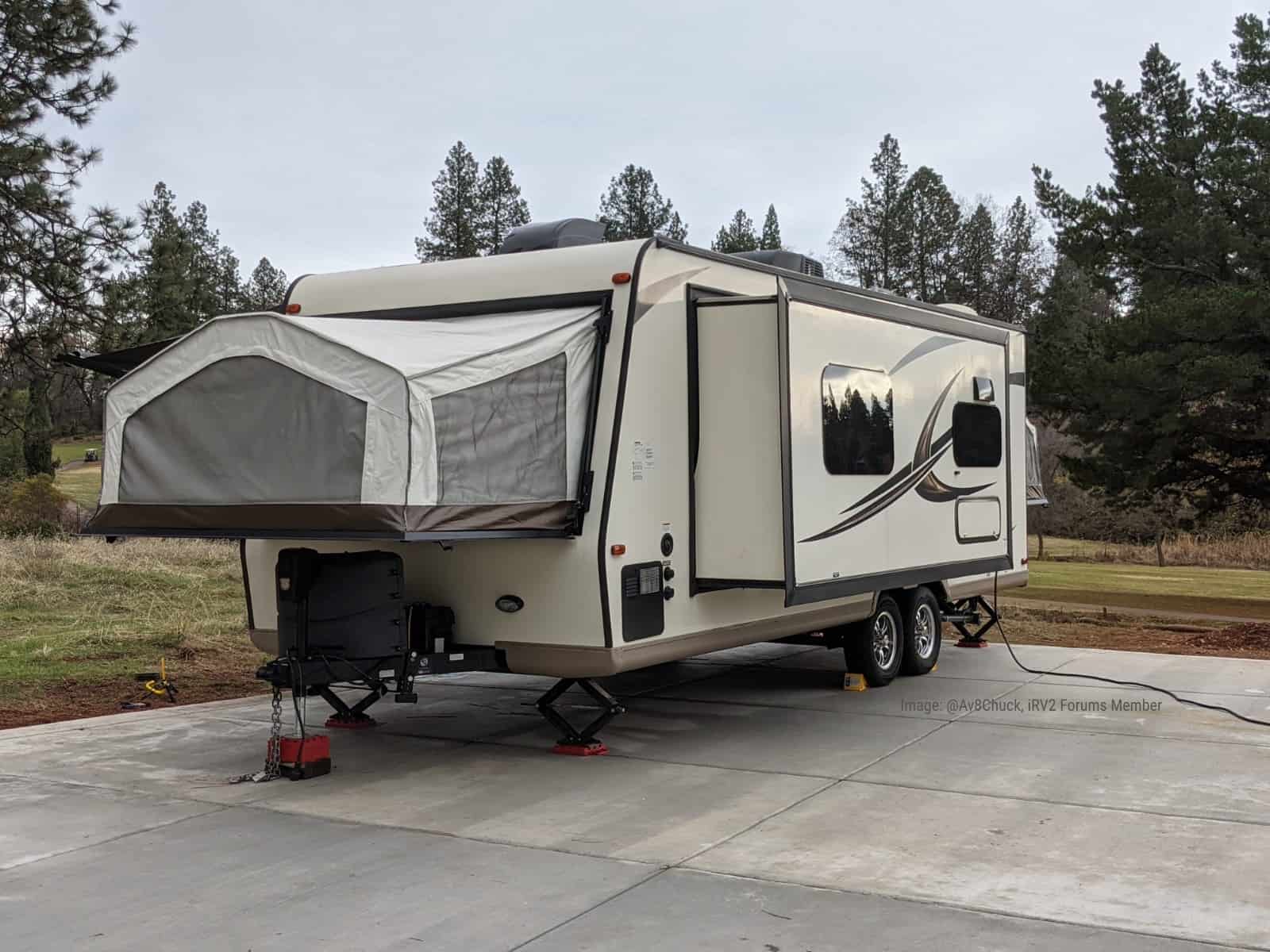
Expandable Travel Trailers: Why Hybrid Travel Trailers a Great Choice
About the author:.

Ask The RV Engineer
How much do campers (actually) weigh (2021 with examples).
So, how much do campers really weigh? Here’s the short answer:
- The average camper trailer weighs around 5,900 pounds and is about 26 feet long. This includes the weight of the travel trailer without any gear or filled tanks.
- Expect to add about 200 pounds of cargo per person and 300 pounds of fresh water.
I calculated this information after surveying more than 200 travel trailers, across 21 product lines, and a dozen manufacturers! This data was gleaned directly from 2020 and 2021 model year specifications from the manufacturers.
Now, obviously, we have much more to discuss:
How long is the average camper trailer? How big of a truck do you need to tow a camper? Does RV construction type affect the weight? Are RV ultra-light packages really 4-season?
Honestly, I’m so excited. I’ve compiled data from 230 campers, and the numbers don’t lie. Let’s dive in.
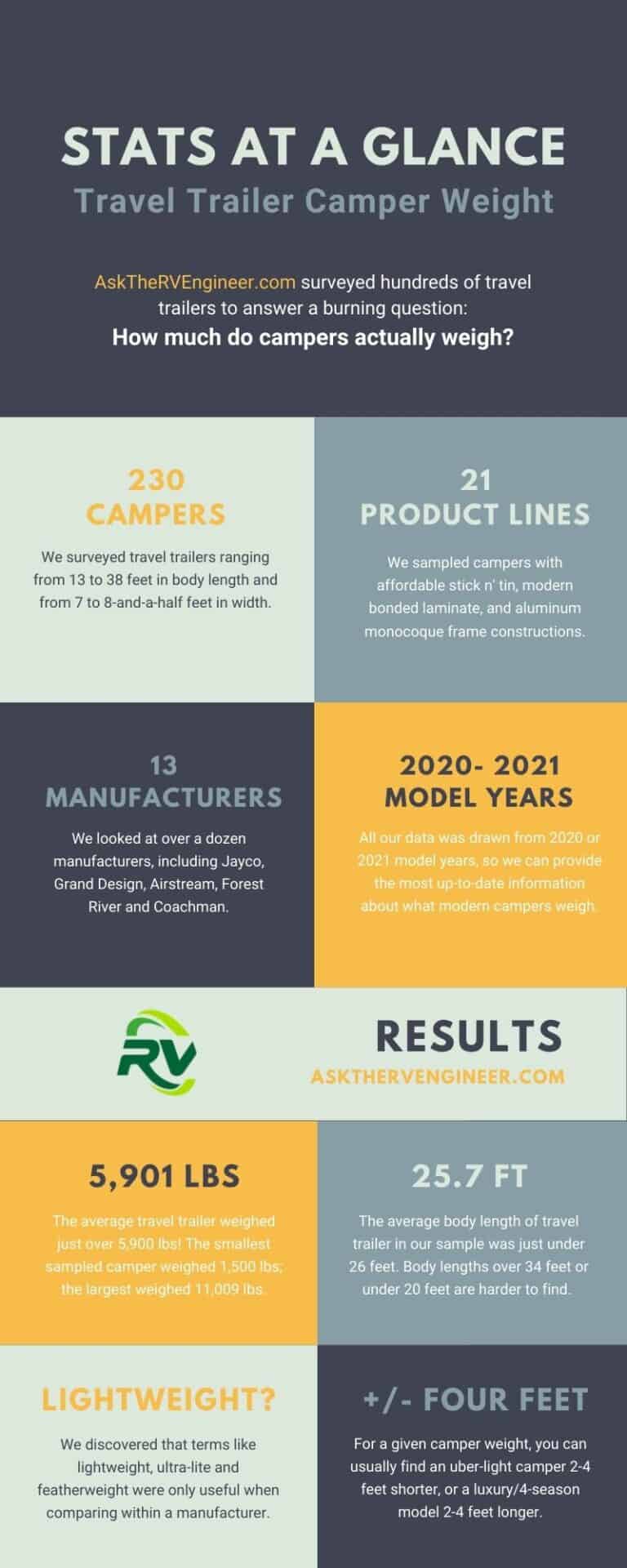
Camper Weight Stats at a Glance
Survey says: The average travel trailer weighs about 5,900 lbs (dry weight) and is 26 feet long (body length).
This is the dry weight of the camper as delivered to the dealership by the factory. This weight includes:
- The camper structure and built-in furniture
- All OEM features and options, such as awnings and mattresses
- Full propane tanks
It does not include water weight. Also, it may not include battery weight or small dealer-installed options, either.
Roughly speaking, most pick-up trucks with a factory towing package capable of towing 7,500 lbs can tow a camper up to 24 feet in total length.
We’ll talk more about trucks and towing later.

Camper Weight Rules of Thumb
As a general rule, you can expect your trailer without gear and water to weigh about 230 pounds per foot of body length.
That’s per foot body length, not hitch-to-bumper, tip-to-tail length.
Also, you can expect to add about 25 pounds of cargo and water per foot of camper body length.
Alternatively, you can estimate cargo weight at about 200 lbs per person. More on that below.
Cargo Weight Rules of Thumb
- A full “20-lb” propane tank should hold about 15 lbs of liquid propane and weigh in total about 38 pounds.
- A gallon of water weighs about 8.3 pounds. Dirty water, especially black water, can weigh quite a bit more.
- A conventional 3,500-kw gas-powered generator weighs about 100 lbs. Smaller, portable inverter generators weigh about 40-50 lbs.
- The average weight of a mountain bike is about 30 lbs.
Without knowing you or your rig, I can’t estimate precisely how much weight you’ll add to your camper.
If you’re the sort of traveler who lives out of a backpack or briefcase, you may only bring about 40-50 lbs per person. That’s about as much as you’d pack for an airplane flight.
If you’re a gear-freak going for a long week in the boondocks, you could pile on 500 pounds per person!
Psst … if you’re debating what to bring along, check out my article about stuff you don’t really need to pack.
Many RVers don’t travel with full tanks, or they only travel with a full fresh water tank. Just remember: If you fill up a 30-gallon freshwater tank, you’ll add 250 lbs to your camper.
But if you leave a campsite with both your holding tanks bursting at the seams, your freshwater tank half-full, six gallons of water in the water heater … well, you get the idea.
As you can see, you really need to weigh your camper. If you’re new to RVing, or just new to your rig, weigh your camper before every trip. Record the data, and you’ll soon learn how much to estimate for your family situation.
P.S. Don’t forget to include the weight of the dog and cat gear as well!
Real-World Camper Weight Examples
Let’s look at a few of the campers I surveyed.
2021 Jayco Flight M-28 BHBE
- Construction: 2×2 wood frame, fiberglass siding, truss ceiling
- UVW/GVWR: 6640/9250 lbs
- Body Length: 30 ft
2021 Grand Design Transcend Xplor 261BH
- Construction: 2×2 wood frame, corrugated siding, truss ceiling
- UVW/GVWR: 6078/7695 lbs
- Body Length: 26 ft
2021 Northwood Arctic Fox 28F
- Construction: thick-wall aluminum, fiberglass siding, 4-season truss ceiling
- UVW/GVWR: 8302/11000 lb
- Body Length: 28 ft
2021 Coachman Freedom Express Ultra Lite 231RBDS
- Construction: laminate wall, fiberglass siding, truss ceiling
- UVW/GVWR: 5072/7500 lb
- Body Length: 24 ft
2021 Forest River R-Pod RP-195
- Construction: laminate wall, fiberglass siding, cage ceiling
- UVW/GVWR: 3587/4762 lb
- Body Length: 18 ft
Note that the 4-season construction and rough-road chassis of the Arctic Fox adds a significant amount of weight!
That’s an important takeaway. There’s no magic design that both reduces weight AND keeps costs down. If you purchase a 4-season camper, be prepared for a weight penalty.
Understanding RV and Camper Weight Numbers
There are multitudes of weight and capacity numbers for RVs! One salesman keeps talking about GVWR; the other mentions dry weight; another shares curb weight information.
It’s confusing, I know. For a full discussion of RV weight terms, check out my RV Glossary.
Here’s an abridged explanation:
Unloaded Vehicle Weight (UVW)
The actual weight of the camper as delivered to the dealership by the factory. It is the weight of the camper itself, with no water or cargo.
Unfortunately, people use a lot of deprecated synonyms for UVW: dry weight, factory weight, empty weight, etc. Really, these should all refer to the UVW.
If you parked an empty camper on a scale, you would measure the UVW.
Gross Vehicle Weight Rating (GVWR)
The maximum allowable weight of the camper with waters filled, gear loaded, etc. The camper is not allowed to ever weigh more than its GVWR!
The difference between GVWR and GVW is that the former is a rating and the latter is a weight measurement.
If you parked a fully loaded camper on a scale, you would measure the GVW, and you should double-check it is less than the GVWR maximum.
Tongue Weight (TW)
Also known as the dry hitch weight, the tongue weight is the actual weight at the trailer tongue ball coupler or tow vehicle ball hitch point.
Usually, the tongue weight should be 10-15% of the UVW.
The manufacturer has the responsibility to design the empty unit so that 10-15% is on the tongue, and the customer has the responsibility to load the cargo so that the 10-15% ratio is maintained.
To measure the actual tongue weight, you can get reeeeeally close by placing the A-frame tongue jack on a scale. The weight at the ball hitch itself will be a few pounds more.
Cargo Carrying Capacity (CCC)
This is the maximum allowable weight of all added cargo, including water tanks, water heater capacity, full tank of propane, and a few other minor items.
CCC is a somewhat new term adopted by the RVIA in 2020. It supersedes an old term, Net Cargo Capacity (NCC), which optimistically overshot the real-world cargo capacity.
Does Construction Type Affect Camper Weight?
I have two answers to this question.
Answer 1: Yes it does! Answer 2: No, it doesn’t.
Now, these answers may sound like oxymorons, but there’s the catch.
4 Main Types of RV Construction
There are four basic RV superstructure types:
- Some manufacturers use an advanced method of stick n’ tin models, relying on residential 2×4 framing and sheathing methods.
- Structural aluminum cage, where a welded aluminum frame supports the weight of the shell and all components.
- Laminate (aka sandwich, composite), where composite panels with a foam core and interior tubing are bonded to a seamless exterior skin. You often see laminate sidewalls and floors.
- Monocoque, w here the skin of the camper shell is also loadbearing. For instance, all molded fiberglass campers – and a few others, like Airstream – have monocoque shells.
You can learn everything else there is to know about my guide to RV sidewall types.
Wood-Framed Wall

Skeleton Aluminum
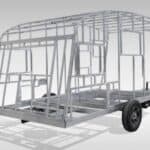
Laminate Wall

There are many distinctions between these four, but those are the basics.
Stick n’ tin construction hasn’t changed much since the 1980s. These campers often have 2×2 wood-framed walls, solid OSB floors, solid wood roof trusses, etc.
The more modern approach takes advantage of the weight savings and superior strength of composite panels. These RV trailers may have vacuum-bonded laminated fiberglass walls, composite floors, and molded fiberglass caps.
Other advanced weight-saving techniques include:
- Chassis frames made from HSLA steel sheet metal
- Foam-cored cabinet doors and poplar-core plywood furniture
- Replacing traditional plywood with Azdel or structural foam plastic products
Why Laminate Construction Doesn’t (Always) Weigh Less
Vacuum-bonded walls and floors do save a lot of weight! But they’re also usually found on medium- and higher-end campers. These are luxury campers. And they often come with extra features, like more storage cabinets, washers and dryers, solid surface countertops, etc.
And guess what? These luxury features add more weight of their own!
So, the real answer is a little more complicated. If you’re shopping for a lightweight trailer, yes, you should look for advanced construction methods. But you have to keep a careful eye on standard features.
Extra-Heavy RV Construction Features
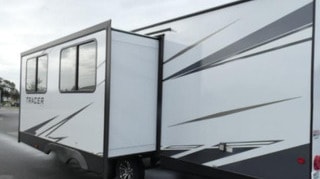
If you’re shopping for an ultra-lightweight camper, you need to consider more than just construction type.
- Does the camper have motorized slide-outs? A slide-out can add 500-800 pounds of weight!
- Does the camper have dual axles? A dual axle can add another 200-300 pounds of weight – but honestly, I’d still recommend a dual- over a single-axle. They are much safer to tow and easier to back up.
Do Ultra Lightweight Campers Actually Weigh Less?
Now, this is where things get interesting!
My data showed a percentage weight difference of just 3.24% between regular and lightweight travel trailer models.
That’s so small, it’s negligible. That could easily just be errors in my sampling.
However! – don’t go yet! —
Then I compared average weights within manufacturers. I wanted to know how much “lighter” were their lightweight models compared to their regular models?
And the results are all over the place!
Between the Jayco Flight and Feather lines, the Feather is a whopping 15% lighter! That’s fantastic!
But when I compared the Starcraft Autumn Ridge to their Super Lite lineup, the Superlight is almost 11% heavier!
What’s going on here?!
Rules for Comparing Lightweight Campers
1) compare similar construction types.
First of all, you need to compare apples to apples. Stick within the same product type. Don’t expect to compare lightweight stick n’ tin aluminum-sided camper with a vacuum-bonded
2) Compare Similar Price Points
As I mentioned earlier, luxury features can easily throw off weight comparisons. Only compare models within 10-15% of each other’s price points.
3) Compare Similar Sizes
It may sound silly, but if you’re comparing weights, don’t compare an agile 24-ft camper to a 38-feet bunkhouse behemoth!
In fact, for the best accuracy, check the widths and heights as well. Travel trailers can be as narrow as 7 feet and as wide as 8 feet, 6 inches. Height can also vary.
Camper Weight Chart Results
Now for the good stuff! Here’s the chart of my results after analysis.
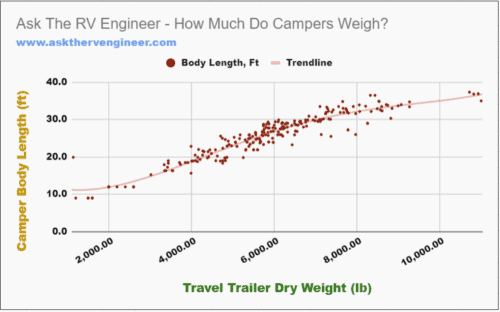
1) As Camper Length Increases, Weight Penalty Decreases
If you’ve ever stepped in a camper, this makes intuitive sense. Small campers pack a lot of stuff in a small space! Destination glampers, meanwhile, offer lots of open space.
2) Common travel trailers weigh 4,000 – 8,000 lbs
As you can see, the dot clusters become sparse after 8,000 lbs and before 4,000 lbs.
You don’t find much heavier than 8,000 lbs for a pretty simple reason: Hardly anyone can tow them! The only trucks big enough to tow a 10,000-lb travel trailer are also big enough to tow a goose-neck or fifth-wheel camper, which are vastly preferable at that weight.
Also, most travel trailers have dual axles. Turns out, suspension axle configurations capable of carrying more than 5,000 lbs are exponentially more expensive.
If you’re shopping for a camper that weighs under 4,000 lbs, don’t despair! Actually, Most major manufacturers offer short, lightweight campers. They just aren’t offered in as many floorplans.
Plus, here are some ultra-light miniature travel trailer manufacturers.
- Molded Fiberglass: Casita, Scamp, InTech
- Oversized Teardrops: NuCamp, Little Guy, Forest River R-Pod
- Adventure Travel Trailers: Flagstaff, Winnebago,
Outside of the travel trailer world, there are pop-ups, teardrop trailers, and other fun-sized towable campers.
3) Rule of Thumb: Camper Size +/- Four Feet
For a set weight of travel trailer, you can go up or down about 2-4 feet from average.
That might sound a little confusing. Here’s an example.
The average 6,000-pound camper trailer is about 28 feet long. You can see this on the graph.
Now, see those outlier dots? That tells you that a “lightweight” 6,000-lb trailer might be as long as 32 feet, and a “heavy-duty” 6,000-lb trailer might be as short as 24 feet. But you’re not likely to find a 38-ft or 22-ft camper that weighs 6,000 lbs.
Do I Need a Bigger Truck to Tow My Camper?
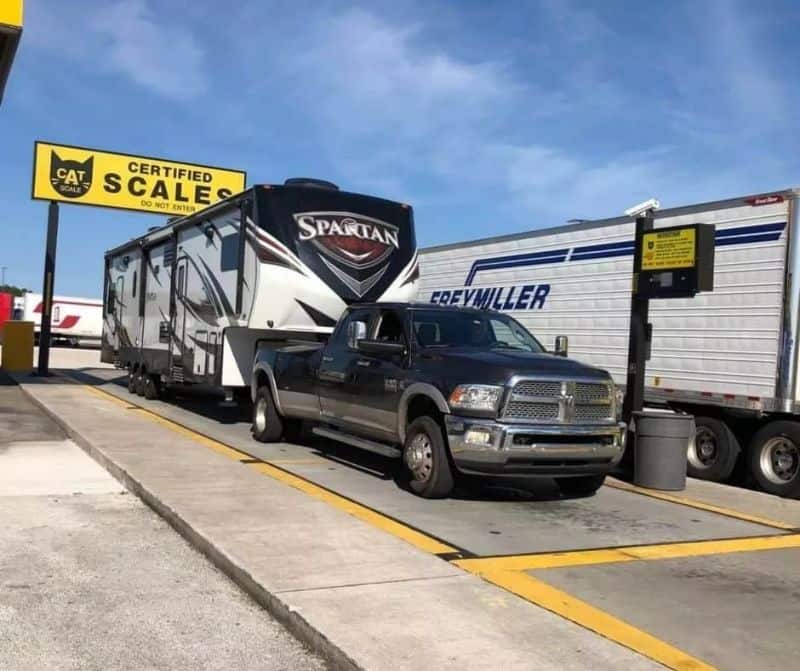
So, after all this math, what are we left with?
After all, I’m guessing you’re interested in camper weight so you can choose the right size of truck. I dive deep into this question in this article.
For now, a simple back-of-the-envelope equation is that a typical half-ton pickup truck capable of towing 7,500 lbs can tow a camper 24 feet or less.
If your camper is longer than 24 feet, you’ll probably need a three-quarter or one-ton truck.
Now, this is a rough-around-the-edges rule! It’s sufficient for walking around a dealership lot, not for actually purchasing a camper!
To get started, look at the VIN sticker on the inside of the door jamb. It will tell you the vehicle’s maximum tow rating as specified by the manufacturer.
You don’t want to max out your truck tow rating!
- You’ll risk burning out the transmission, especially on long, steep grades.
- You might wear out the rear suspension, especially if it’s a coil spring setup.
- You won’t be able to tow your camper at traffic speeds on steep grades and at high elevations. Then everybody will hate you and call you mean names as they pass you.
There’s an old rule for towing called the “80 Rule.” In other words, your actual camper weight should be 80% or less of your maximum towing capacity.
Again, for most of you, this rating is too generous. Rough terrain, high elevation, and even the condition of your truck will reduce your effective towing capacity.
Leave a Reply Cancel reply
Your email address will not be published. Required fields are marked *
Website Disabled
- Ebook/Downloads
- Madison, AL
- Huntsville, AL
- Merrimack, NH
- Kingston, NH
- Raynham, MA
- Louisville, KY
- Pittsburgh, PA
- Philadelphia, PA
- Fredericksburg, VA
- Mocksville, NC
- Kings Mountain, NC
- Raleigh, NC
- Myrtle Beach, SC
- Acworth, GA
- Jacksonville, FL
- Leesburg, FL
- Jacksonville North, Fl
- Richmond Hill, GA
- St. Augustine, FL
- Preowned RVs
- Blowout RVs
- Shop Online Parts
6 Best Bunkhouse Travel Trailers Under 35 Feet
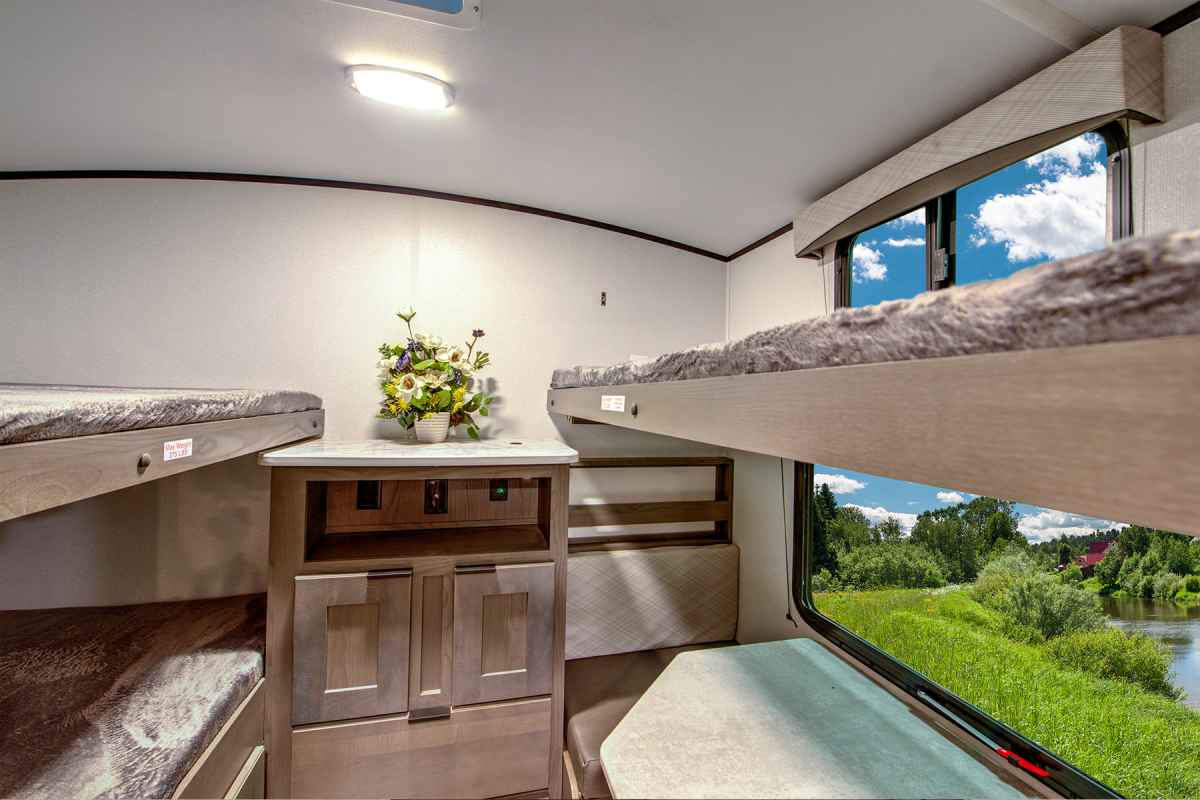
Looking for the perfect small travel trailer that sleeps lots of people? Bunkhouse travel trailers under 35 feet are a great choice for families and groups because of the additional sleeping space and size of the trailer. A travel trailer under 35 feet can fit in a majority of campsites and is easier to maneuver than other large trailers.
In this blog article, we review a wide variety of bunkhouse travel trailers for families that have a small tow vehicle to larger tow vehicles and everything in between, so you can find the right RV for you.
What is a Bunkhouse Travel Trailer?
A bunkhouse travel trailer is a type of towable RV with an extra bedroom with bunks. The bunkhouse offers another private sleeping space so families can have privacy and space from each other at night, unlike some travel trailers where the bunks or additional sleeping spaces are a part of the common area.
Depending on the floor plan, a bunkhouse can include sleeper sofas, desks, a dresser and additional storage space and features.
Bunkhouse travel trailers are an excellent choice for camping families as there is an additional room for kids to have their own space as well.
How Much Does a Bunkhouse Travel Trailer Cost?
The cost of a bunkhouse travel trailer depends on several things: Size, brand, features, siding and more are all something to take into account when considering the cost of one of these RVs. The average price starts at around $30,000.
Aluminum vs Fiberglass Travel Trailers
When deciding on an RV, the frame material of the camper is something to consider. Towable RVs come with either aluminum or fiberglass siding. The aluminum RV typically has ridges while fiberglass campers have smooth siding.
Aluminum trailers are cheaper because of the material and if there is any damage, it is easier to fix and replace just a shingle compared to a whole side. Aluminum campers also tend to have layers on the siding with a wood frame, fiberglass insulation and dead air space under the outer, aluminum frame. The extra insulation adds an additional layer of warmth over other RV types.
Fiberglass sidings are much easier to maintain and keep clean because of the smooth siding and hold a much better resale value because of this. Another benefit to fiberglass campers is that it is typically more lightweight and aerodynamic. This creates a better gas mileage for the tow vehicle and saves campers money.
Cruiser Embrace EL280
Grand design transcend xplor 265bh, winnebago micro minnie 2306bhs, coachmen freedom express liberty edition 292bhdsle, forest river cherokee grey wolf 23dbh, keystone springdale 298bh.
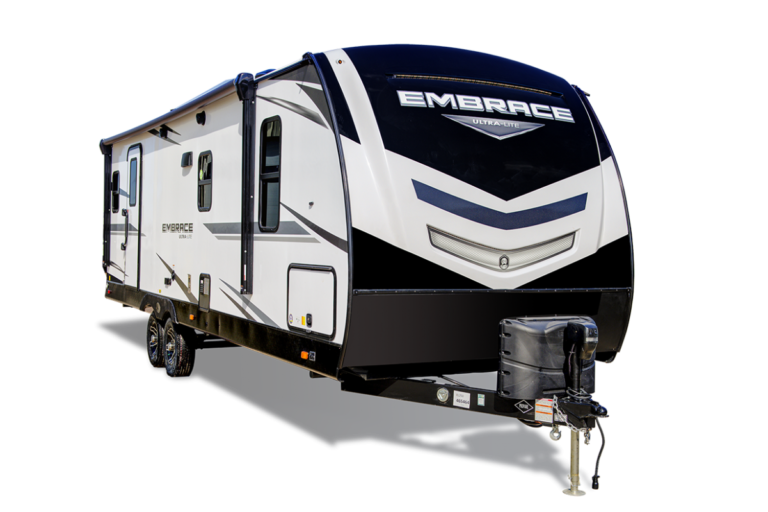
MSRP starts at $50,184
The Cruiser Embrace EL280 is a 33”4” long travel trailer that can sleep nine people. It has a dry weight of 6,716 pounds and a gross vehicle weight rating of 9,666 pounds. There is a private main bedroom at the front of the RV, a bunkhouse in the back and a common living space. The Embrace is a laminate trailer.
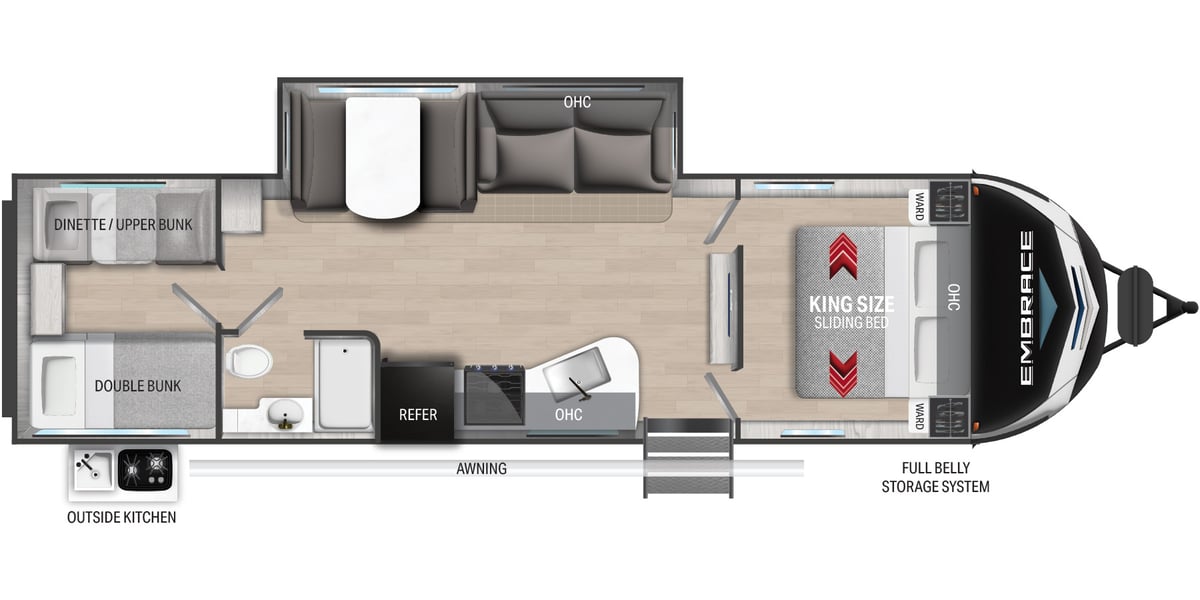
The living space features a kitchen, booth dinette and a tri-fold sofa, perfect for extra campers. The private bedroom has a king-size bed, a hanging wardrobe on either side and overhead cabinets. The bunkhouse offers three sleep areas with a double bunk and an upper bunk above a small dinette. Plus it has a dresser for extra storage.
>> Shop the Cruiser Embrace here .
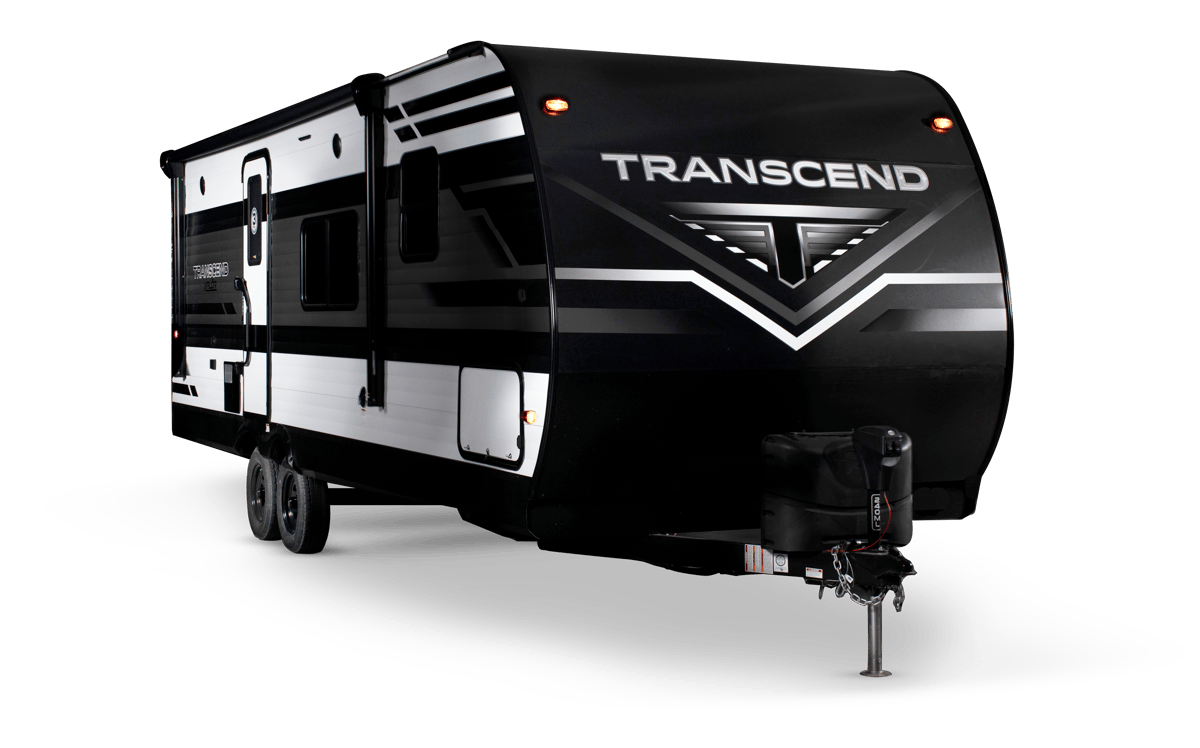
MSRP starts at $36,739
The Grand Design Transcend Xplor 265BH is 32’9” in length and offers families a small double-over double bunk area in the back of the camper. There is a dry weight of 6,327 pounds and a gross vehicle weight rating of 7,995 pounds. There are a hanging wardrobe space and storage steps by the double bunks as well for additional storage. The Transcend is Grand Design's aluminum siding travel trailer.
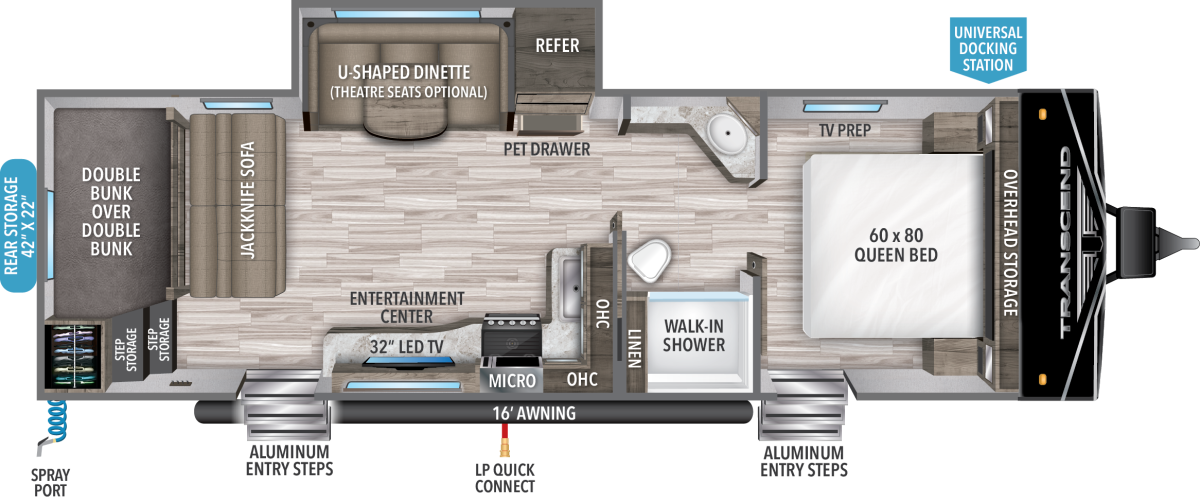
The living room has a 32” LED TV on the entertainment center, a jackknife sofa, and a large u-shaped dinette you can fit the whole family around. The full bathroom has a large walk-in shower as well as plenty of counter space as well. The main private bedroom in the front of the RV offers a queen bed, overhead storage, TV prep and a private entry. The bunkhouse on this particular brand is a little modified and is closed off by the sofa and a step up with the side closest to provide privacy.
>> Ready to find the right Transcend Xplor? Shop now !
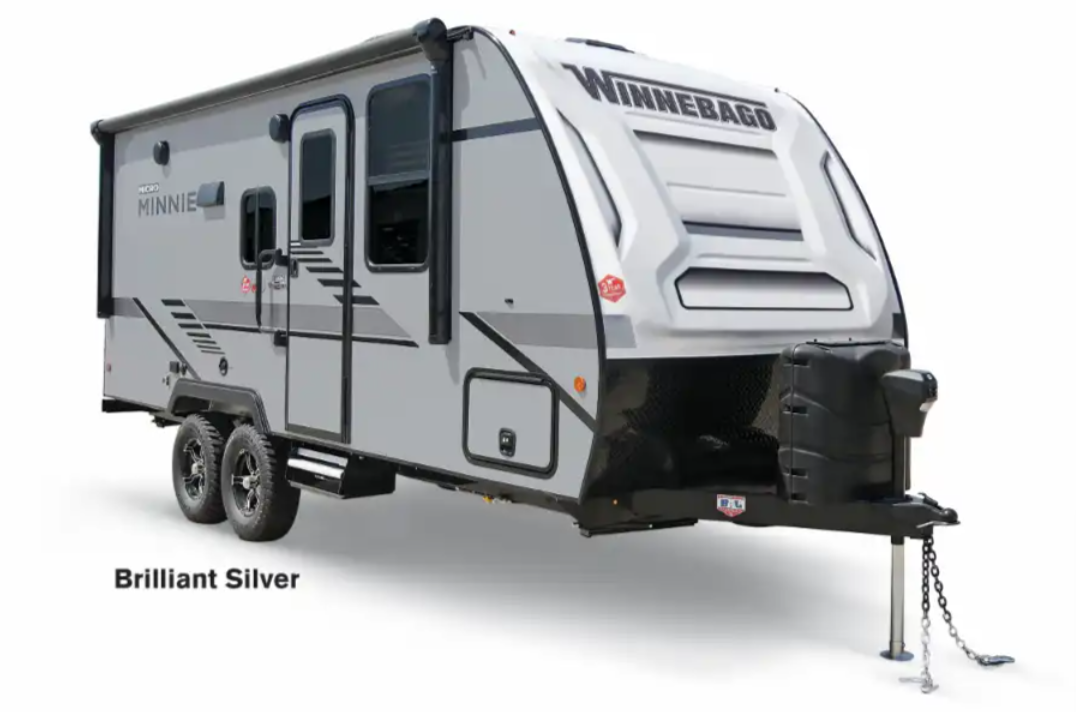
MSRP starts at $41,461
The Winnebago Micro Minnie 2306BHS is a compact and lightweight travel trailer at 25’5” long and a gross vehicle weight rating of 6,000 pounds and a dry weight of 4,668 pounds.
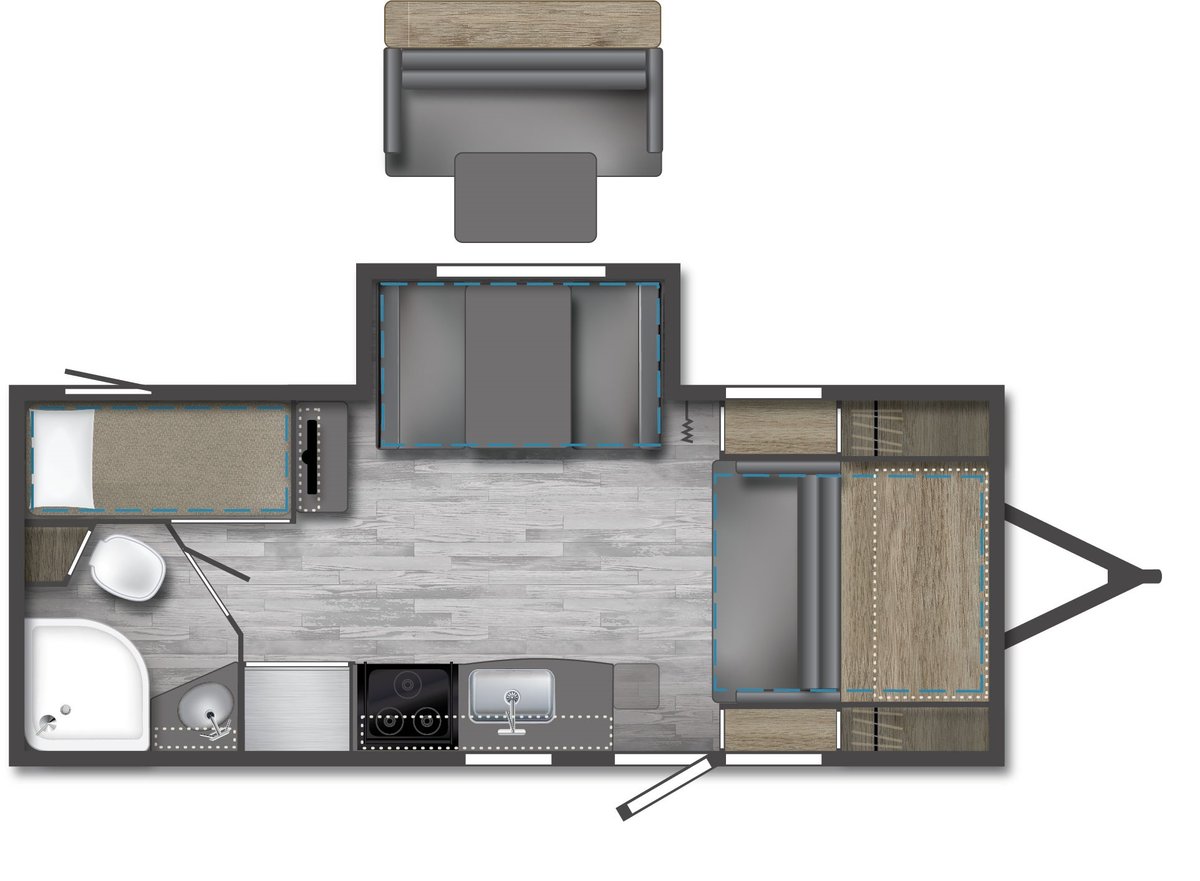
It has a galley kitchen with a flip-up countertop for extra food prep space. There is a booth dinette, TV, pantry and a sofa with a fold-down murphy bed. The spacious bathroom features a linen closet and a walk-in shower. There are bunk beds in the back of the RV, making the Micro Minnie a great option for small families who have a small tow vehicle and still want to make unforgettable memories.
>> Shop available units here .
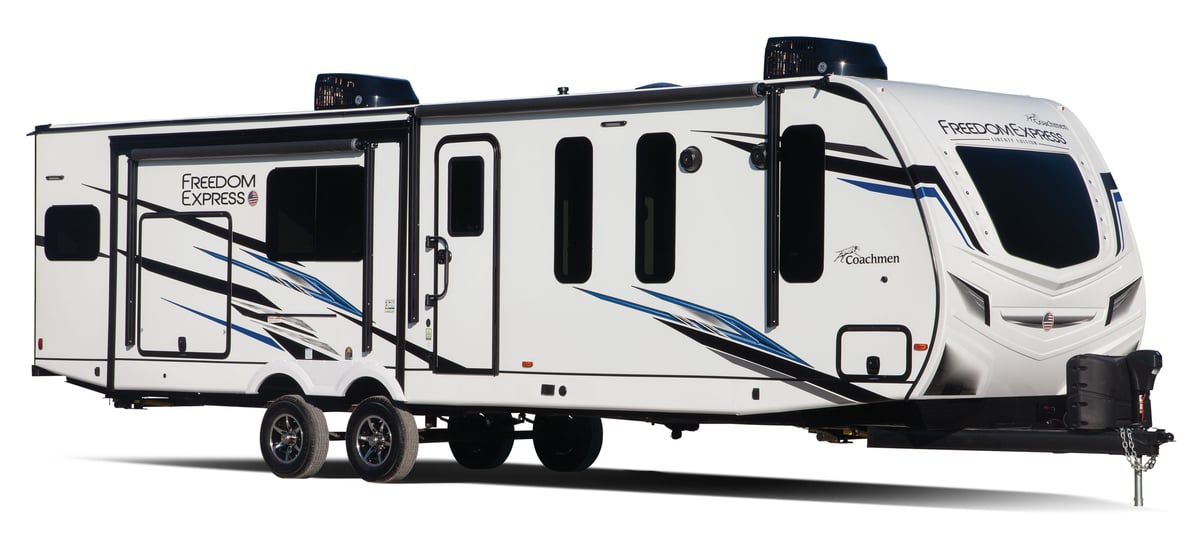
MSRP starts at $54,595
The 33’4” long Coachmen Freedom Express Liberty Edition 292BHDSLE is a great RV for outdoor lovers. The exterior of the camper comes with an 18’ awning and a full camp kitchen, making it the perfect place for outdoor cookouts at the campground. The Freedom Express is a laminate siding travel trailer and has a dry weight of 7,058 pounds and a gross vehicle weight rating of 9,500 pounds.
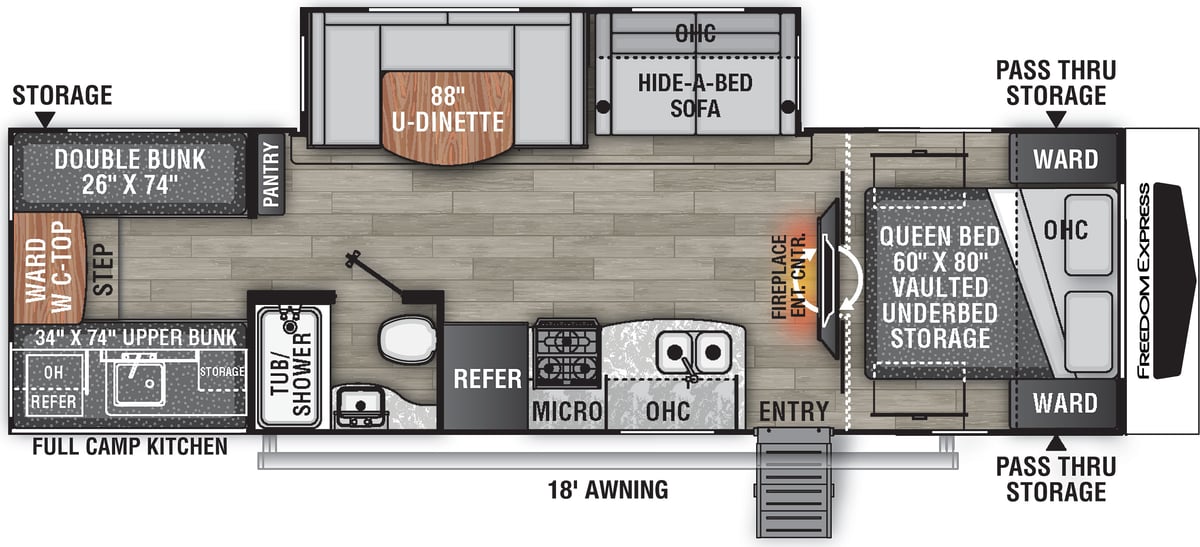
The interior of this model offers even more features including a fireplace entertainment center, 88” u-shaped dinette and a full bathroom with a tub/shower. There is a bunkhouse in the back with a double bunk and upper bunk, which adds sleeping space for three people. There is also a wardrobe storage space as well.
>> Start shopping now for a Freedom Express !
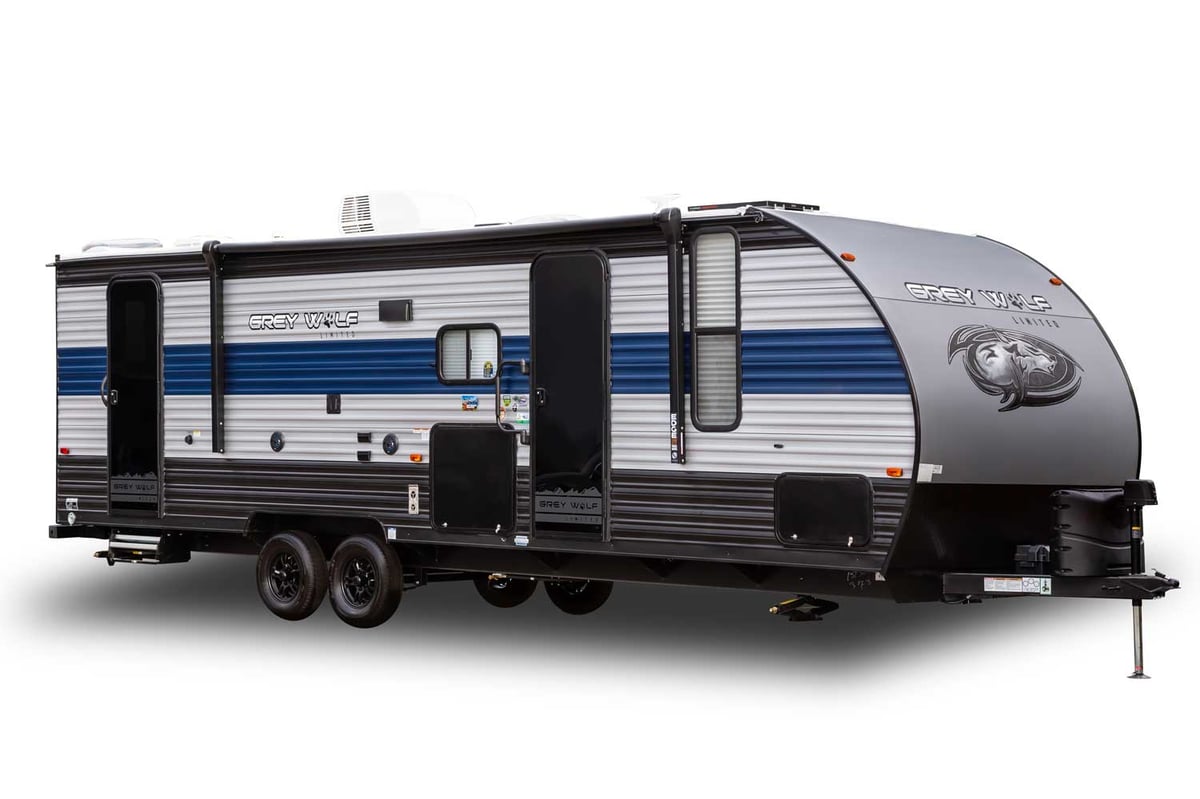
MSRP starts at $34,569
The Forest River Cherokee Grey Wolf 23DBH has plenty of features that make for the perfect home on wheels. It is 29’3” in length with a dry weight of 5,380 pounds and a gross vehicle weight rating of 7,621 pounds and. The freshwater capacity is 48 gallons, gray water is 38 gallons and black water is 28 gallons.
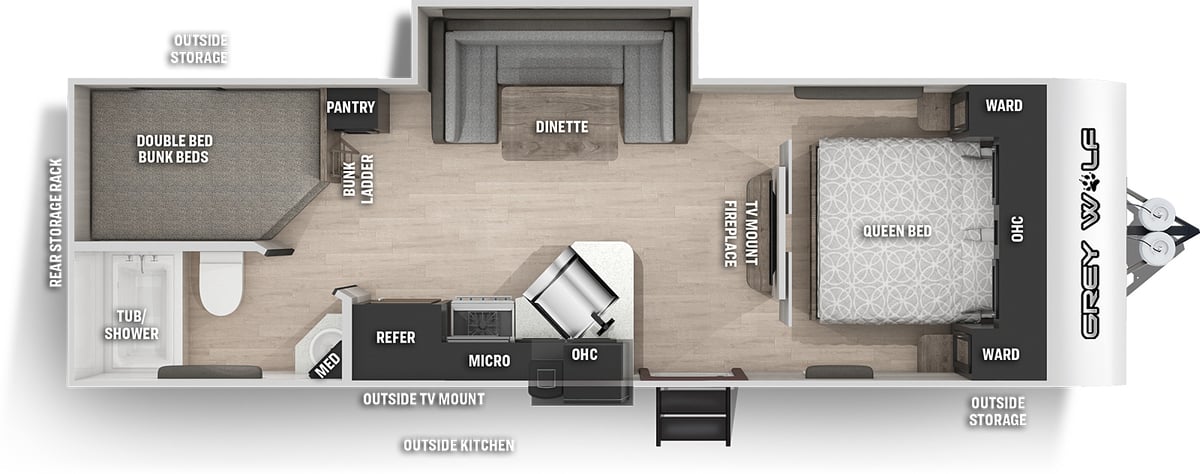
When you first step into the Cherokee Grey Wolf, there is a main private bedroom to the right with a queen bed and lots of storage. The common area has a fireplace with TV mount, pantry, and a full kitchen set up with a dinette. There is a full bathroom in the back as well as double bed bunk beds with a bunk ladder.
>> Shop this model and similar models here .
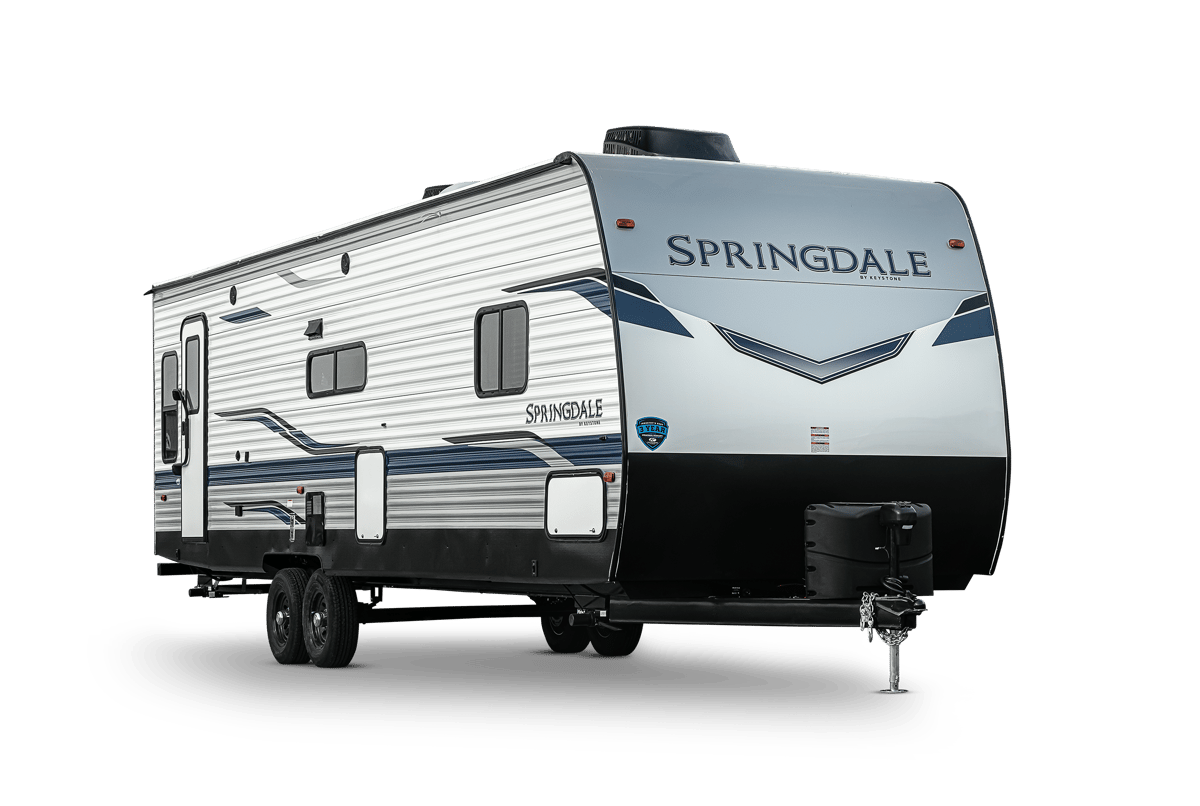
MSRP starts at $32,582
The Keystone Springdale 298BH is a 32’8” long travel trailer with enough room to sleep up to ten people comfortably. There is a private front bedroom, bunkhouse in the back and a comfortable sofa to provide extra sleeping space, making it perfect for large groups.
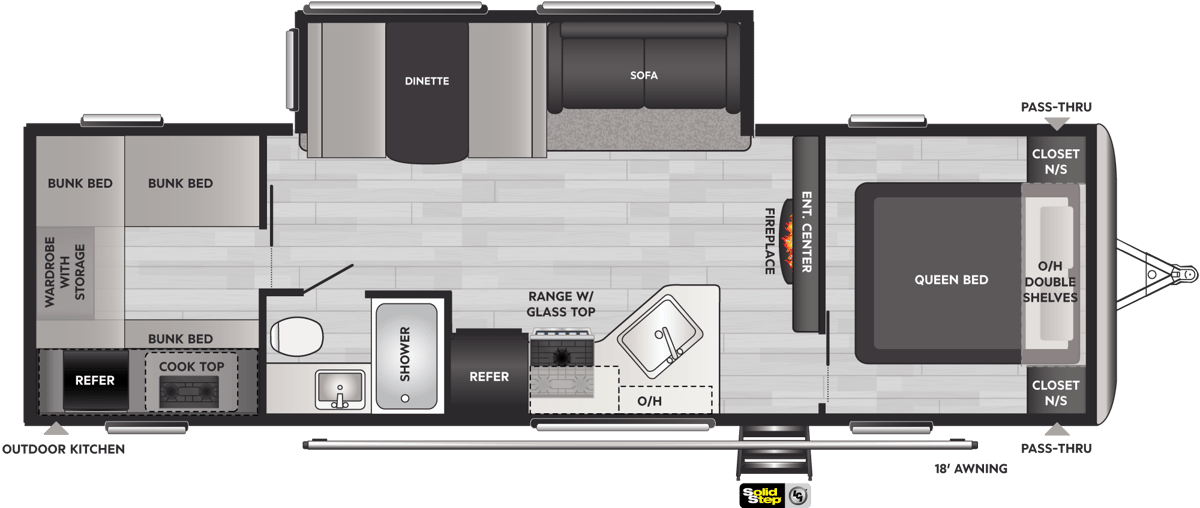
There is a dry weight of 6,720 pounds and a gross vehicle weight rating of 9,480 pounds. Other features include an electric fireplace, laundry chute, high rise spring pull out kitchen faucet and more. The Springdale is ready for any adventure.
>> Browse available Springdale units here .
Traveling with families or large groups is easy with small bunkhouse travel trailers. The bunkhouse provides extra sleeping space for multiple people and a smaller trailer under 35 feet is easier to maneuver and find campsites. These units offer something different so every type of camper can find their dream RV.
Additional Resources:
Looking for two bedroom travel trailers? Check out the best floor plans here .
Learn more about the Best Travel Trailers for Families and start making memories!
Tags: RV Shopping , Travel Trailer , Bunkhouse

Subscribe To The Blog
Recent posts, posts by tag.
- RV Lifestyle (186)
- RV Shopping (152)
- Travel (67)
- RV Maintenance (50)
- Company News (43)
- Motorhomes (37)
- Travel Trailer (32)
- Fifth Wheels (21)
- All Things RV Podcast (19)
- Class B (17)
- Class C (11)
- Toy Hauler (10)
- Class A (8)
- Bunkhouse (4)
- Pop-ups (4)
- Boondocking (3)
- Super C (2)
- Haunted Campground (1)
the campers choice
Home About Us our mission Customer care Testimonials Canadian Buyers Corporate News Employment
Louisville, Ky Kingston, NH Merrimack, NH Raynham, MA Union, CT Philadelphia, PA Bismarck, ND Minot, ND Fredericksburg, VA Mocksville, NC Kings Mountain, NC Raleigh, NC Myrtle Beach, SC Charleston, SC Conway, SC Pittsburgh, PA Huntsville-Madison, AL Acworth, GA Atlanta, GA Macon, GA Richmond Hill, GA Jacksonville, FL JACKSONVILLE SOUTH, FL Leesburg, FL Ocala, FL
new rvs Pre-Owned RVS Blow-Out RVs Parts Service TOW Guides
financing & insurance
Financing Extended Service Plans tire & road hazard Gap Protection ECORVPRO
Blog E-books Video Library Events
Copyright © 2018 Campers Inn • Sold RVs • Privacy Policy Powered by: Interact RV - Website Marketing, Design and Development


RV Zone is reader-supported. When you buy through links on our site, we may earn an affiliate commission. Learn more
How Much Does an RV Weigh? (With 11 Examples)

Writen by Tom Hank

Fact checked by Joseph Varney

Knowing the weight of an RV can help camper and motorhome owners prevent different issues. For instance, RV owners can purchase and drive the correct camper based on their licenses’ restrictions. But how much does an RV weigh?
The average RV weight often depends on the class. For instance, a camper’s weight can be within the range of 16,000 to 30,000 pounds if it is a Class A motorhome. However, Class B travel trailer weight can be within the 6,000 to 11,000-lb range.
Take note that these figures denote RV dry weights. Also, Class C RVs possess a different weight range than Class A and B variants. Keep reading to know more about how much a motorhome weigh and take a look at some examples per RV class.
Table of Contents
What Is the Difference Between Dry Weight vs. Gross Vehicle Weight?

An interested camper vehicle buyer may look at an RV weight chart and see dry weight and gross vehicle weight (GVW). Despite the presence of the word ‘weight’ in both terms, they are different.
1. Gross Vehicle Weight
Denoted as the weight of a fully-loaded motorhome or travel trailer, the GVW often signifies the inclusion of the different items carried by a specific RV. These objects may include (but aren’t limited to) cargo, passengers, and the driver.
Take note that the GVW is only an approximation. It provides RV users with the potential weight of their vehicles to know how much load they can carry.
2. Dry Weight
Unlike the GVW, the dry weight represents the actual weight of the motorhome or travel trailer without the additional load. However, RV manufacturers often include the batteries, generators, and other ordered equipment in this measurement.
What Is The Largest Motorhome You Can Drive on a Car License?
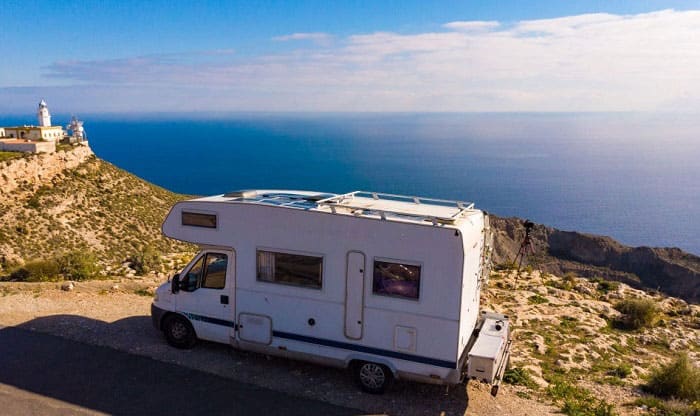
Motorhome drivers operating motorhomes beyond a weight limit mandated by certain states may need a special license. Take note of the following examples of states and the requirements in their regions:
- California: Class B license for vehicles over 26,000 pounds.
- Nevada: Class B license for over 26,000 pounds.
- New York: For a vehicle weight of 26,000 pounds, owners should acquire a Recreational (R) endorsement for vehicles.
- South Carolina: Class E licenses needed for owning and driving vehicles over 26,000 pounds.
Moreover, some states require RV drivers to declare if they are using their vehicles for commercial or non-commercial use. Additionally, some states, such as Georgia and Idaho, do not require motorhome drivers to possess special licenses for their vehicles.
How Much Does a Class A Camper Weigh ?
Many Class A RVs fall within the weight range of 16,000 to 30,000 pounds. Some of these campers may look like 5 th wheels. However, the weight of 5 th wheel camper is different since many RVs in this category fall within the 12,000 to 15,000 range.
Here is a list of some Class A motorhomes and the details on their weights for your review:
1. 2022 Newmar Dutch Star
The GVW of this vehicle ranges from 40,000 to 51,000 pounds, depending on its floor plan. Interested buyers can choose among 11 different floor plans, including the 3709, 3717, and 4369.
Those who wish to purchase this camping vehicle for their trips can enjoy a host of different entertainment features. Some of the standard elements that are available in all floor plans include two bedroom speakers, a satellite dish prep, and two TVs.
Take a tour of this Class A RV by watching the video below:
2. 2022 Entegra Aspire
This Class A vehicle’s standard floor plan has a GVW of 41,000 pounds and a gross combined weight (GCW) of 51,000 pounds. However, purchasers may opt for the higher-tiered floor plan, which has a 49,000-pound GVW and a 64,000-pound GCW.
Like other RV makers, Entrega equipped their 2022 Aspire model with many comfort and entertainment features. The standard elements included in all 2022 Aspire options include a Blu-ray player, two TVs, and LED interior lighting.
You can also take a detailed look at this motorhome by checking out the video below:
3. 2022 Tiffin Allegro Bus
With a GVW of 41,000 to 51,000 pounds, this Class A camper is one of the roomier options on the market. It provides different amenities and features that are both functional and family-friendly.
Drivers of this vehicle will enjoy a 450 HP engine, adaptive cruise control, and an elevated rail chassis. As for the passengers, they can experience and enjoy features like a king-sized bed, interior and exterior TVs, and a residential refrigerator.
Find out more about the 2022 Allegro Bus by watching this video:
4. 2021 Forest River FR3
The FR3 is one of the smaller Class A vehicles you can find. With its GVW of 18,000 for the base floor plan, many users can drive this RV in different states without the need for special licenses.
Despite its relatively compact and lightweight construction, the 2021 FR3 still offers many comfort- and entertainment-focused features. These aspects include rubber entry steps, vinyl flooring, and three LED TVs.
Check out the video below to learn more about the 2021 Forest River FR3:
5. 2022 Holiday Rambler Navigator
This Class A RV offers different top-of-the-line features packed into its fairly reasonably 33,000 GVW. Expect this vehicle to come with amenities like power cockpit blinds, dual roof air conditioner vents, and a fireplace.
How Much Does a Class B RV Weigh?
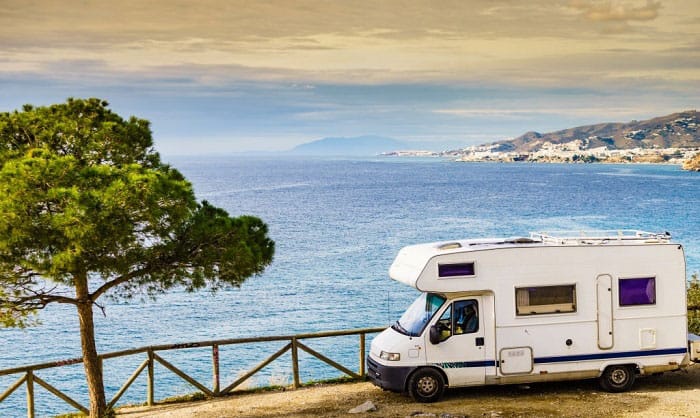
Class B RVs often fall within the weight range of 6,000 to 11,000 pounds. These options typically have similar chassis and weights. However, different manufacturers will present buyers with varying floor plan options to promote versatility.
Continue reading to know some Class B motorhomes, their weights, and some of their built-in features:
1. 2022 Winnebago Solis
It might be reasonably easy to assume that the 2022 Solis cannot handle a significant amount of weight because of its fairly compact looks. But this 11,000 to 12,000-pound GVCW Class B RV comes with many features fit for different campers.
For instance, users of this motorhome can enjoy a 220-watt solar battery system that charges from a pop-up roof unit. Moreover, there are two exterior wash stations and a cassette toilet for convenient bathroom access during outdoor camping sessions.
Watch the video below to view and compare the different 2022 Winnebago Solis floor plans:
2. 2021 Mercedes Benz Metris Getaway Van
Despite having ‘van’ in its name, this Class B motorhome has a GVW rating of about 6,400 pounds. It is one of the smaller RVs in its class, which can make it a good choice for solo or couple campers.
Inside, users can enjoy a sleeping area for two people. This location also has USB charging ports for your devices. Moreover, the front seats can rotate 180 degrees, providing additional space if needed.
Other features to note are light and rain sensors and air conditioning. Notable exterior features are also available, such as automatic lights for compartment doors and optional roof racks.
Click on the video below to get to know this vehicle better:
3. 2022 Pleasure-Way Tofino
With a GVW of 8,550 pounds and a GCW of 11,500 pounds, the 2022 Tofino offers comfort and sport features in one Class B motorhome. Interested RV buyers may also like its minimalist contemporary design.
This vehicle’s cabin provides comfort-focused features, despite its reasonably compact construction. For instance, it has a queen-sized bed, zippered vents, and an induction stove.
The video below gives you a quick tour of this Class B RV:
How Much Does a Class C RV Weigh?
Class C RVs generally weigh about 10,000 to 12,000 pounds. This heft also usually comes with designs similar to moving trucks or vans. Moreover, Class C vehicles often have closer resemblances to vans compared with Class A’s bus-like looks.
Here are some examples of Class C RVs, their weight ratings, and other notable features:
1. 2022 Tiburon Luxury Sprinter
This 2022 Class C RV has a GVW of 11,030 pounds with a powerful towing hitch capacity of 5,000 pounds. Drivers can take advantage of the multimedia console on the dashboard, which can also connect to a smartphone via Bluetooth.
As for the passengers, a bunk sleeping area is available. Children can reach the top bunk by extending the bunk ladder. Furthermore, a living room TV is ready to provide additional entertainment.
Learn more about this Class C motorhome by watching the video below:
2. 2021 Jayco Greyhawk Prestige
This Class C motorhome is among the heaviest of its class with its GVW of 14,500 pounds. However, users can take advantage of more amenities and features that a typical Class C camper may not have.
Its heftiness carries elements like automatic hydraulic leveling jacks, a panoramic window with power shade, and an infotainment center. Three TVs are also in the living, bedroom, and exterior areas.
Take a quick tour of the 2021 Jayco Greyhawk Prestige by watching the video below:
3. 2022 Tiffin Wayfarer
The 2022 Tiffin Wayfarer has a GVW of 11,030 pounds, which puts it in the average weight range of Class C RVs. This 188 hp motorhome offers many things that RVers would want in a Class C motorhome.
One feature that drivers of this vehicle may like is the adaptive electronic stability. With it, the camper balances and stabilizes during drives to prevent unnecessary movements like rocking and swaying.
If you want to learn more about the 2022 Wayfarer, watch the video below:
How Much Weight Can a Camper Tow?
RV owners can use an online vehicle towing capacity calculator to verify the amount of weight their campers can tow. You can also take a look at the list below to find rough estimates on different campers’ towing capacities:
- RVs over 8,000 pounds: 1,000 pounds
- RVs under 8,000 pounds: 750 pounds
- RVs under 5,000 pounds: 500 pounds
Expect that the results given by the online calculator are also an estimation. You should also consider other factors, such as the vehicle’s cargo weight, hitch or tongue weight, and payload capacity.
It is advisable to know how much does an RV weigh to avoid paying expensive fines. Take note that some state governments impose strict rules regarding vehicle weight limits.
Here is a short list of things to do to ensure you are going to purchase and use the right motorhome or travel trailer:
- Identify your needs for your camping adventures.
- Ensure that the RV you choose can handle the weight of interior appliances, electronics, and other objects.
- Check with state authorities to know if driving your motorhome requires a special license

Hi, I am Joseph. Carpe diem! Seize the day! That’s always been my life motto. If you haven’t seen some of the most beautiful places in the country, you are missing out on incredible adventures.

COMMENTS
On an average a 16 feet length travel trailer will have a unloaded weight of around 2200 lbs to around 3400 lbs. A 30 feet travel trailer can weigh around 7000 lbs to 7800 lbs. This may however, be not true for all makes and brands, it will always vary. But, on an average you will find the numbers to be very close.
In general, the camper will weigh about 250 pounds per foot of trailer length, although it can vary depending on the size of the camper and the type of gear you pack. This total is known as the gross trailer weight, or GTW for short. To make this concept easier to grasp, here's a guide that uses some of the most popular trailer lengths as ...
Quick question I have a 1970 thunderbird travel trailer 12 ft 2 wheel wondering if you had a idea what the gvwr was. ... Travel trailer is dry weight of 6440. We dont carry water in tank. ... For example, assume that you have a 35 gallon water tank and you have dual 20-lb propane tanks. You save weight by not bringing any water with you and ...
The average large Travel Trailer (>25 feet) weighs 6300 lbs (2858 kg) and can be towed by larger SUV's and 1/2 ton pickup trucks. The average small Fifth Wheel (<35 feet) weighs 9000 lbs (4082 kg) and would need a 3/4 ton truck once loaded. The average large Fifth Wheel (>35 feet) weighs 12000 lbs (5443 kg) and would need a heavy 3/4 ton or ...
1,545 Lbs (Unloaded Vehicle Weight) - 13 Feet - 2019 10RK Hummingbird Trailer. 2,860 Lbs (Batteries and LPs Included) - 16 Feet - 2018 Sport 16RB Trailer. 2,980 Lbs (Unloaded Vehicle Weight) - 19 Feet 10 Inches - 2019 17RK Hummingbird Trailer. 3321 Lbs - (Shipped Weight) - 21 Feet 5 Inches - Keystone 175 LHS Single Axle Trailer.
A horse trailer designed to transport one or two horses typically weighs between 2,300 and 3,900 pounds. With horses and cargo loaded, this number increases. The average empty weight of a horse trailer is about 2,900 pounds. When loaded up, small horse trailers max out at 7,000 or 8,000 pounds (GVWR).
Average Camper Weight. We have searched the top 15 examples of popular travel trailers and found that on average, travel trailers weigh 5,215 pounds and weigh 191.43 pounds per foot of length. Different factors can cause these varying weights, but most trailers quality on this list are similar. Make/Model. Length.
Travel Trailers are typically from 12 feet to 35 feet in length and towed by means of a bumper or frame hitch attached to the towing vehicle (car, van or pick-up truck). This towable camper provides all the comforts of home and is perfectly adaptable for weekend getaways, family vacations or full timing. With high-end luxury models as well as ...
The average weight of an unladen Jayco Eagle travel trailer is 8,574 lbs. The lightest model is 7,090 lbs. and the heaviest is 10,441. Once fuel, water, and other cargo are added though, the weights can be much higher than this. Knowing the average sizes and weight specifications of these trailers are important.
2019 Forest River RV Wildwood 27REI (33-foot) - Dry weight: 7715 pounds. 2019 Forest River RV Wildwood DLX 353FLFB (39-foot) - Dry weight: 8814 pounds. X-Lite 33MLS (36-foot) - Dry weight: 8040 pounds. As you can see, the length of a camper trailer and its construction have a great impact on the overall dry weight.
So for example my 35-foot travel trailer is 38 feet bumper to hitch. It's even longer when the bike rack is on the back. When towing it with a truck it is 59 feet bumper-to-bumper. ... Another disadvantage of a longer travel trailer is the total weight. Once you get up to 30 or more feet and 7 to 8,000 pounds you will need a 3/4 ton or 1-ton ...
The average travel trailer has a dry weight of around 5,200 lbs. These weights will vary greatly based on size of the trailer, ranging from 1,200 lbs (104 lbs per foot), up to around 9,000 lbs (230 lbs per foot) for larger trailers. Gear, tank levels and other equipment will add, on average, another 500-1000 lbs to the overall trailer weight. ...
Before the travel trailer is ready to travel on the road, this is the basic structural weight. The typical dry weight of a travel trailer ranges from approximately 1,000 to 9,000 pounds, but as a rough guide, the average camper container's dry weight is around 5,200 pounds. Towed units, as contrasted to self-driving modules, will be lighter ...
The average weight of your travel trailer will vary depending on the type of trailer you have and how long it is. Larger and longer campers tend to be heavier, while teardrop and pop-up campers are on the lighter end of the scale. Most campers have an average dry (unloaded) weight of 2,550 to 6,600 pounds, and an average GVWR of 3,200 to 8,400 ...
The average weight of a travel trailer is around 5,200 lbs. But the final weight of our travel trailer will depend on a number of things. Read it all here. ... 35 and 36 ft Travel Trailer Weight. Forest River RV Flagstaff Classic Super Lite 831CLBSS — 35 ft; 8105 lbs;
An example of a vintage travel trailer weight is the 19645 Safeway. IT weights partially loaded 2,320 pounds. This is a 13-foot cabin travel trailer. You can expect a range of 150-200 pounds per foot length of the cabin only. How much does a 16 foot travel trailer weight? On average a 16-foot camper may weight 2,000 to 3,500 pounds.
Maybe you'll be able to fit five people, but it could be even less, like three or four. Larger travel trailers can weigh 5,000 to 8,700 pounds, sometimes even closer to 9,000 pounds or into 10,000-pound territory. In this weight class are the largest, longest, and most inclusive travel trailers that money can buy.
Here's the short answer: The average camper trailer weighs around 5,900 pounds and is about 26 feet long. This includes the weight of the travel trailer without any gear or filled tanks. Expect to add about 200 pounds of cargo per person and 300 pounds of fresh water. I calculated this information after surveying more than 200 travel trailers ...
The average weight of a 30-foot travel trailer is 5,800 pounds. This is a dry weight, meaning, as it comes from the manufacturer. This is the weight with all the standard equipment and tanks empty. This is only the average weight; actual weights normally vary between 4,500 pounds and 7,000 pounds depending on the make and model.
Grand Design Reflection 337RLS - 10,570 lbs., 35.6 ft. Highland Ridge Mesa Ridge MF374BHS, 12,300 lbs., 40.6 ft. ... (Gross Vehicle Weight Ratio): ... than a travel trailer. The RV can be detached from your truck upon reaching your destination, leaving you a vehicle for exploring or, when the need arises, a quick trip to the grocery store.
Winnebago Micro Minnie 2306BHS. MSRP starts at $41,461. The Winnebago Micro Minnie 2306BHS is a compact and lightweight travel trailer at 25'5" long and a gross vehicle weight rating of 6,000 pounds and a dry weight of 4,668 pounds. It has a galley kitchen with a flip-up countertop for extra food prep space. There is a booth dinette, TV ...
The average RV weight often depends on the class. For instance, a camper's weight can be within the range of 16,000 to 30,000 pounds if it is a Class A motorhome. However, Class B travel trailer weight can be within the 6,000 to 11,000-lb range. Take note that these figures denote RV dry weights.
Used 35 Travel Trailer for Sale. ... This is a 31-foot dual . Private Seller . Goode, VA . $30,000. Used 2022 Forest River T RV . ROCKWOOD MINI LITE 2516S 2516S . ... This travel trailer is 35 feet long, has an empty weight of 8,103 lbs., and a . Sauder Motors . Strasburg, PA . $26,000.